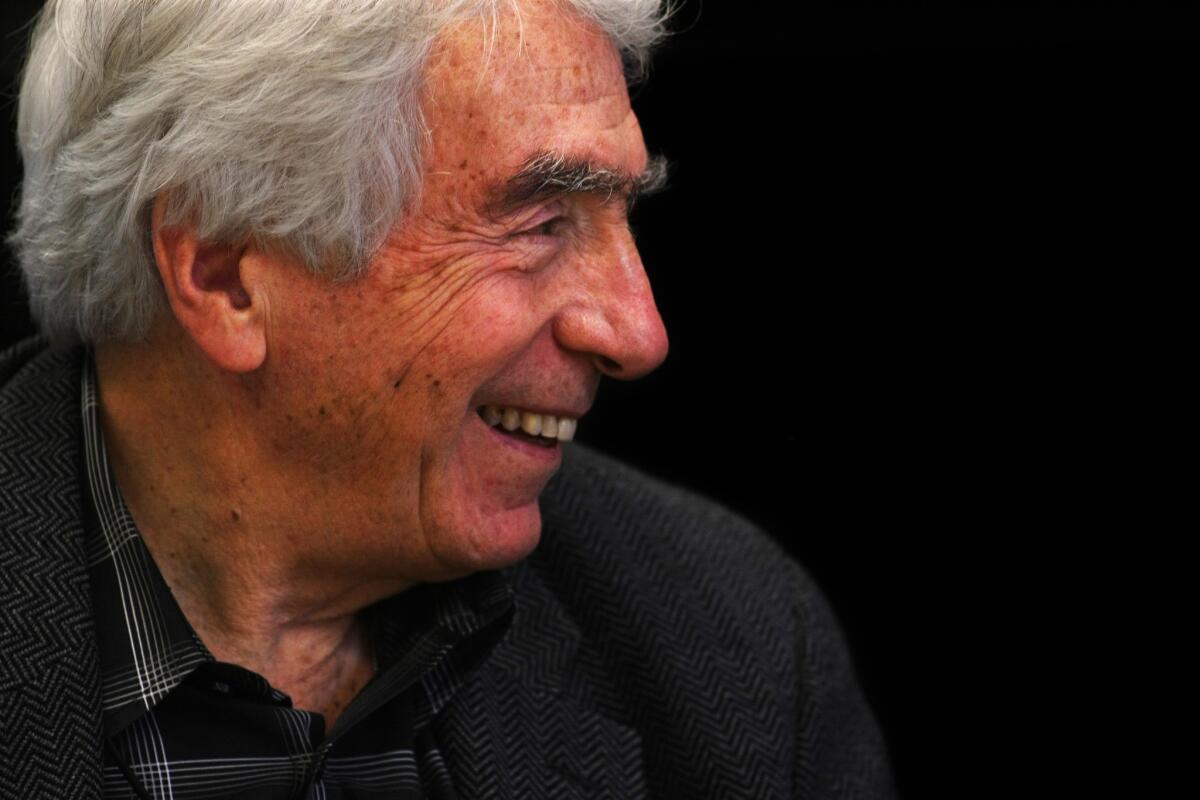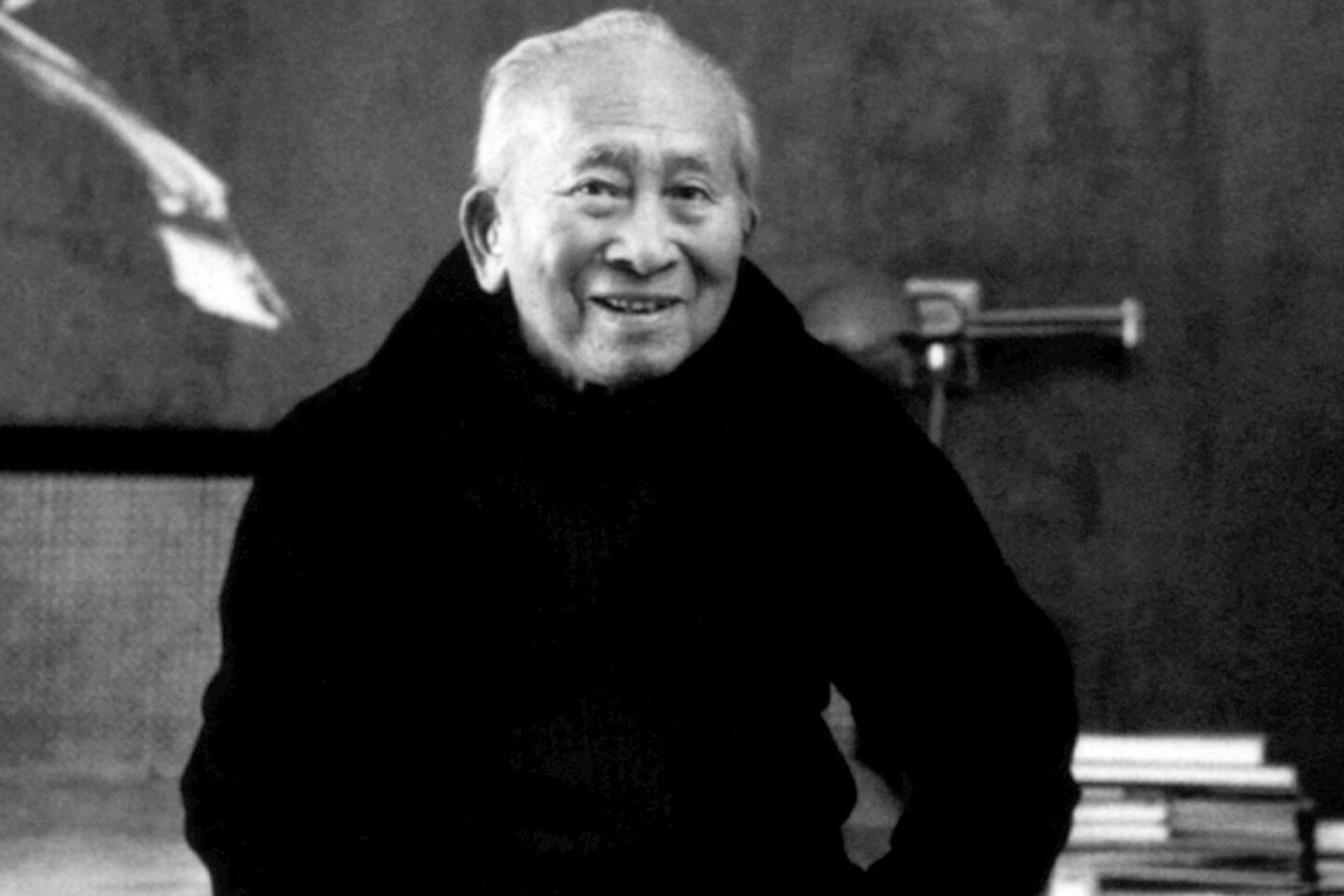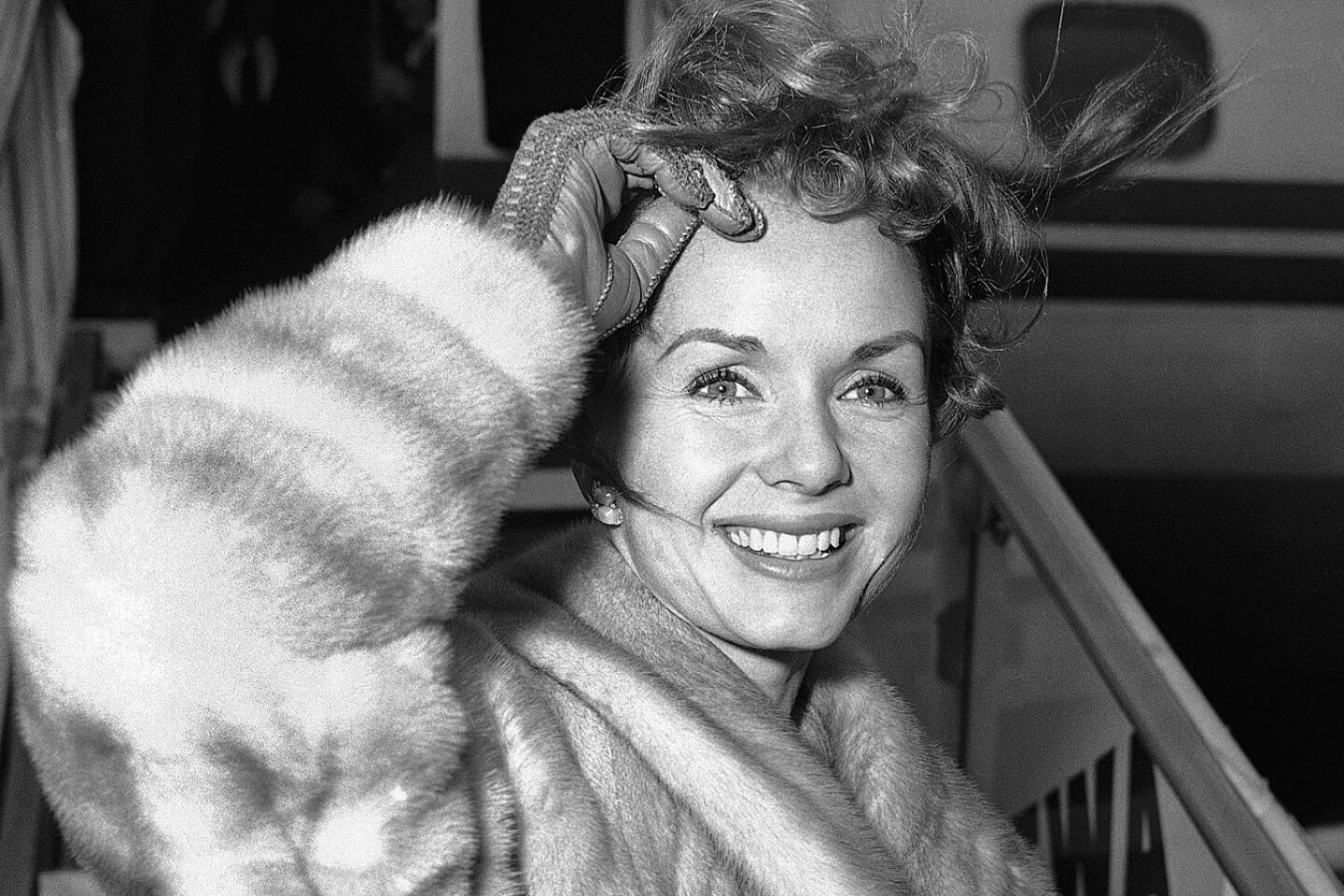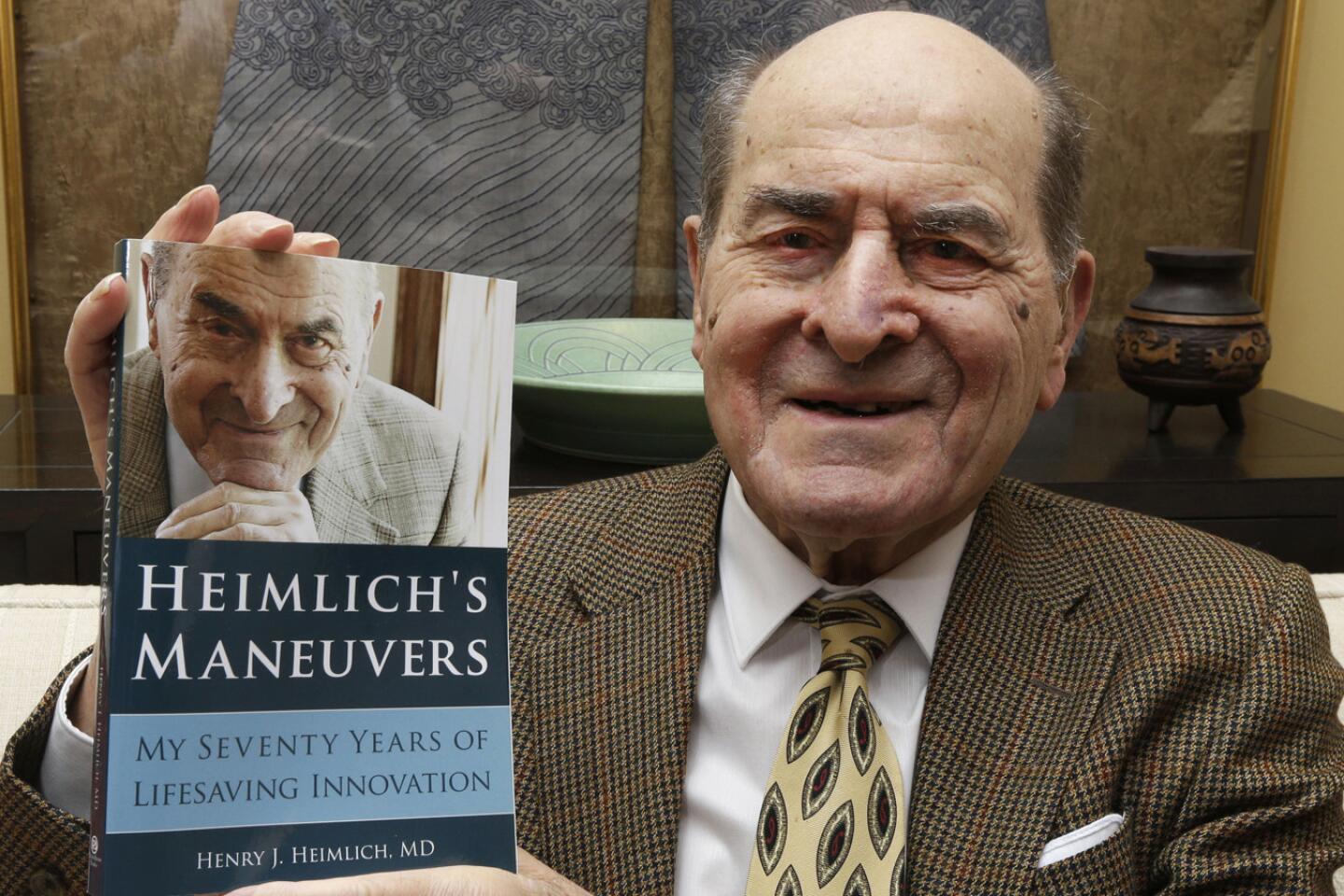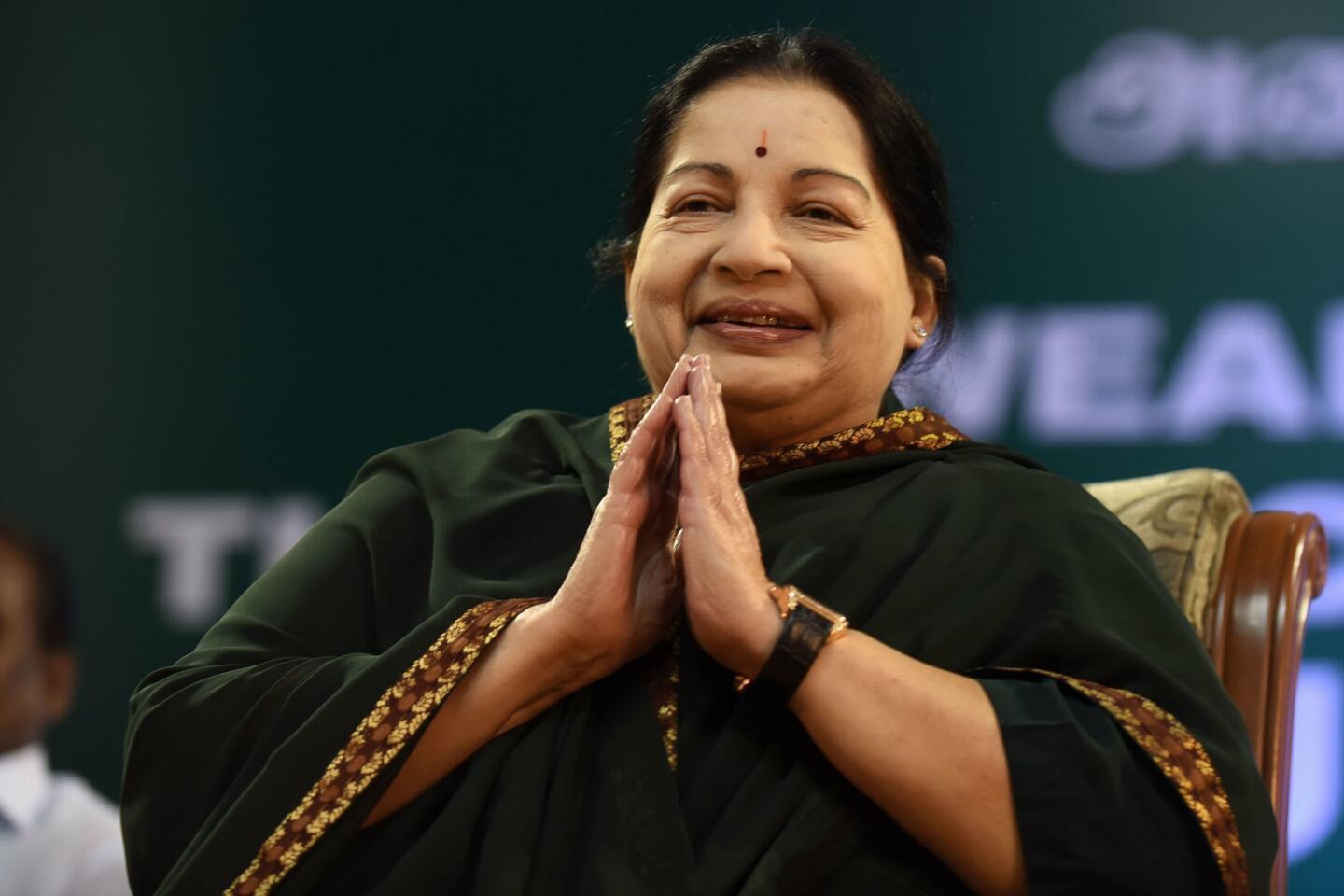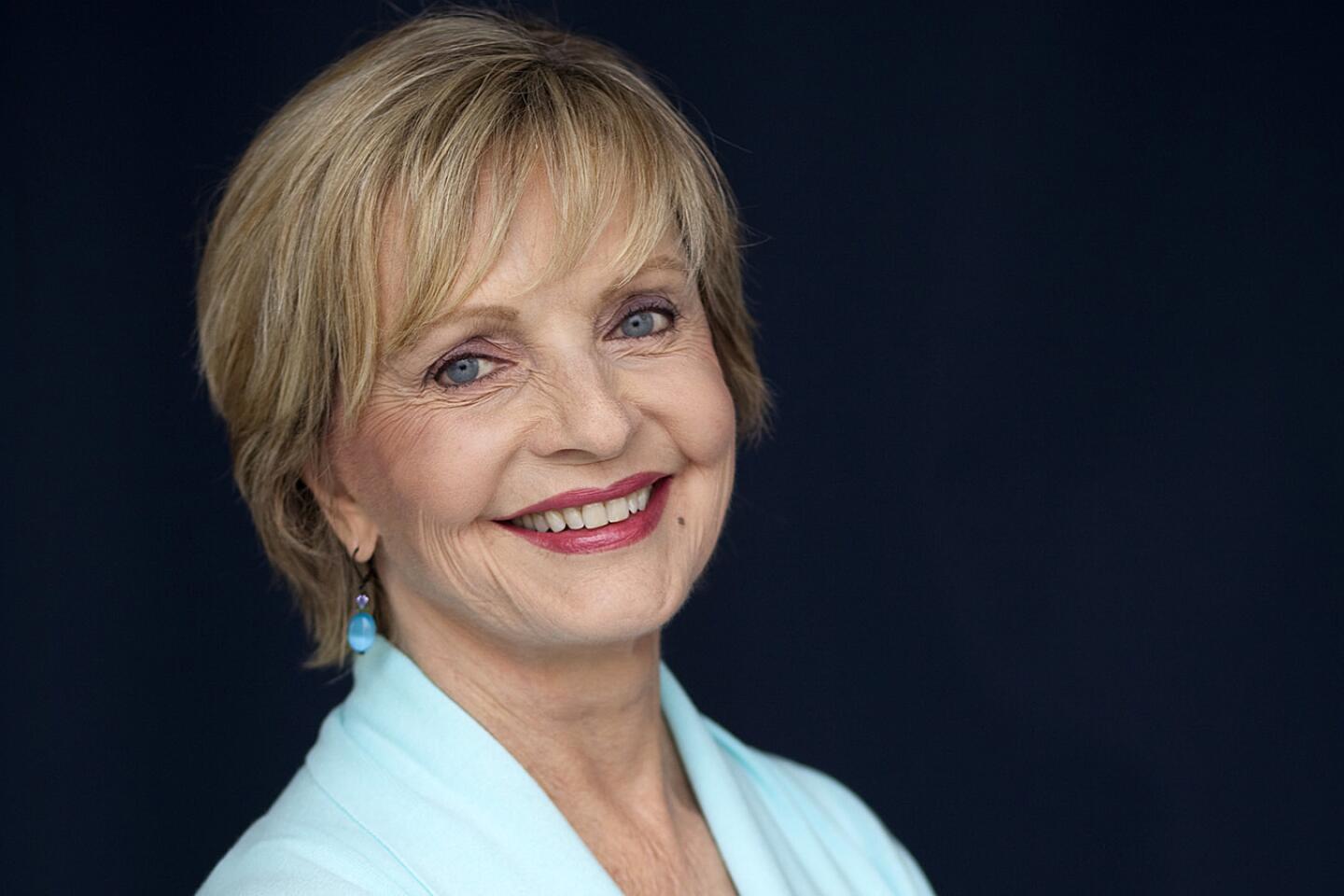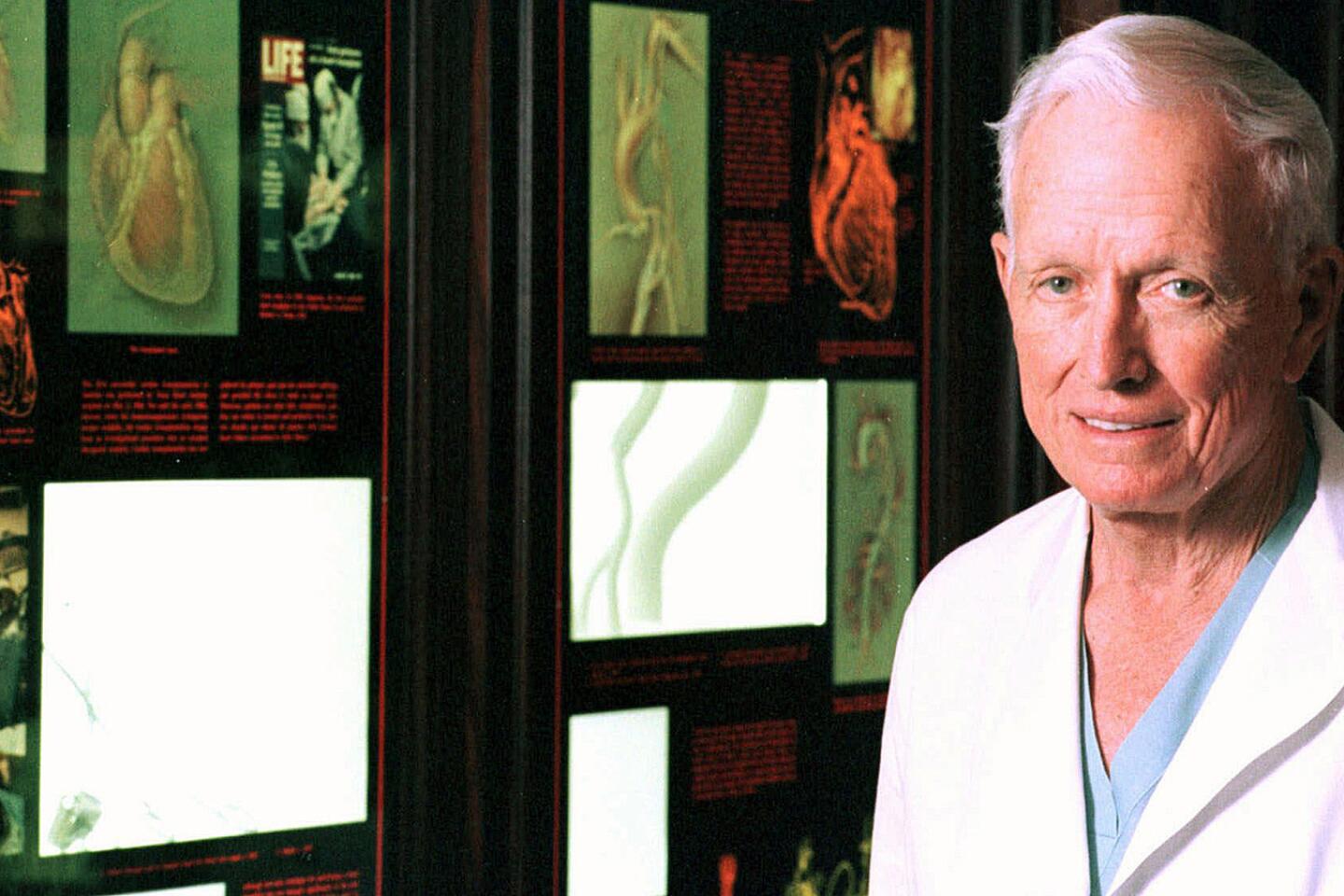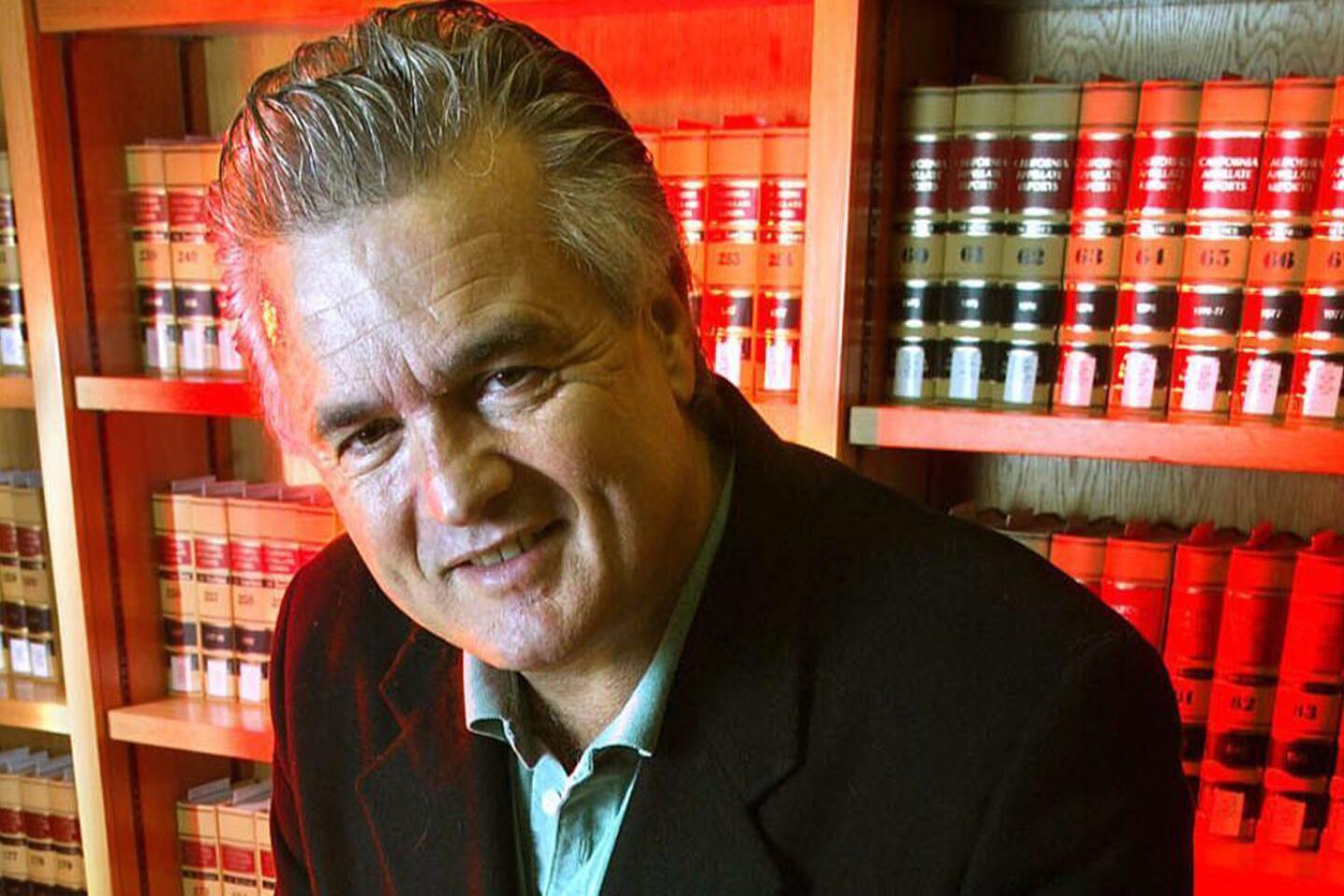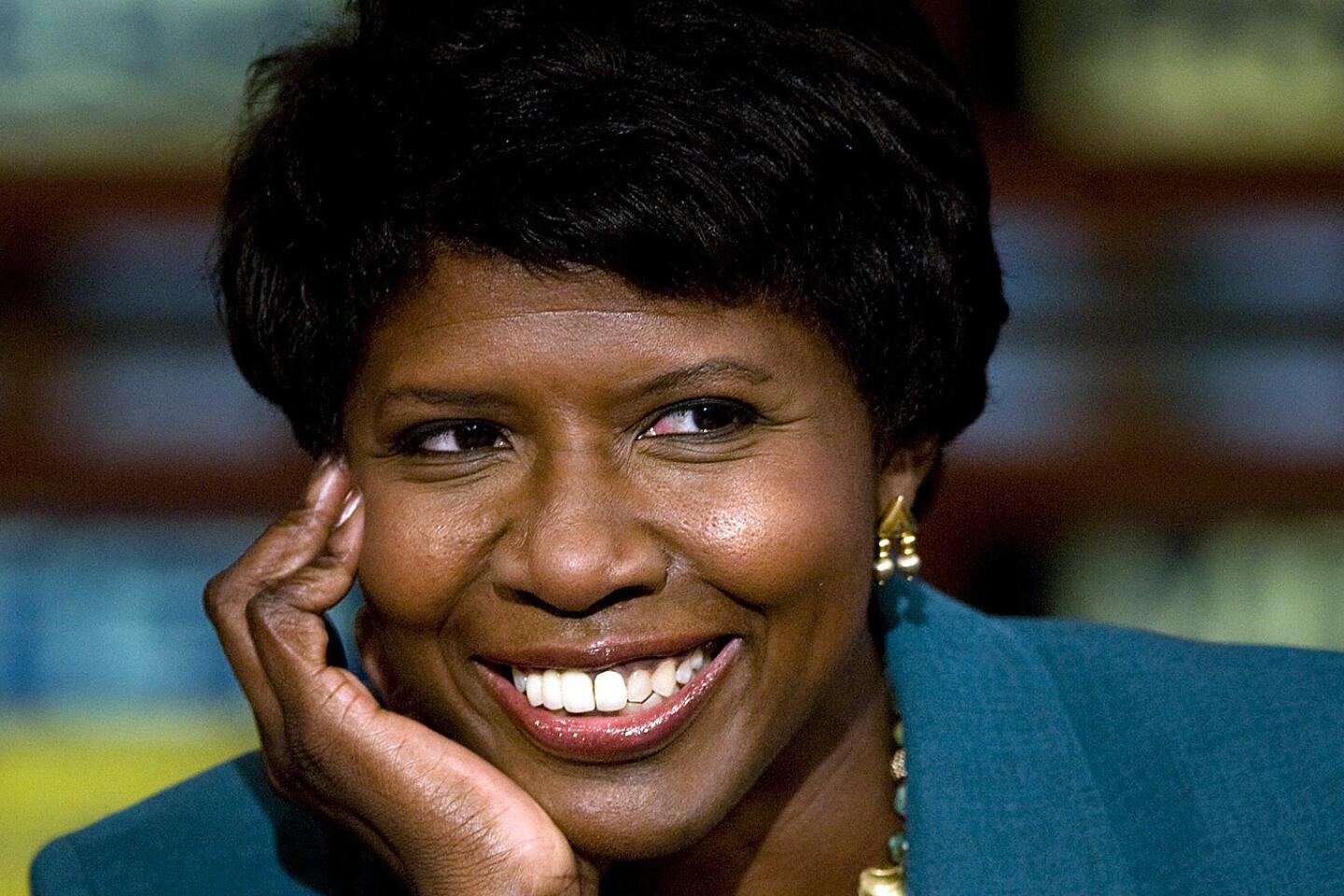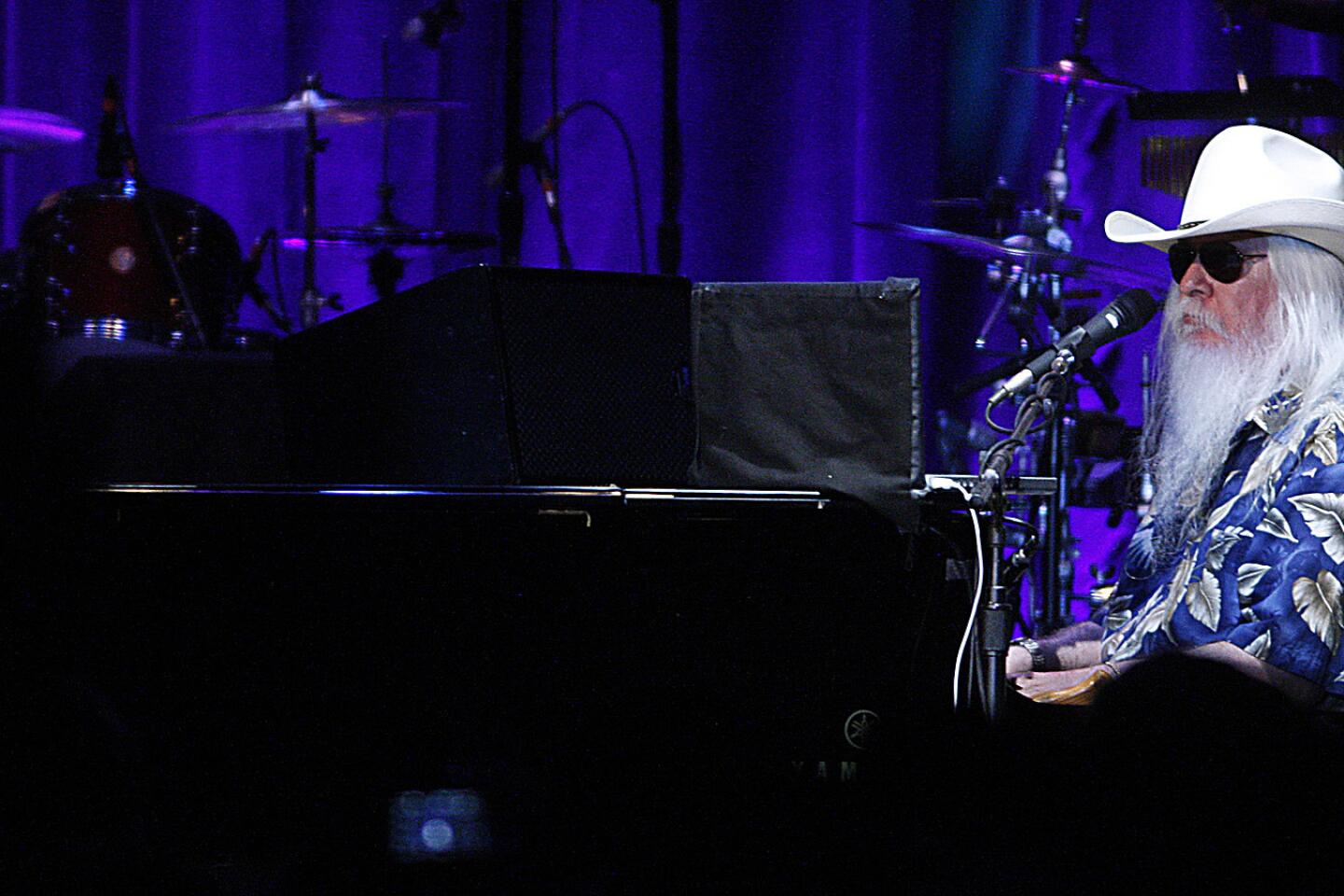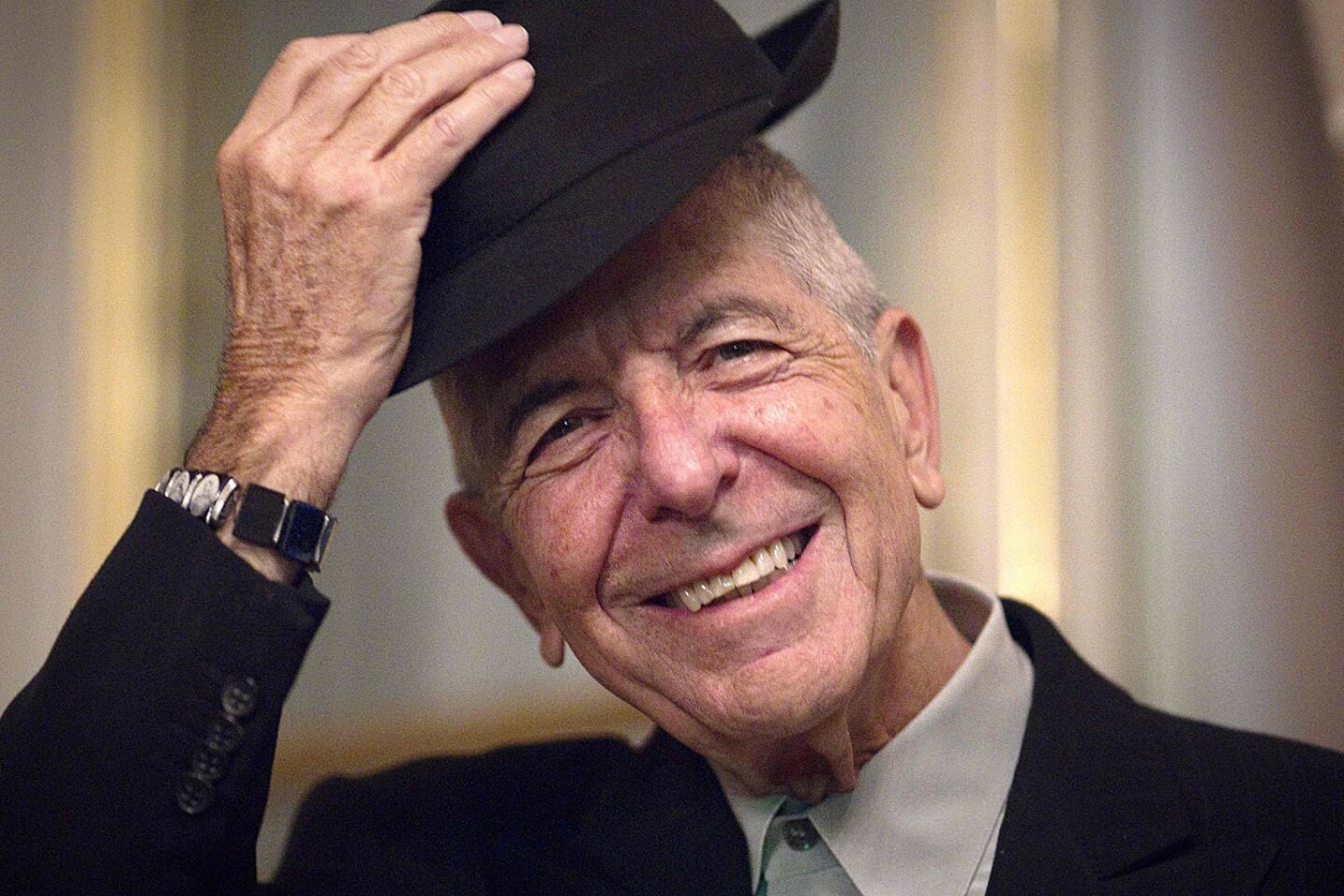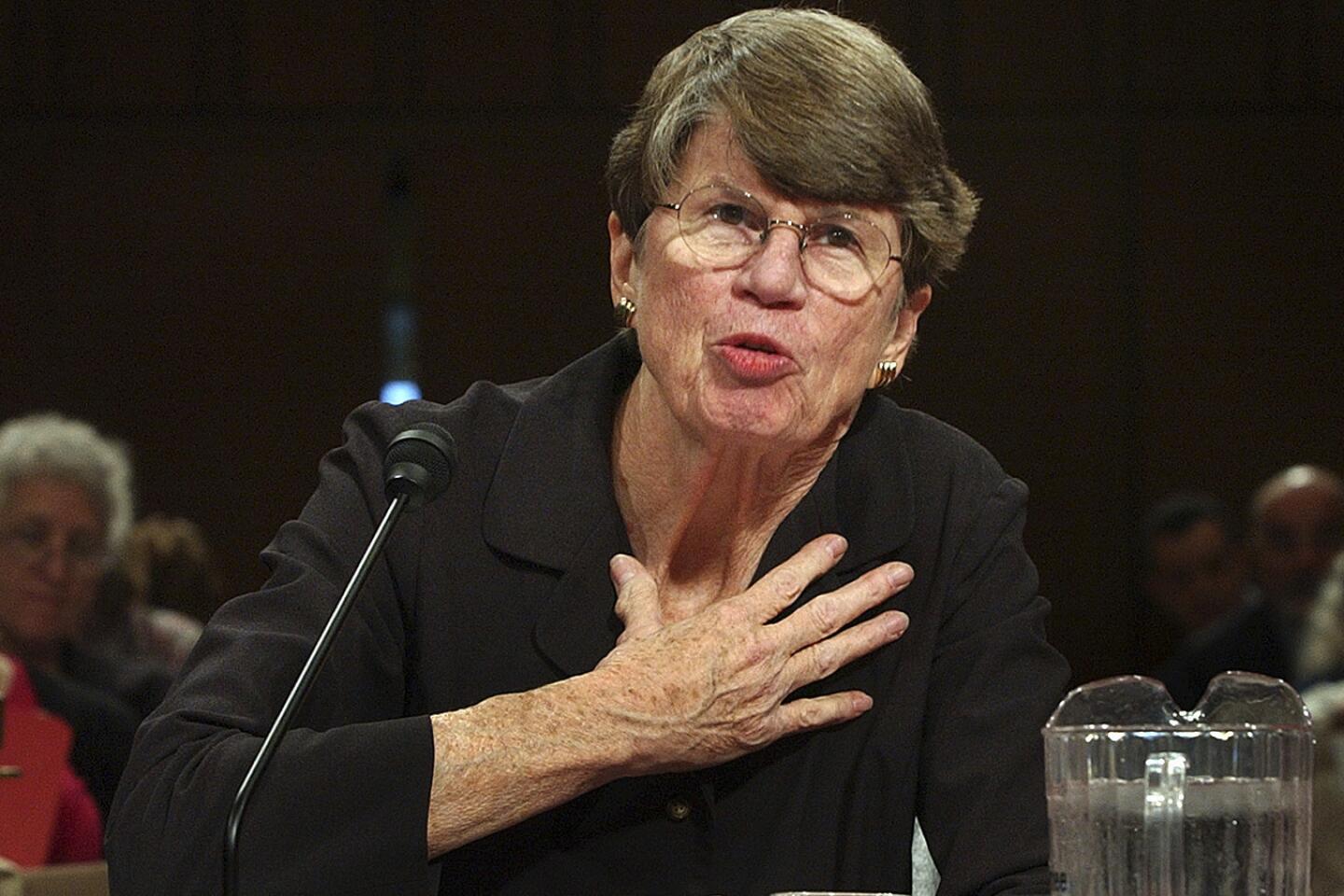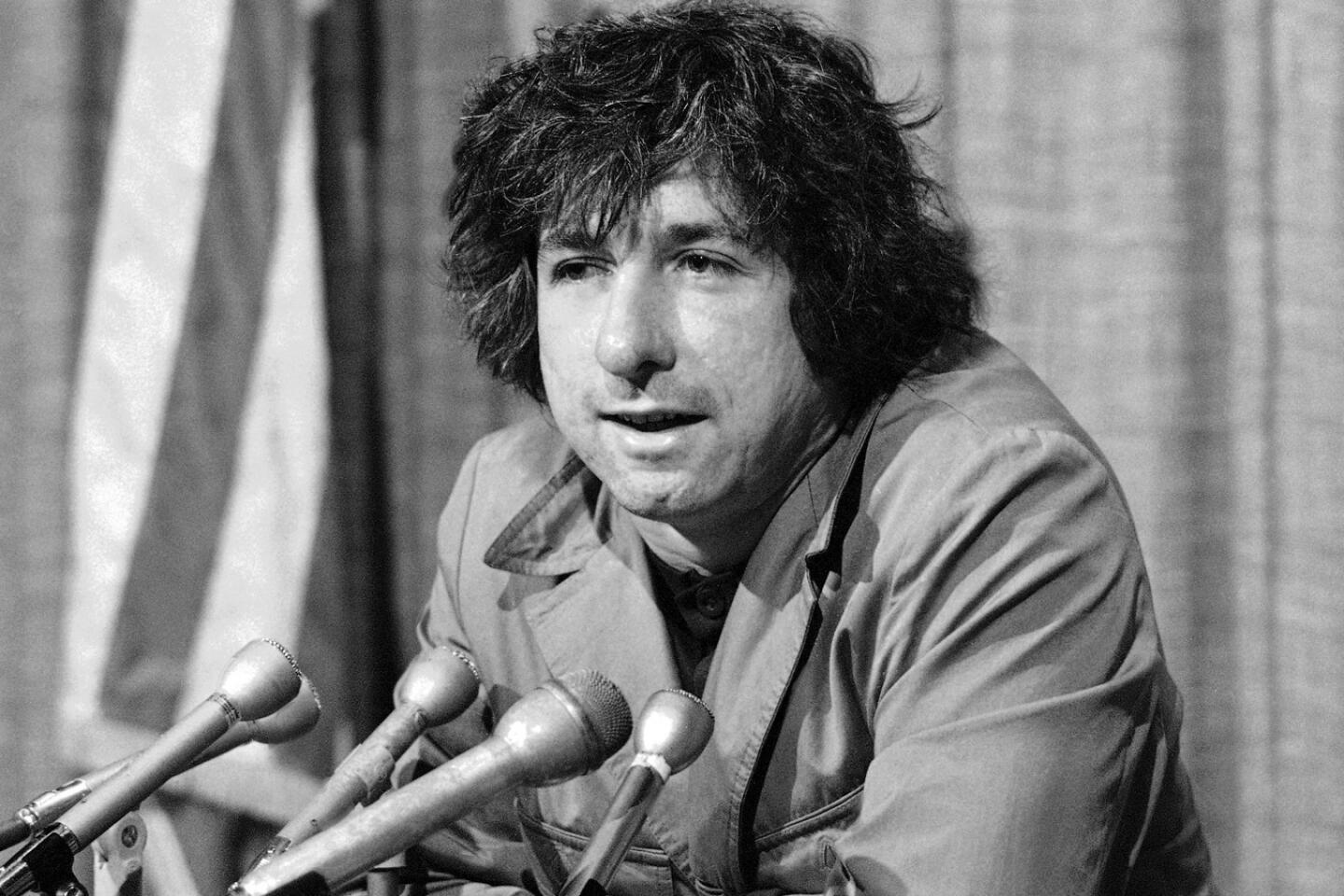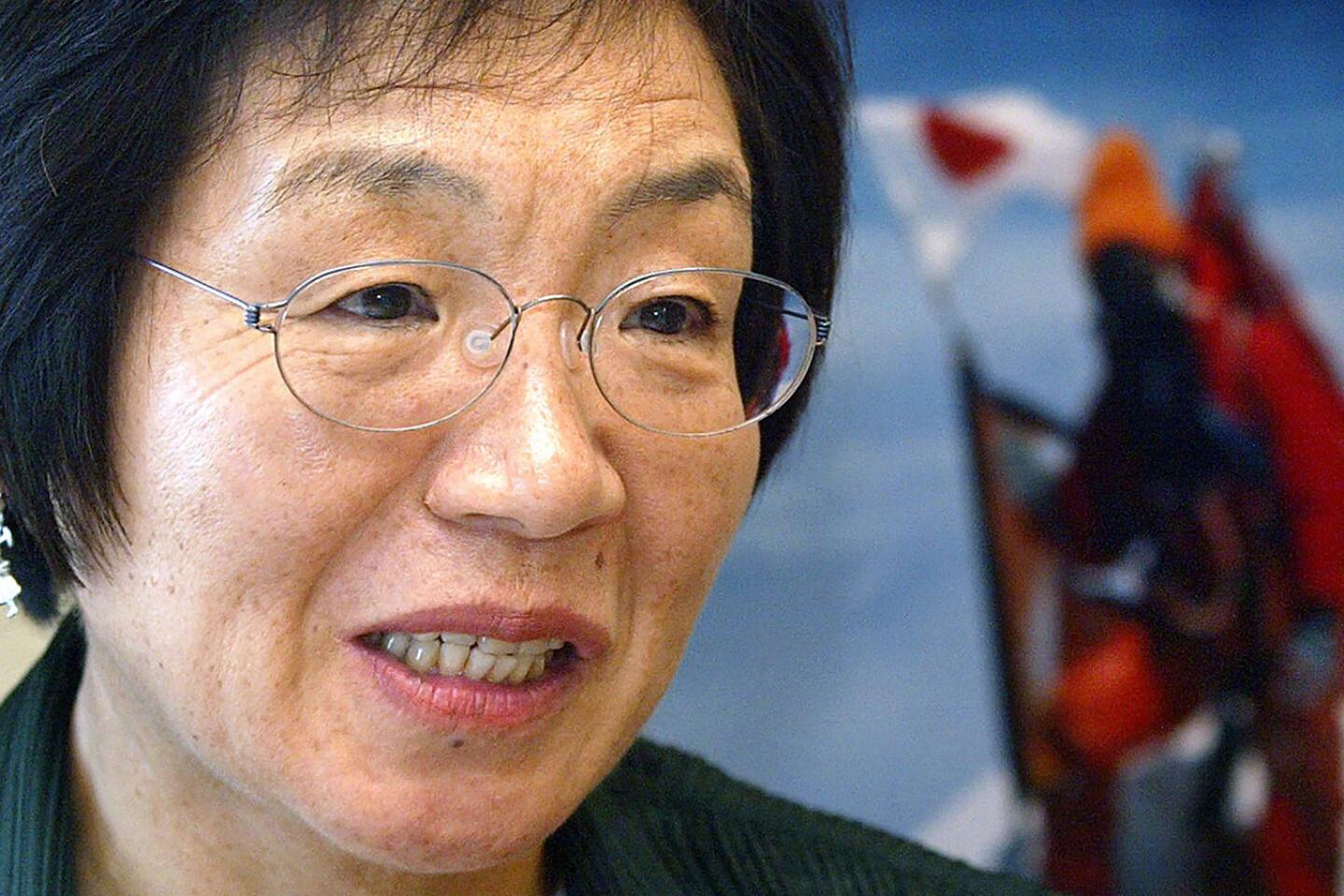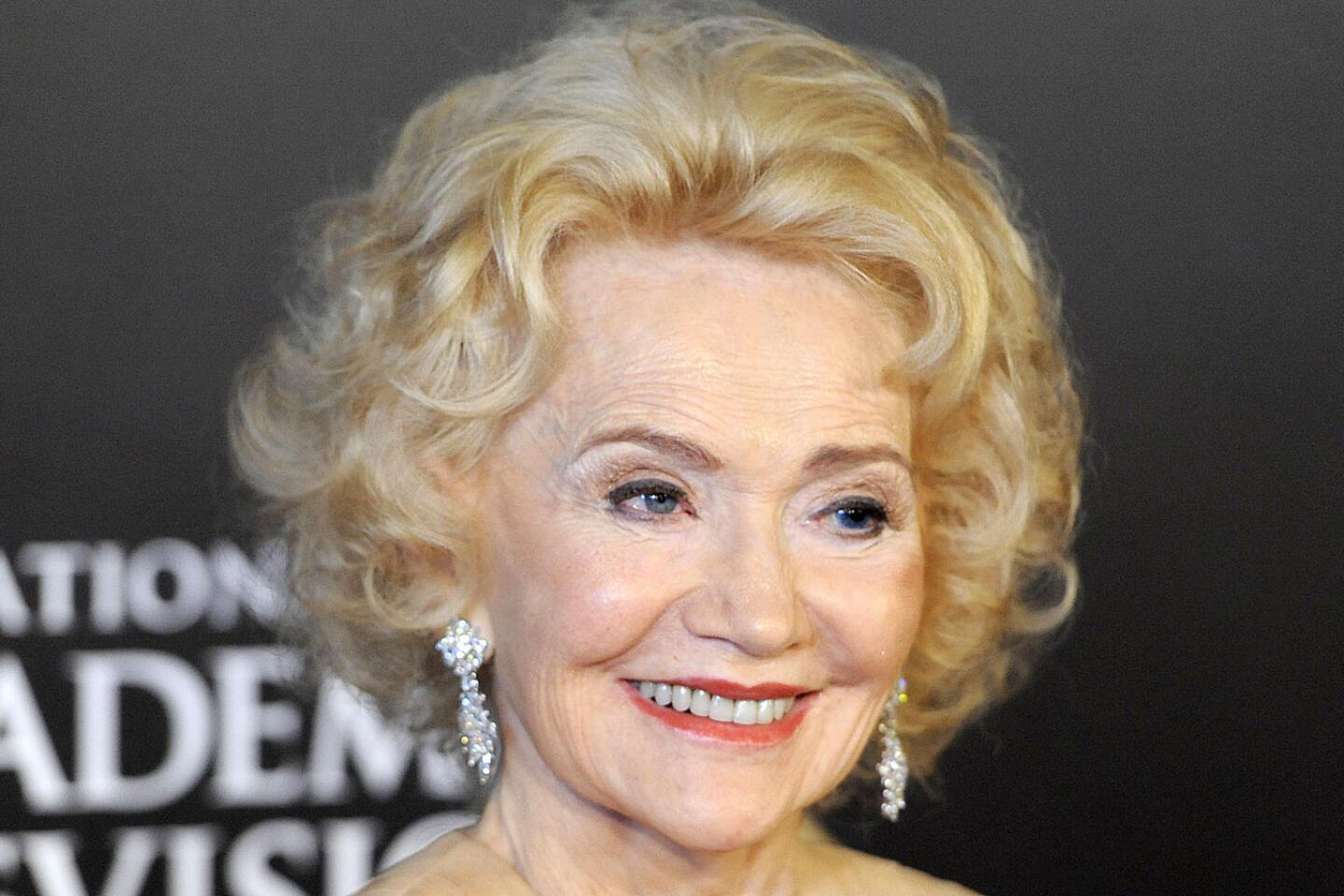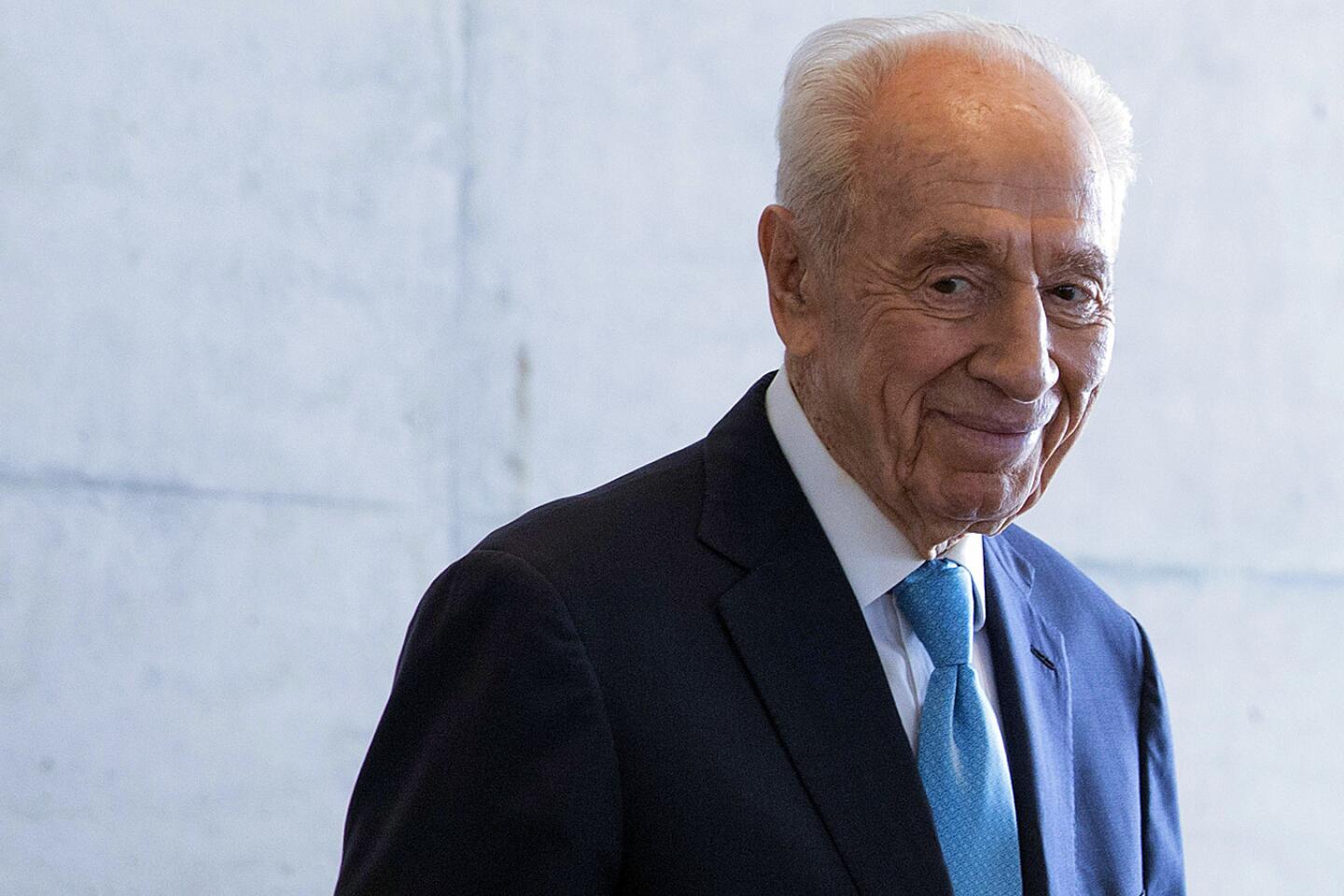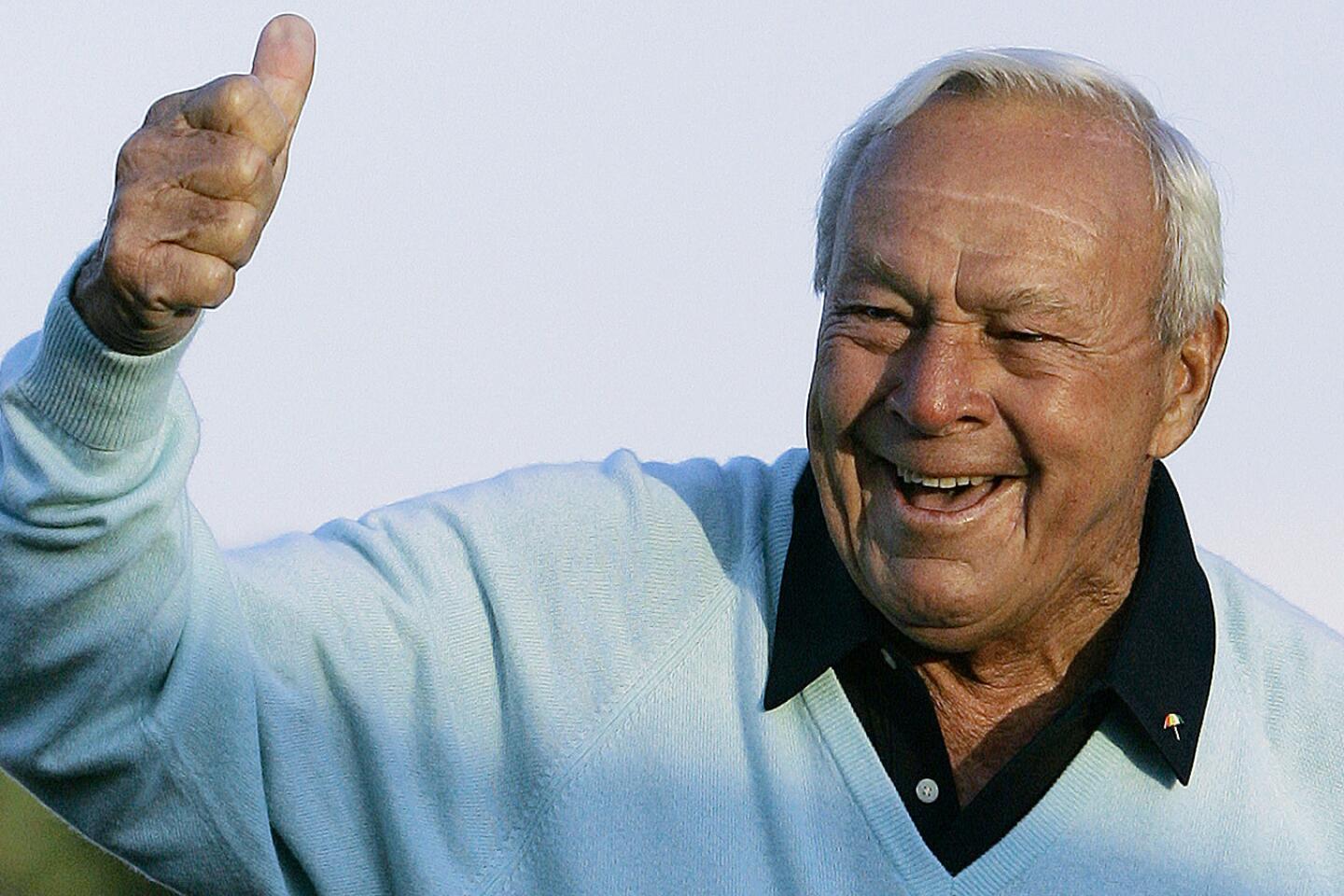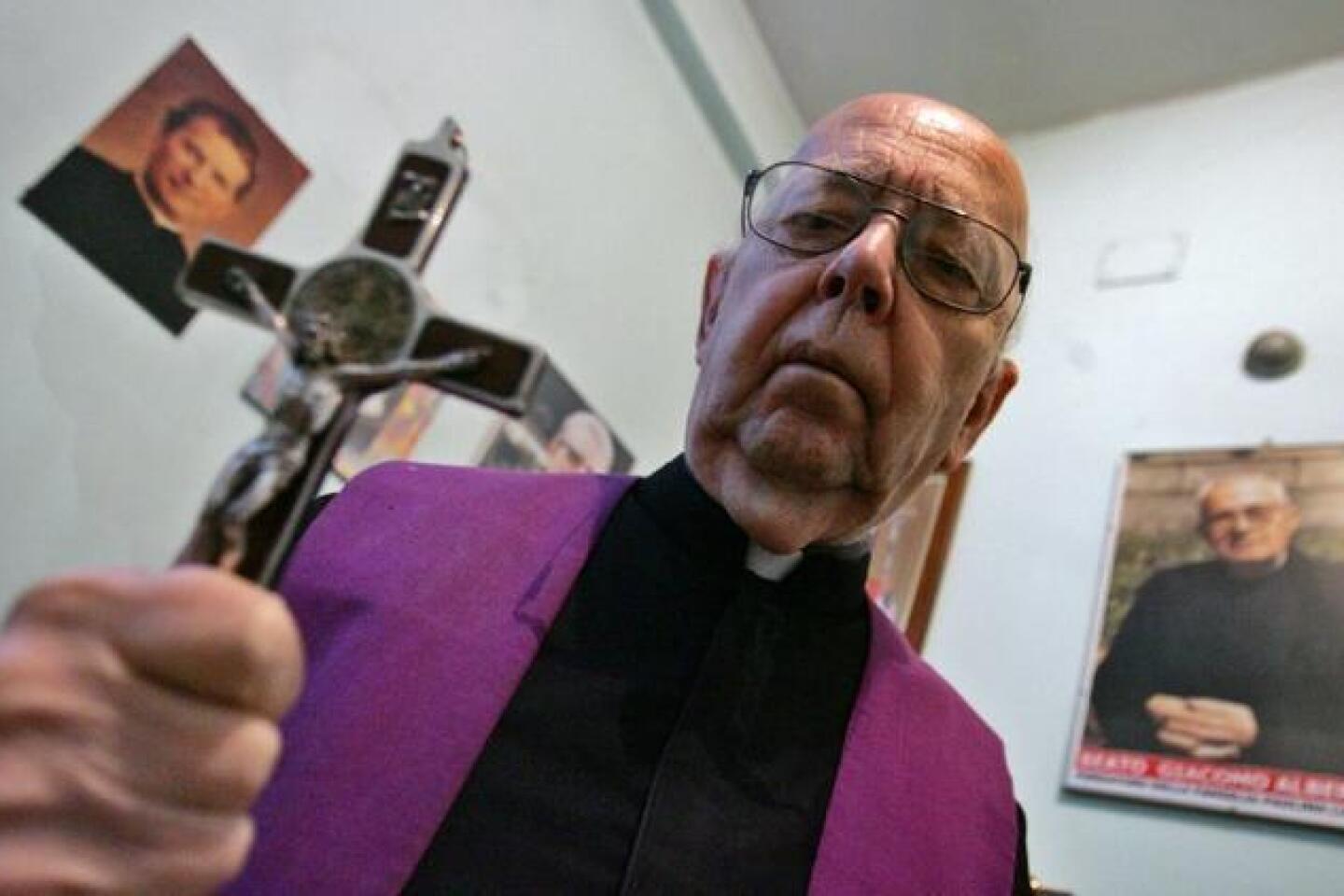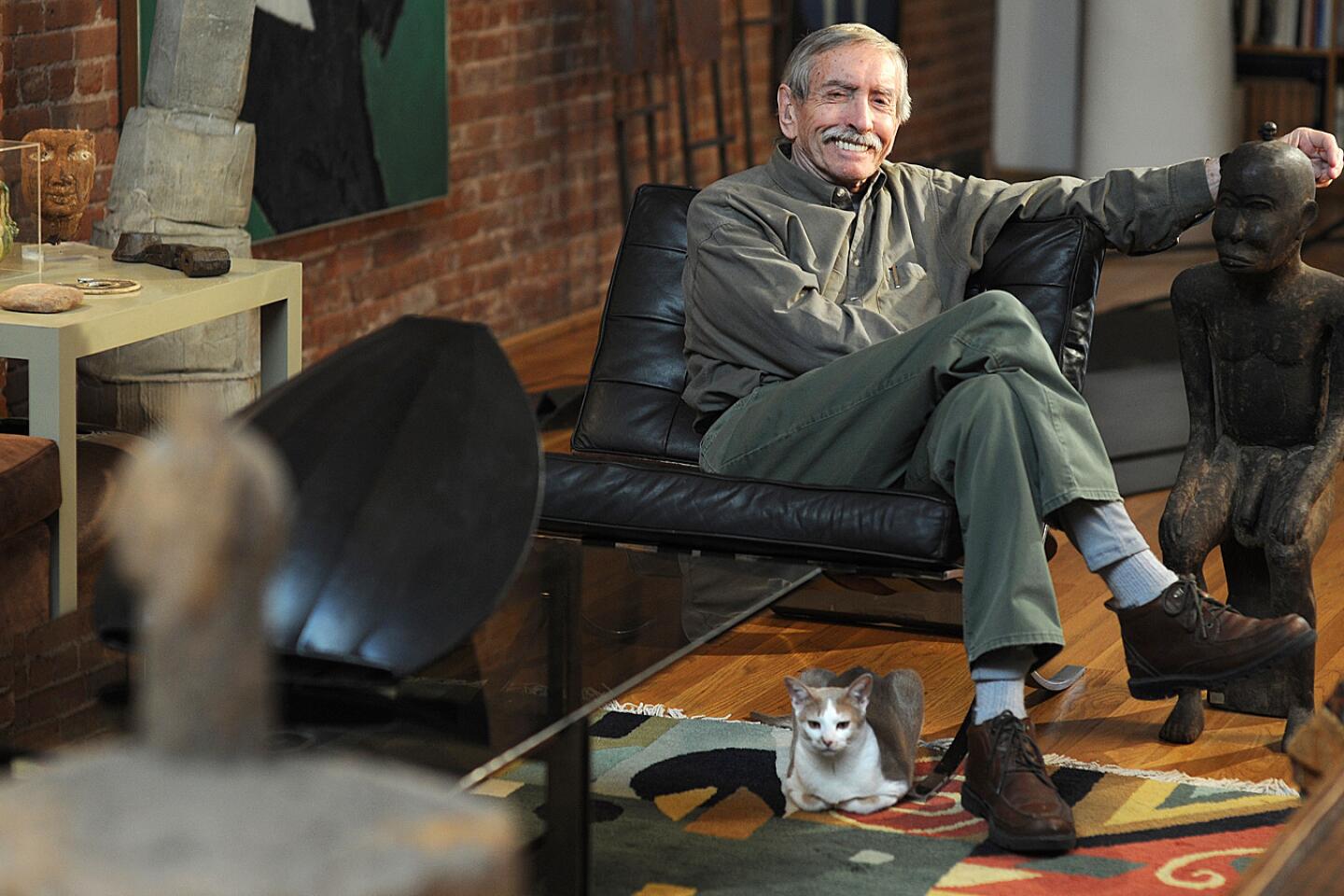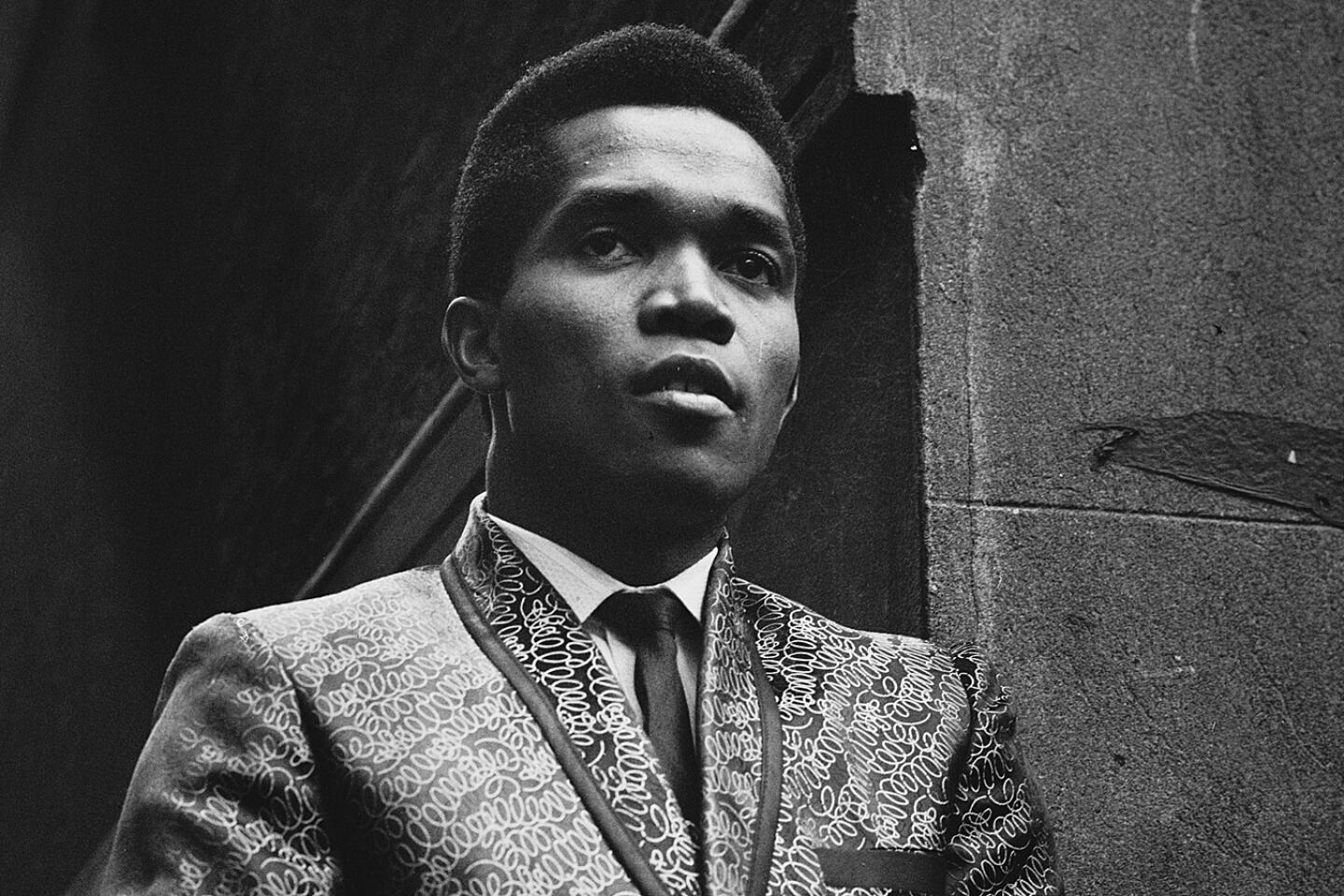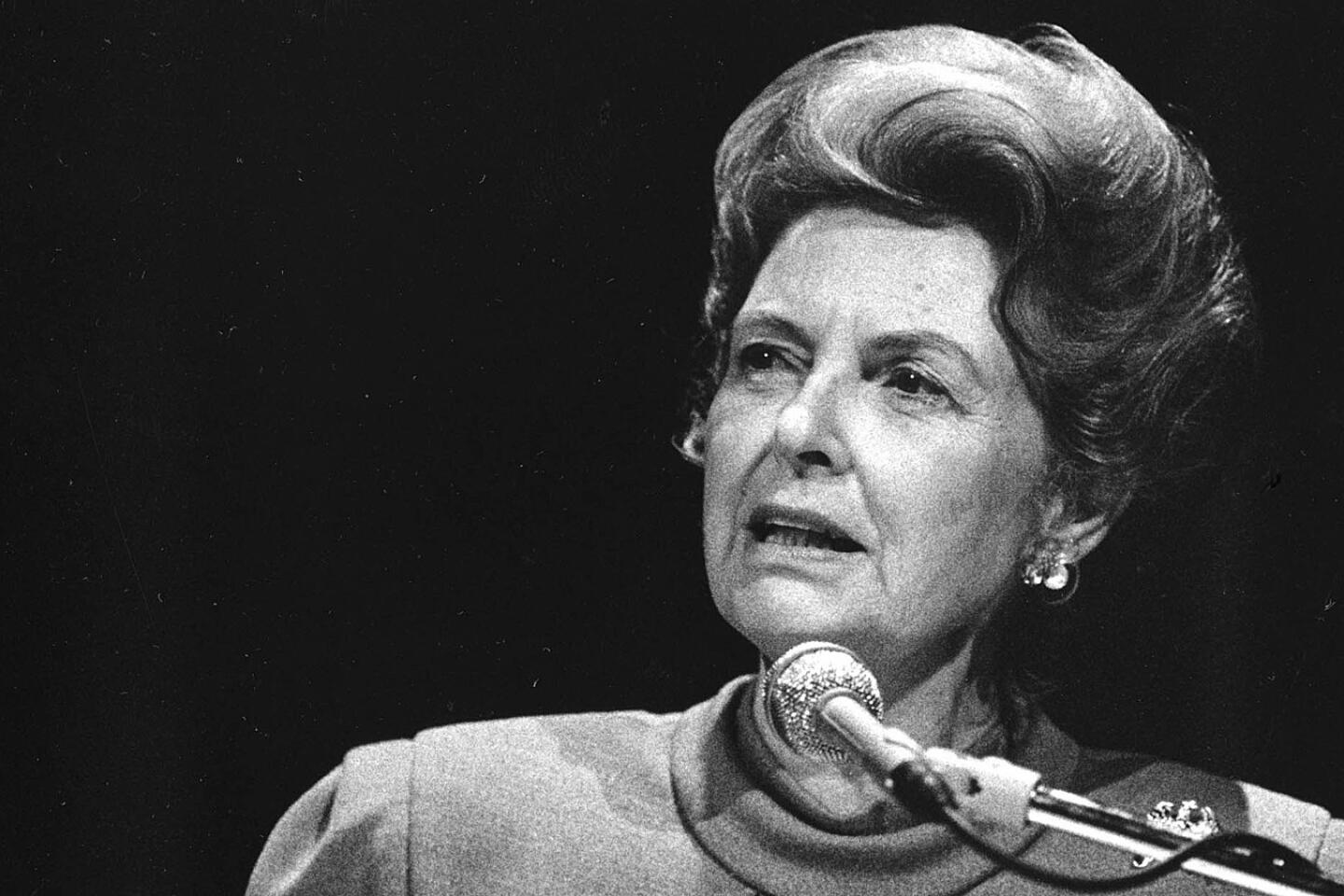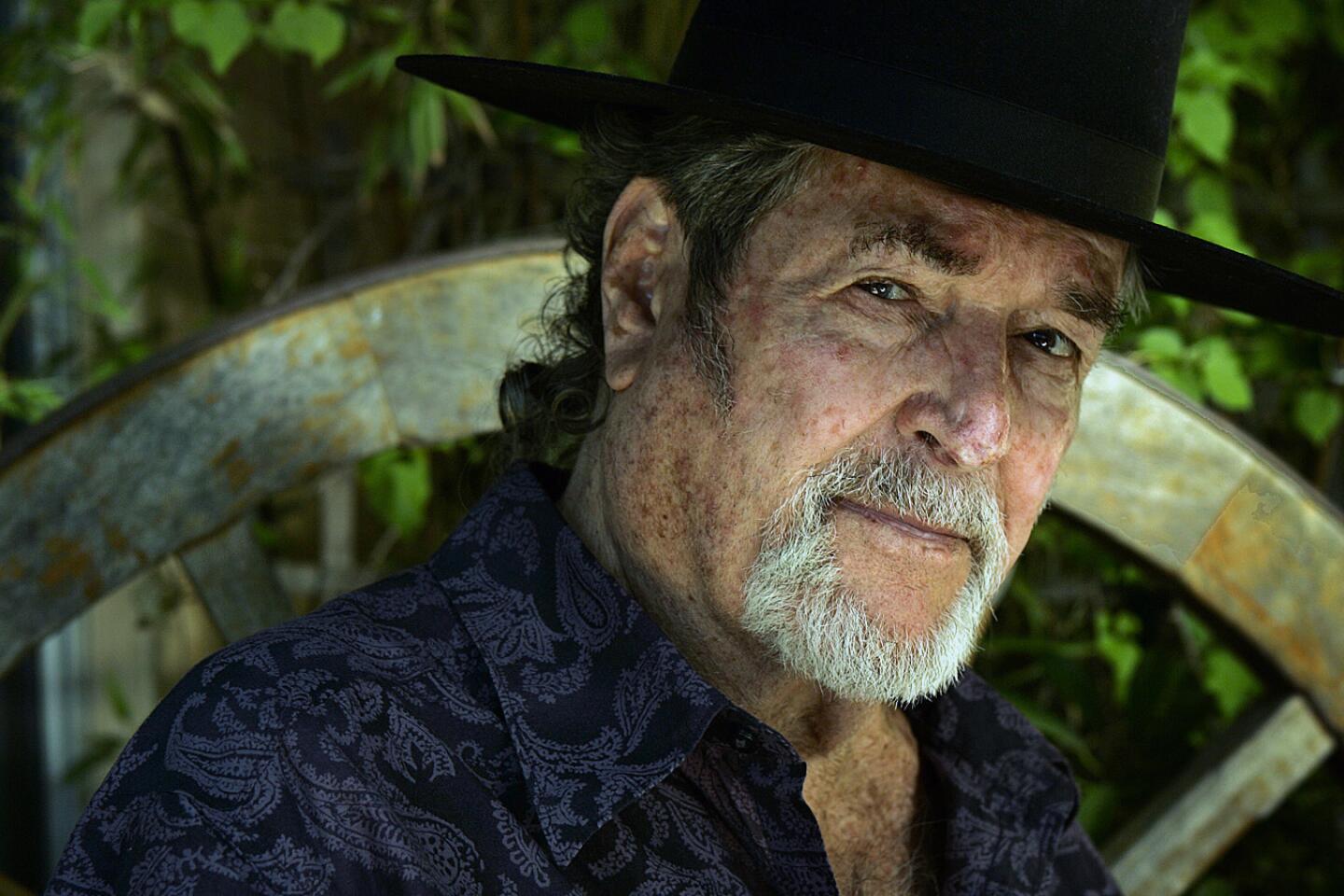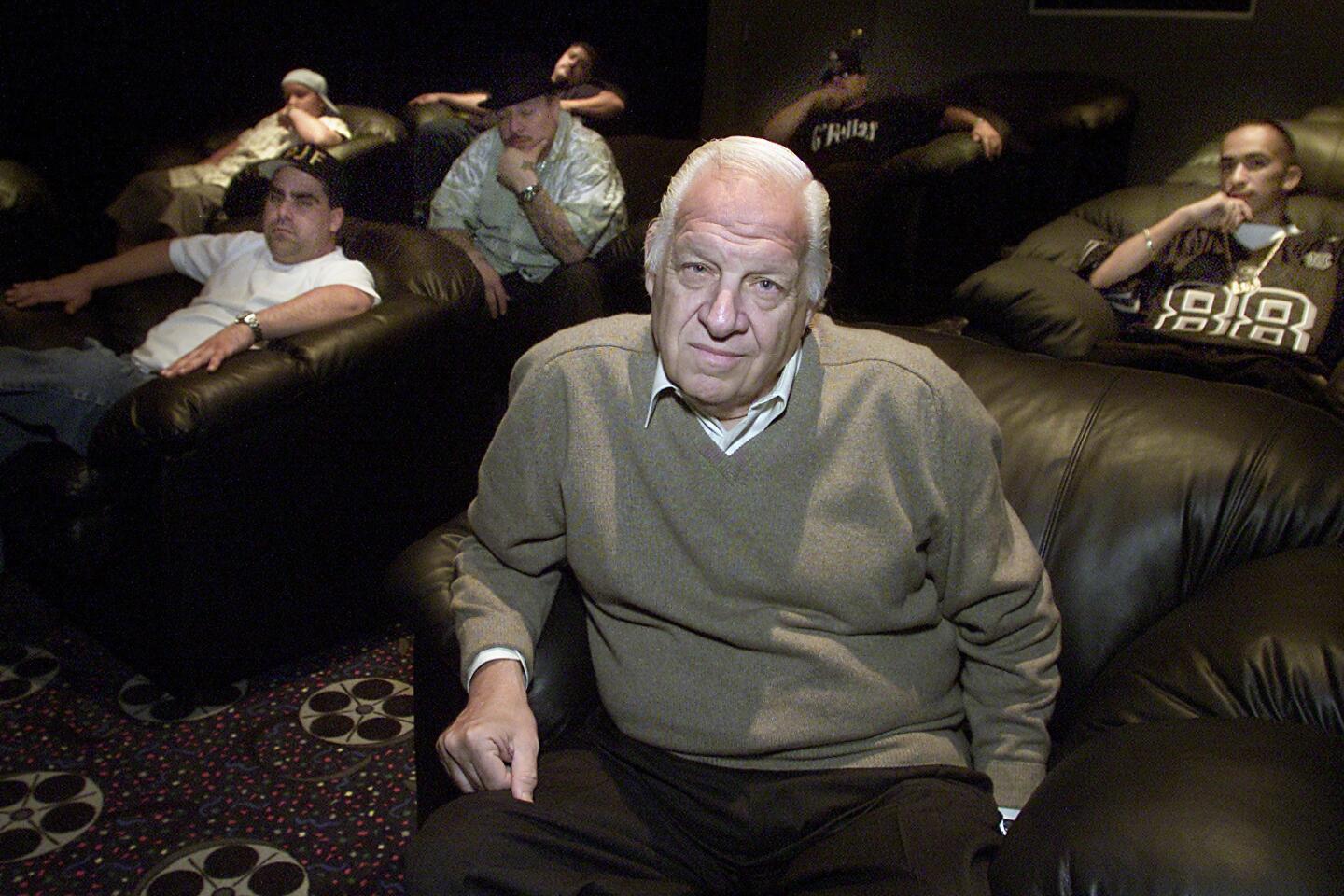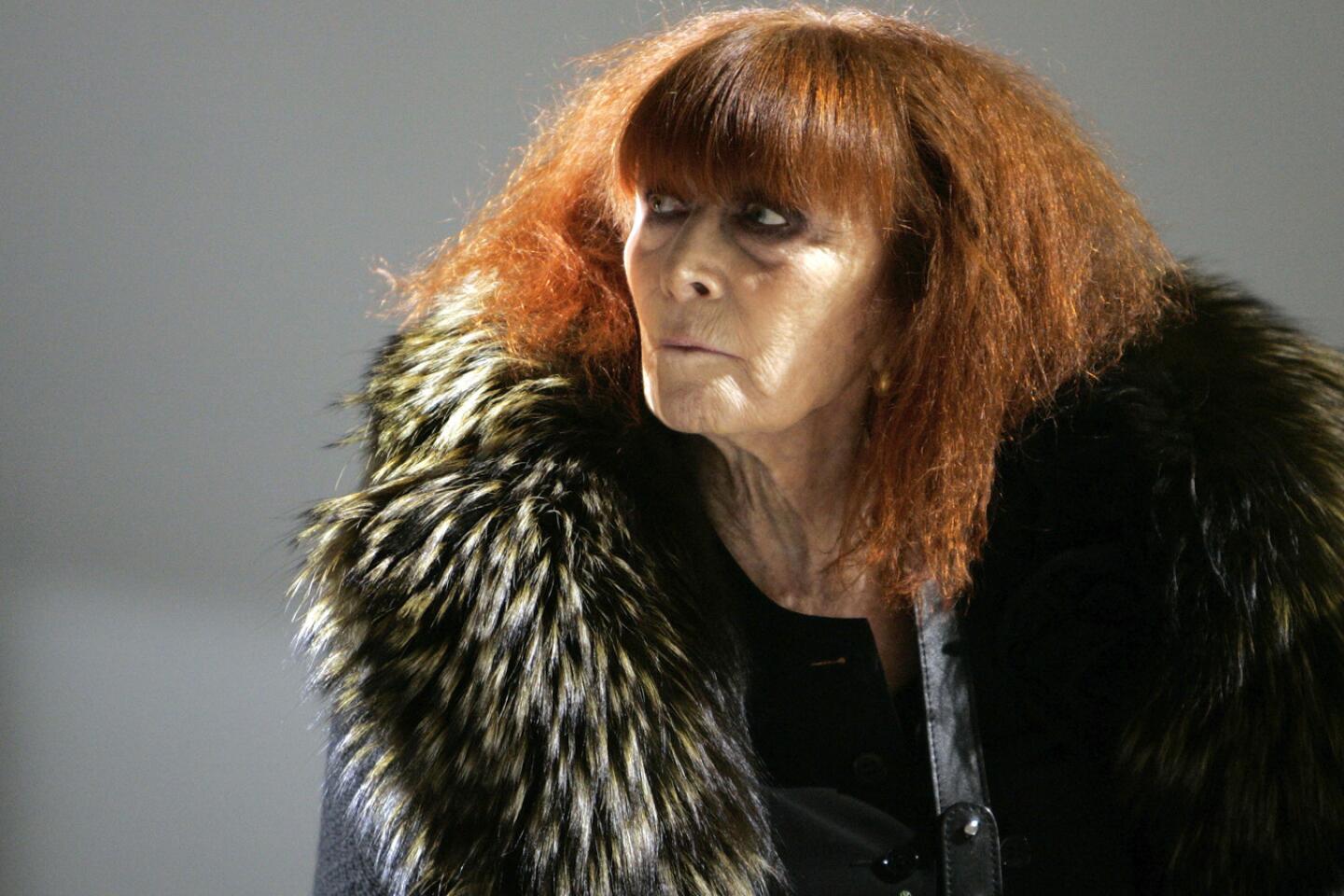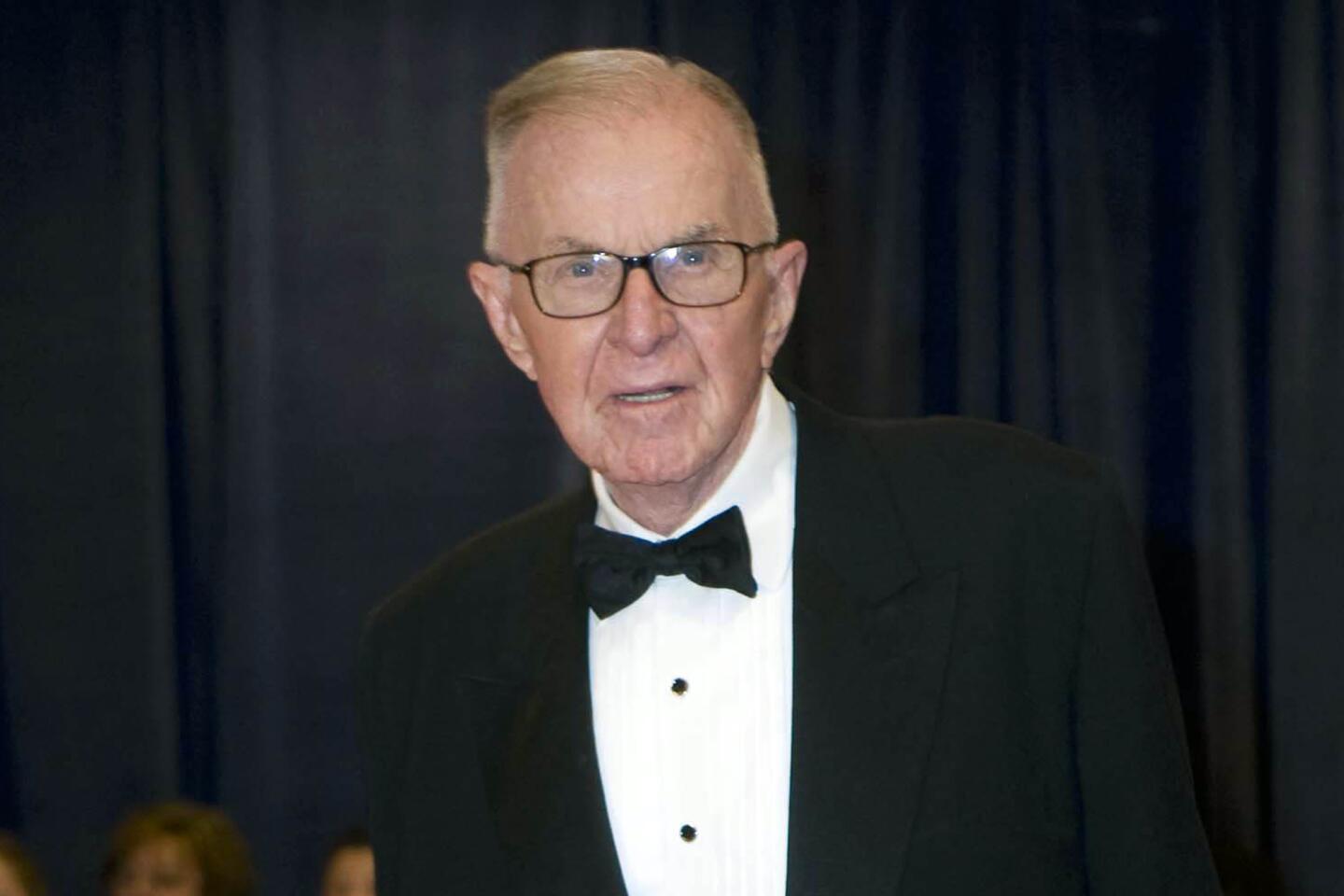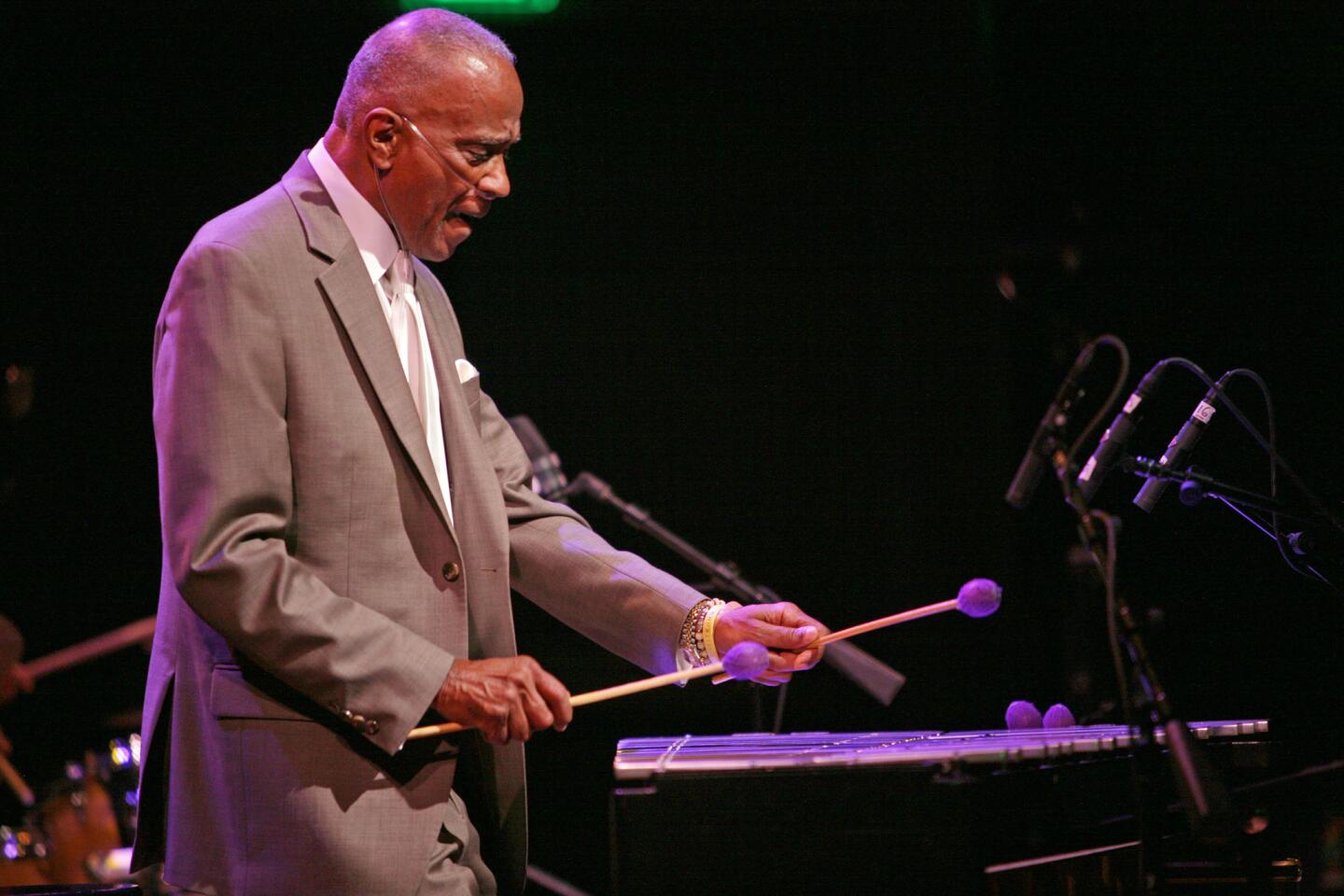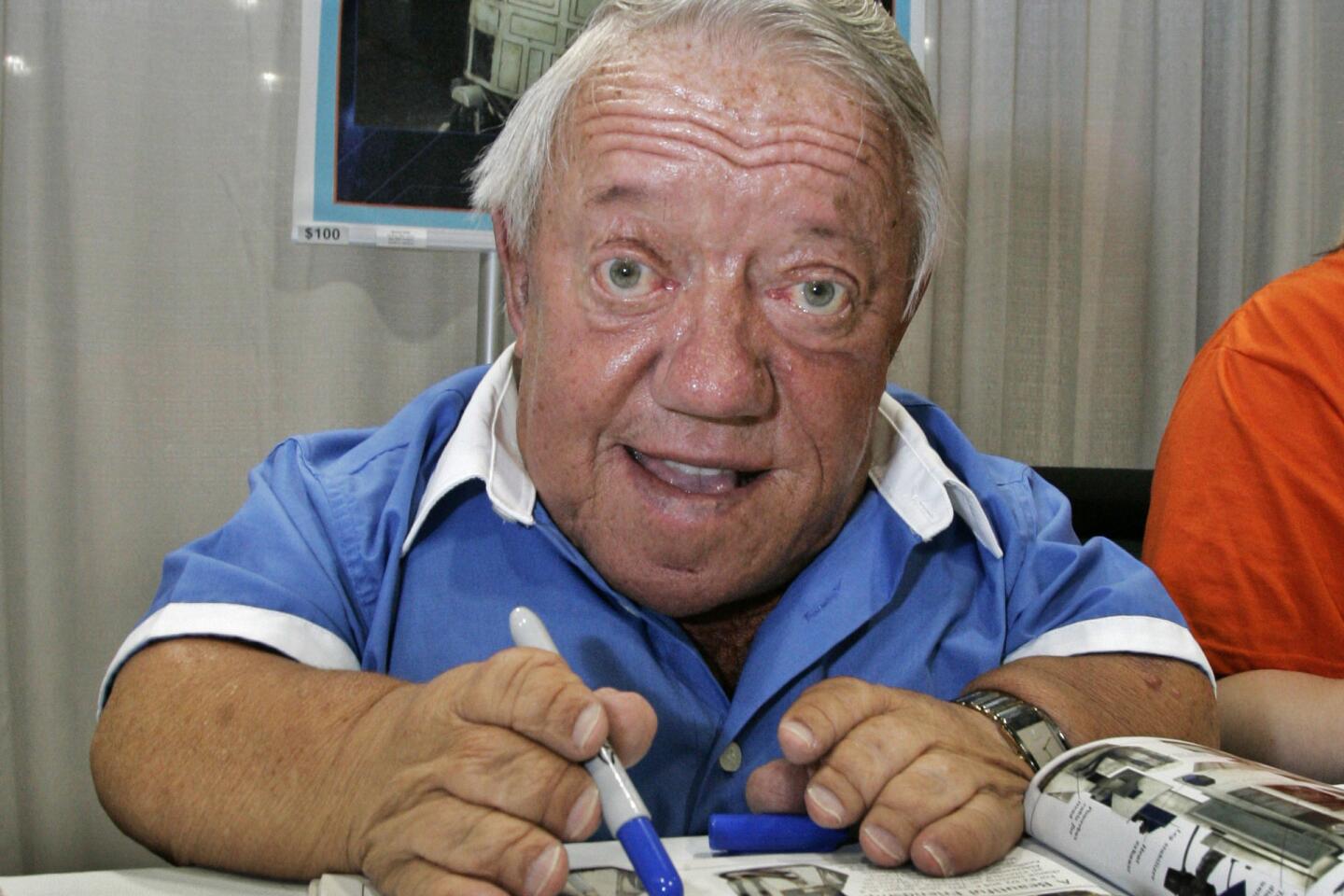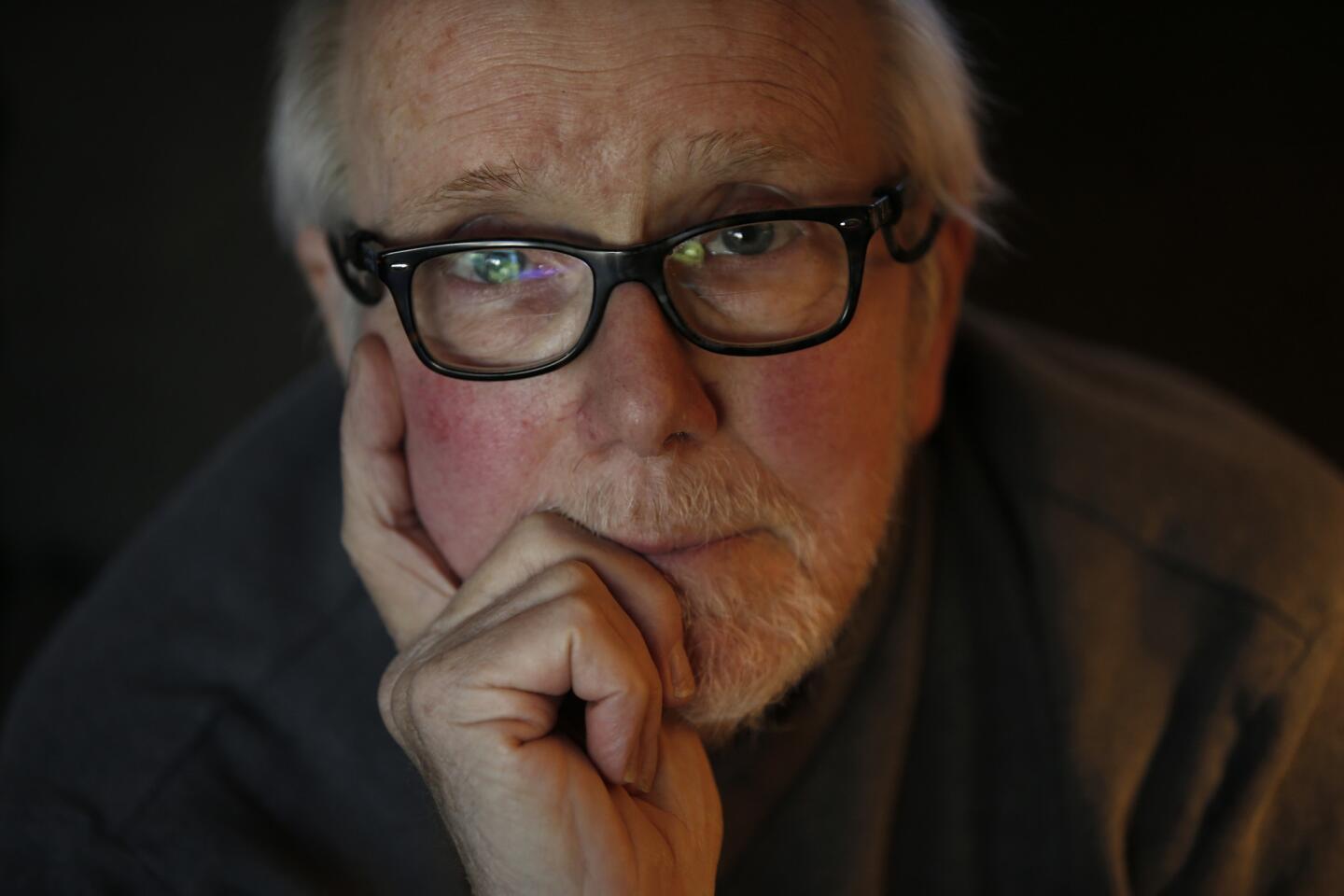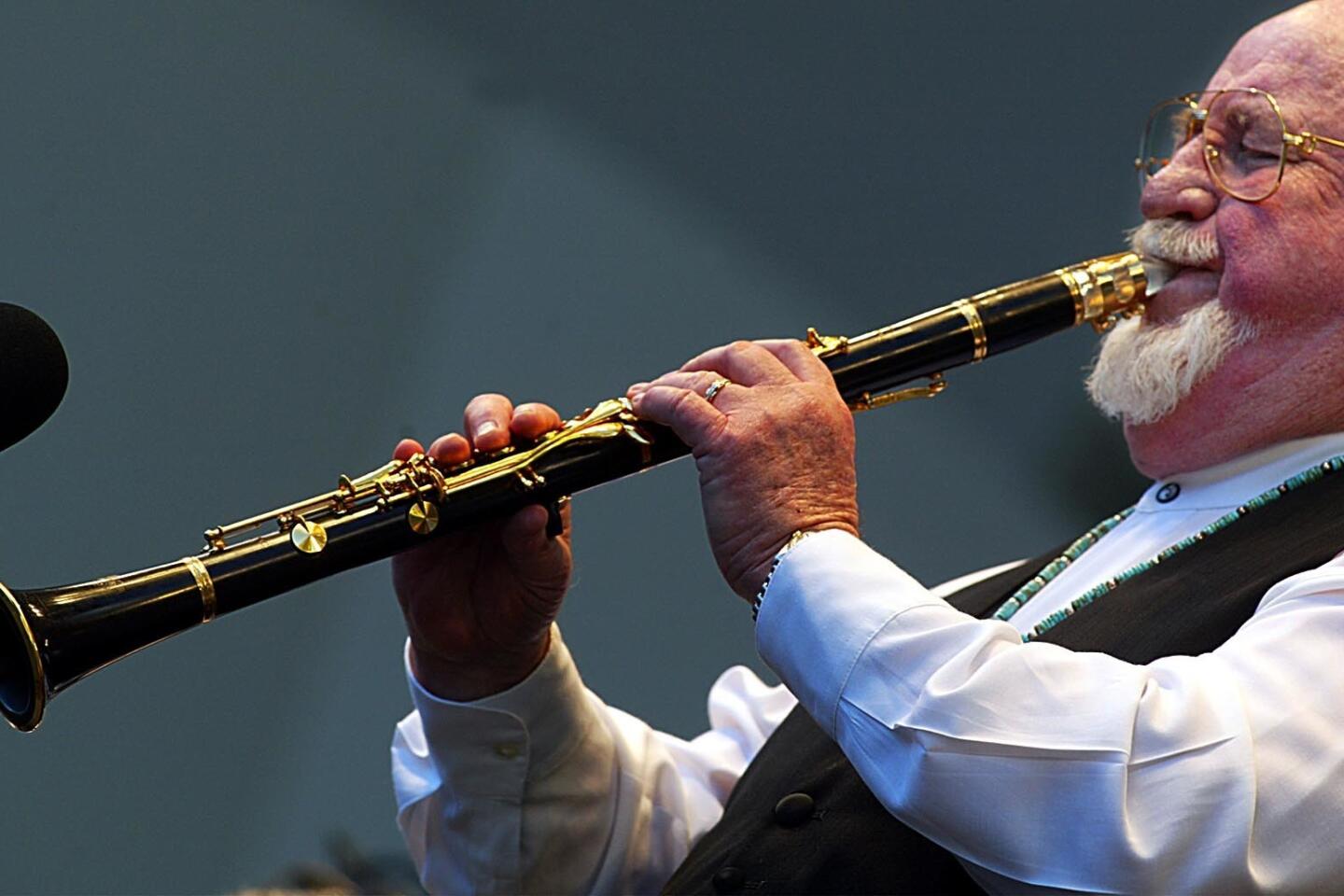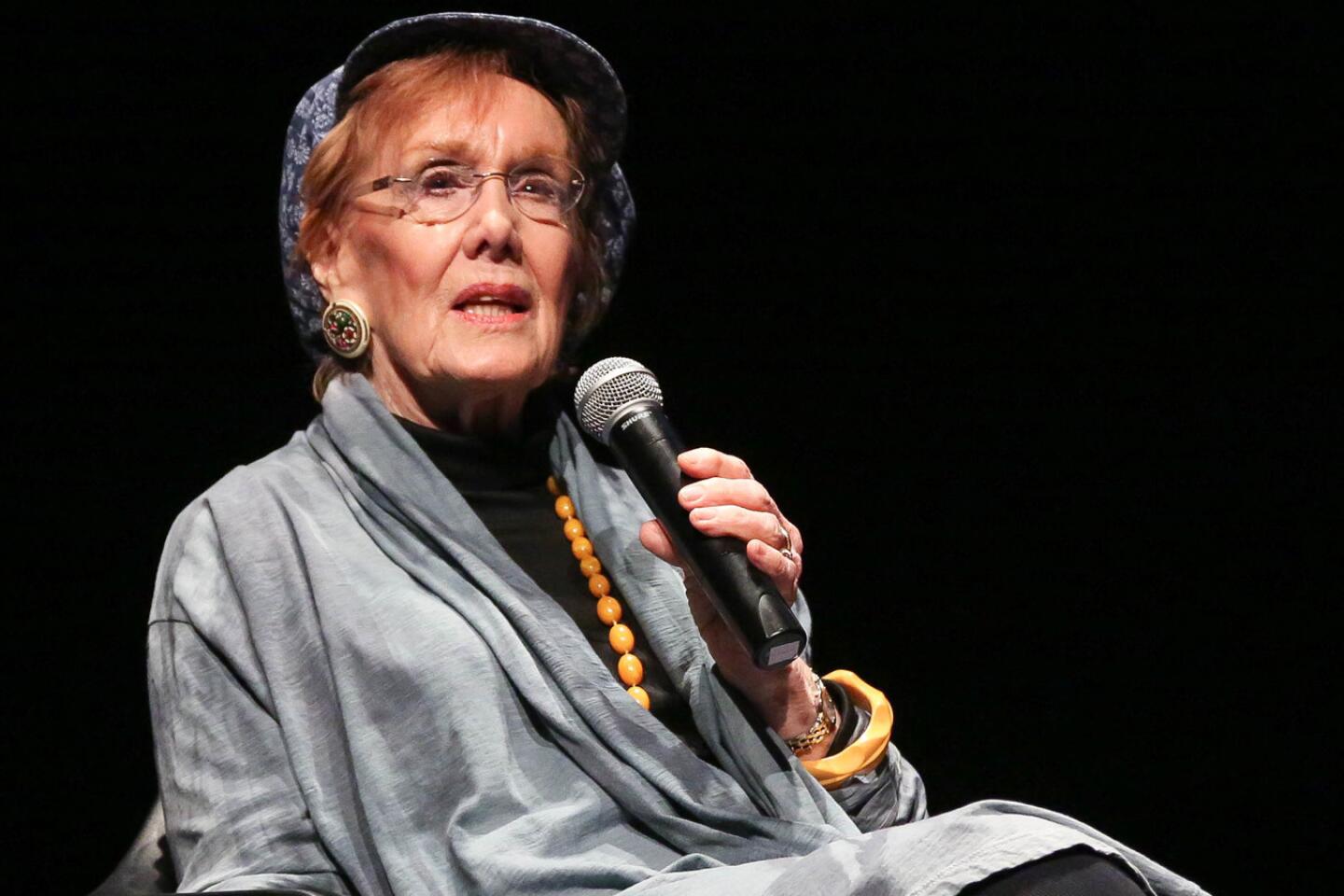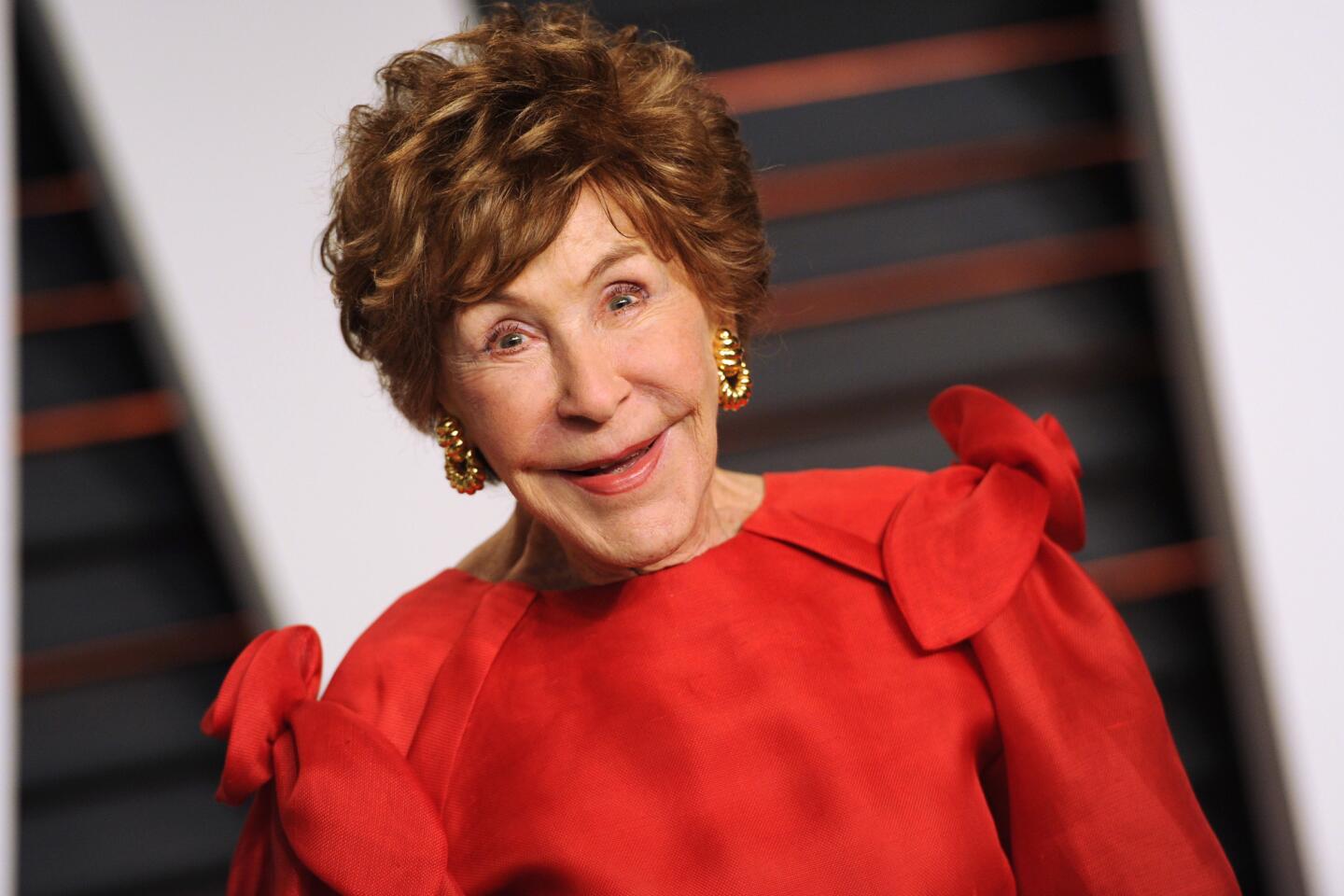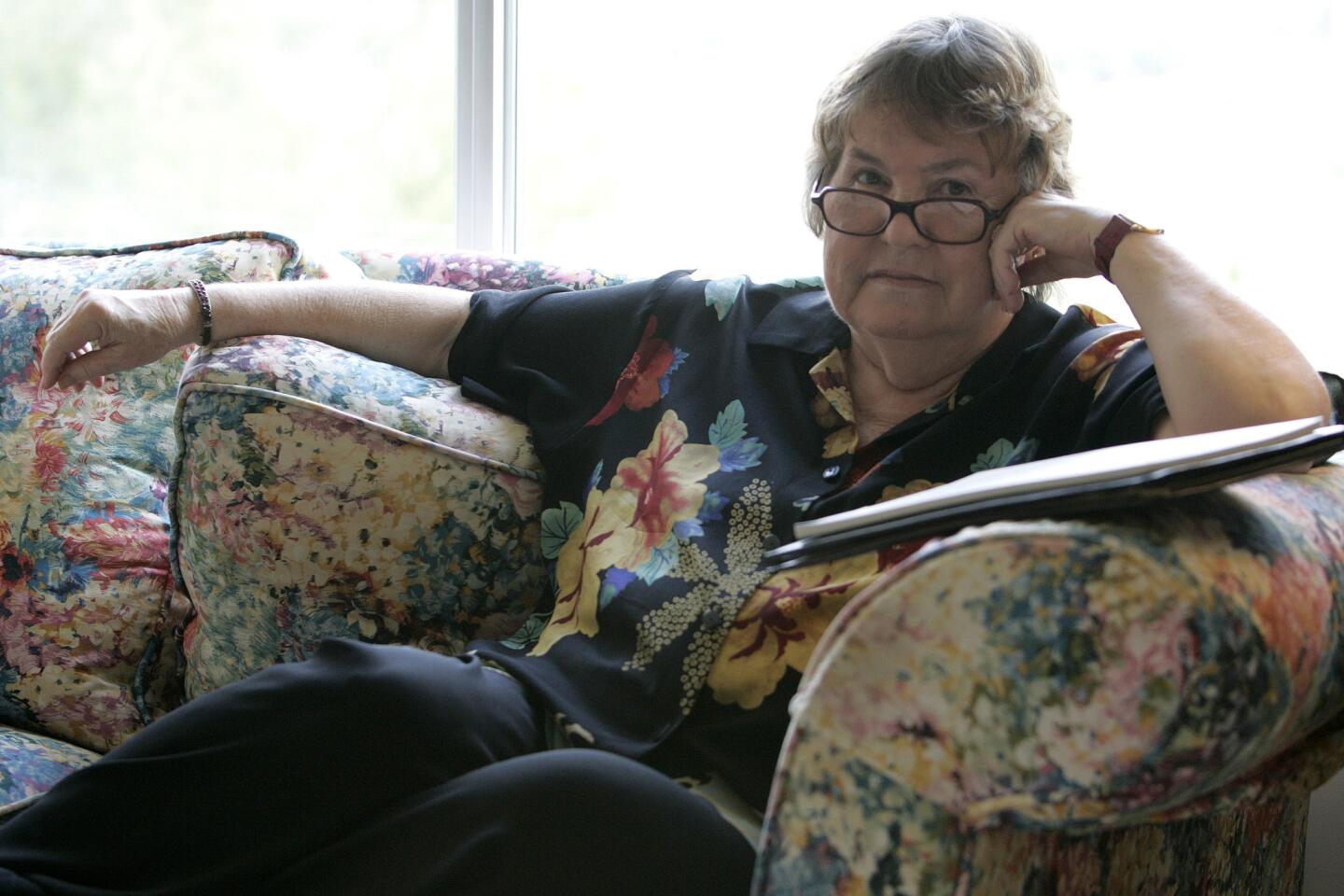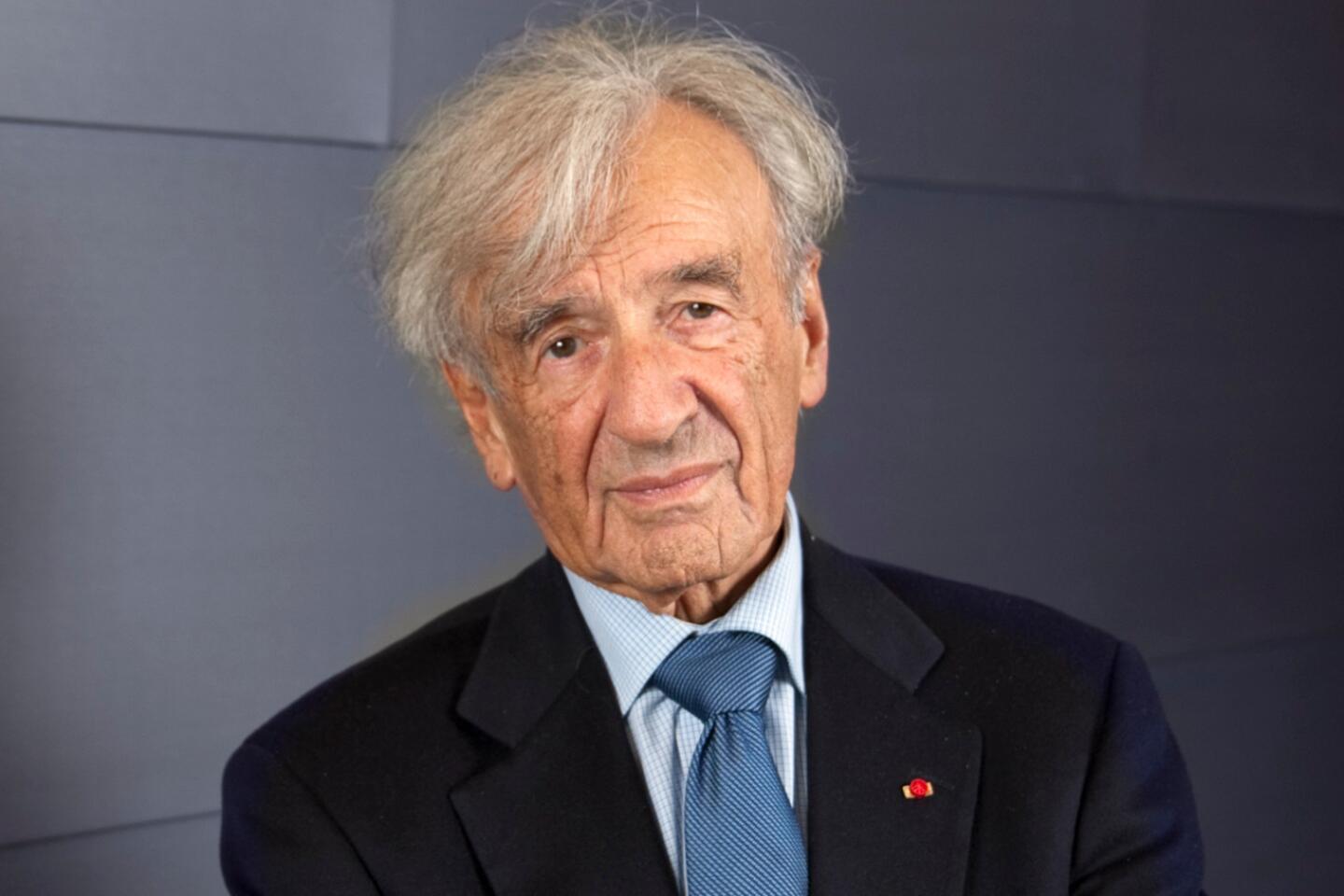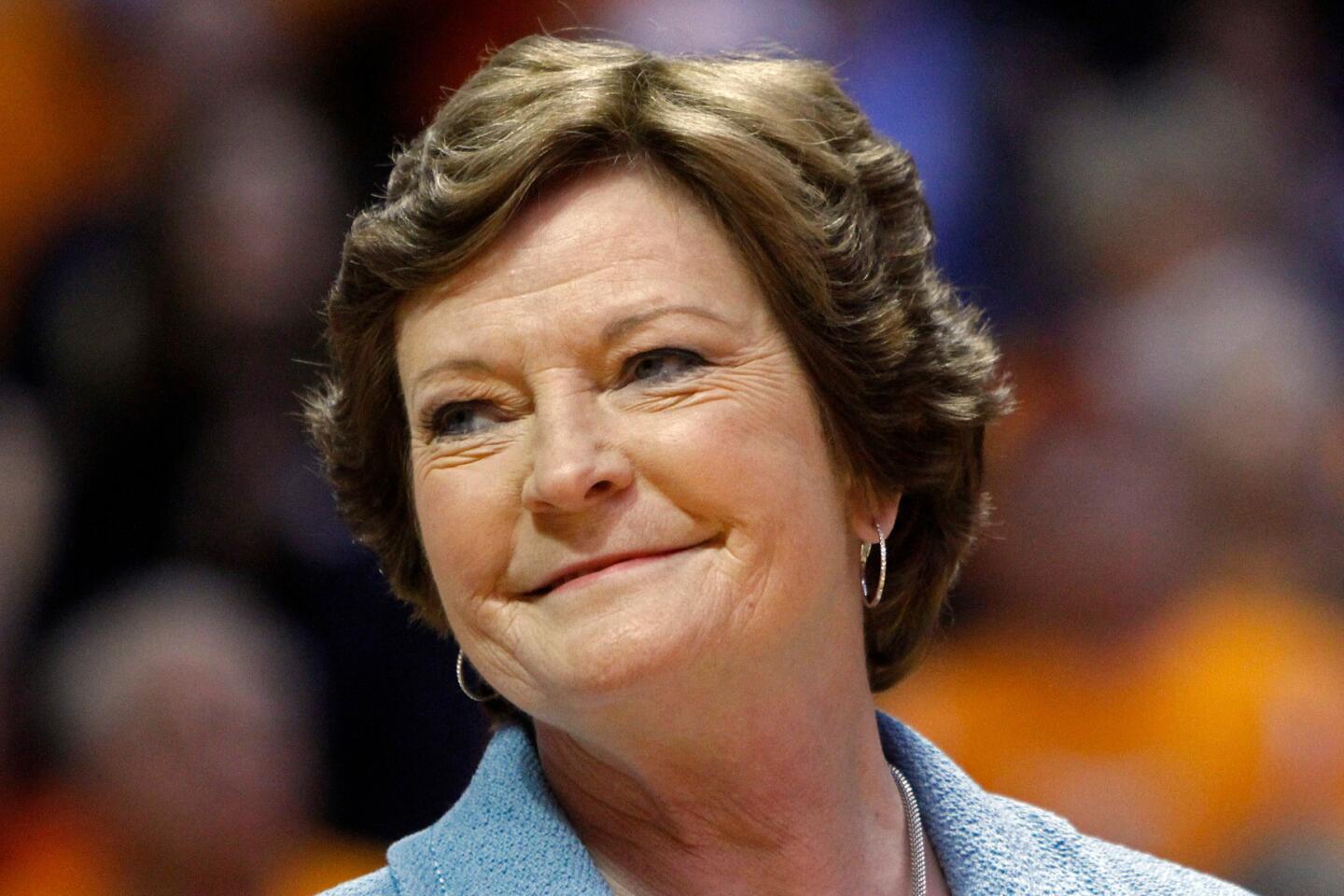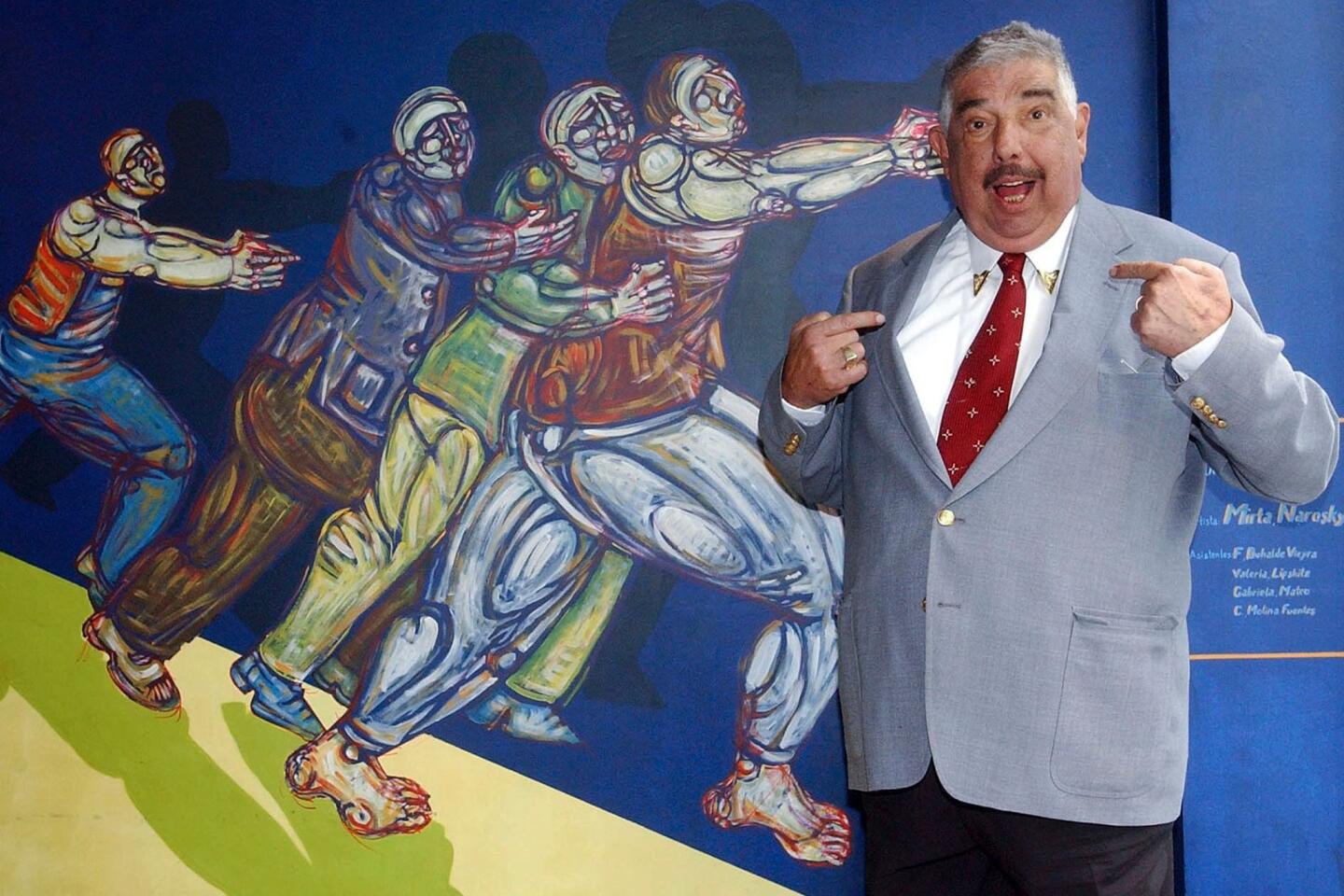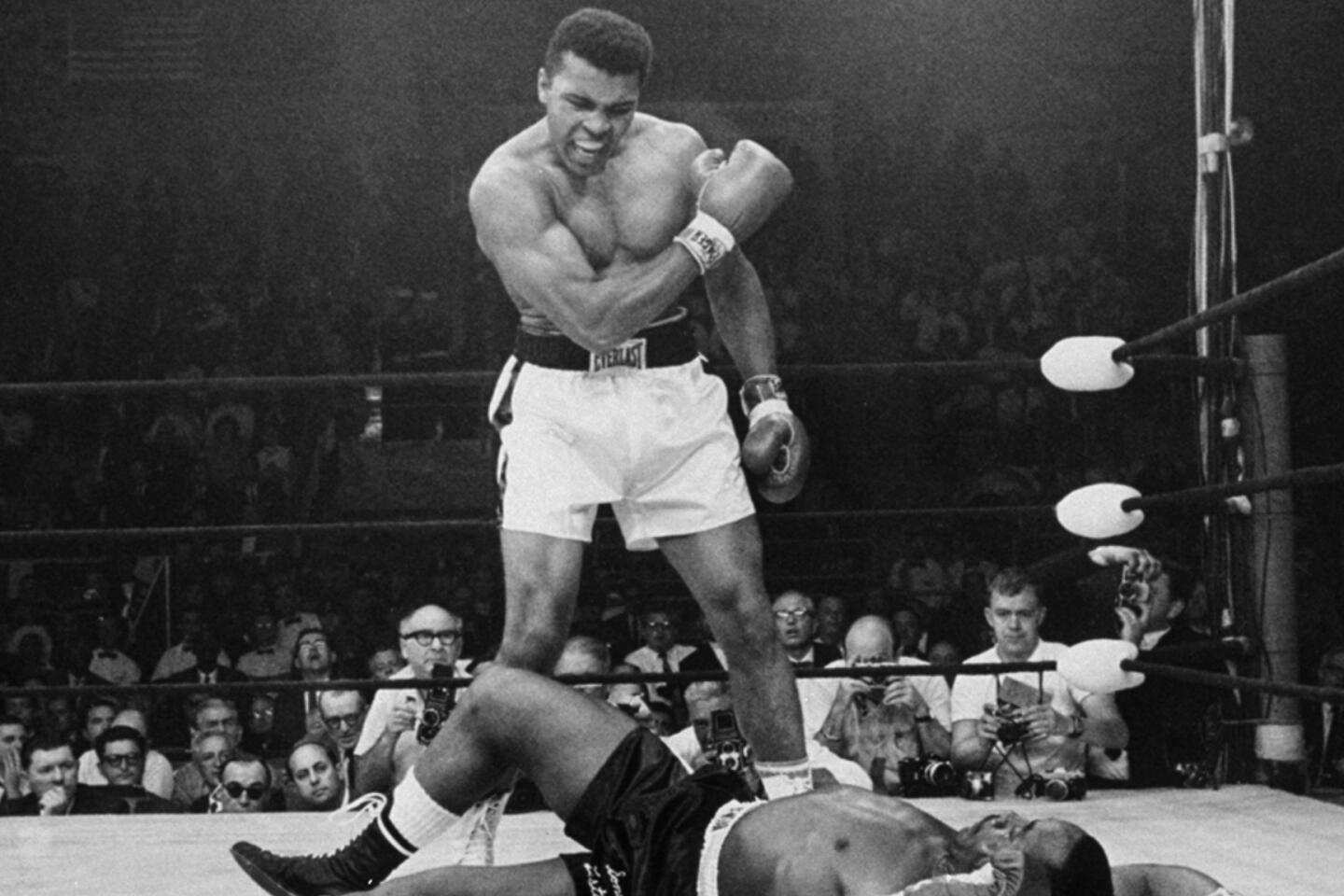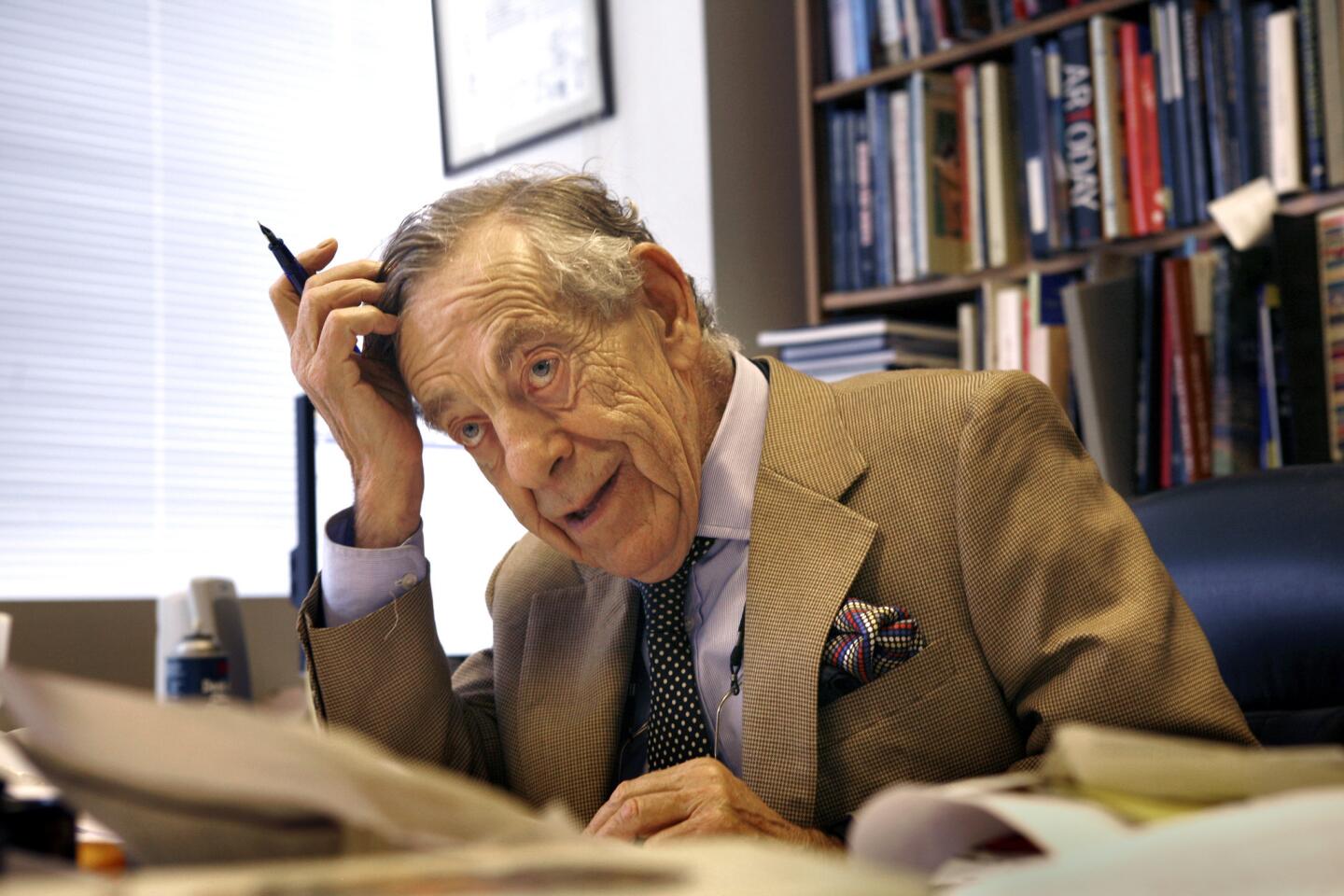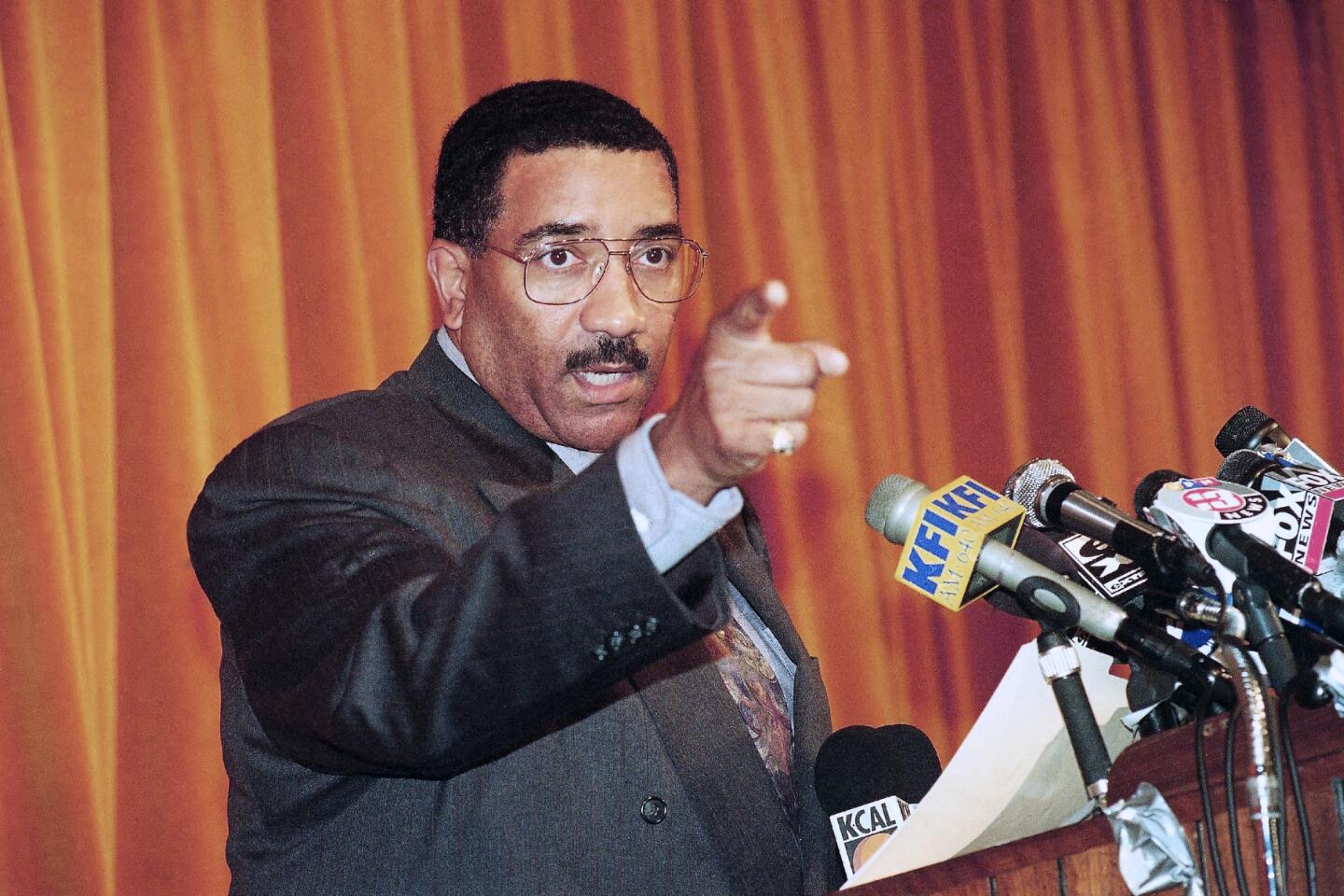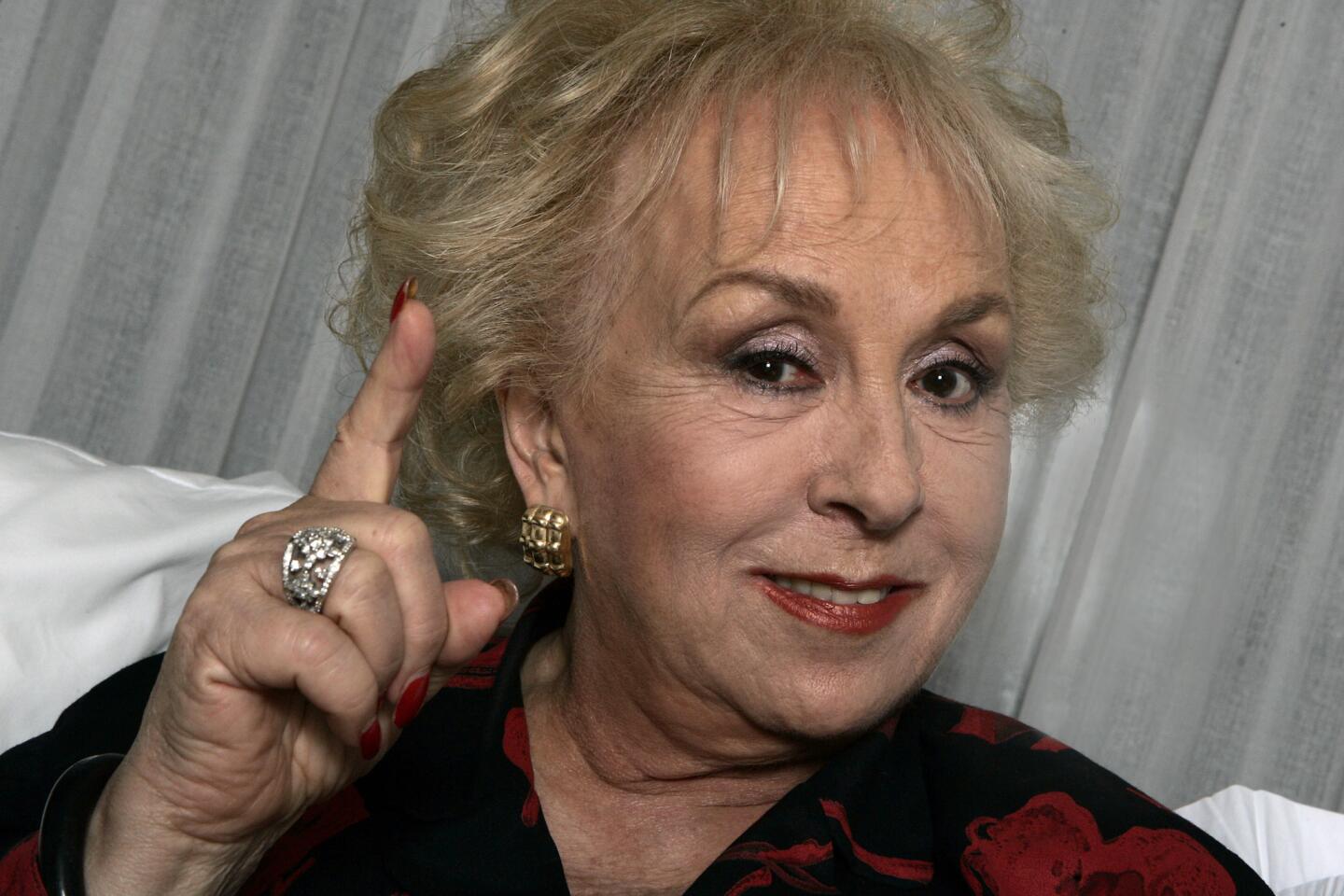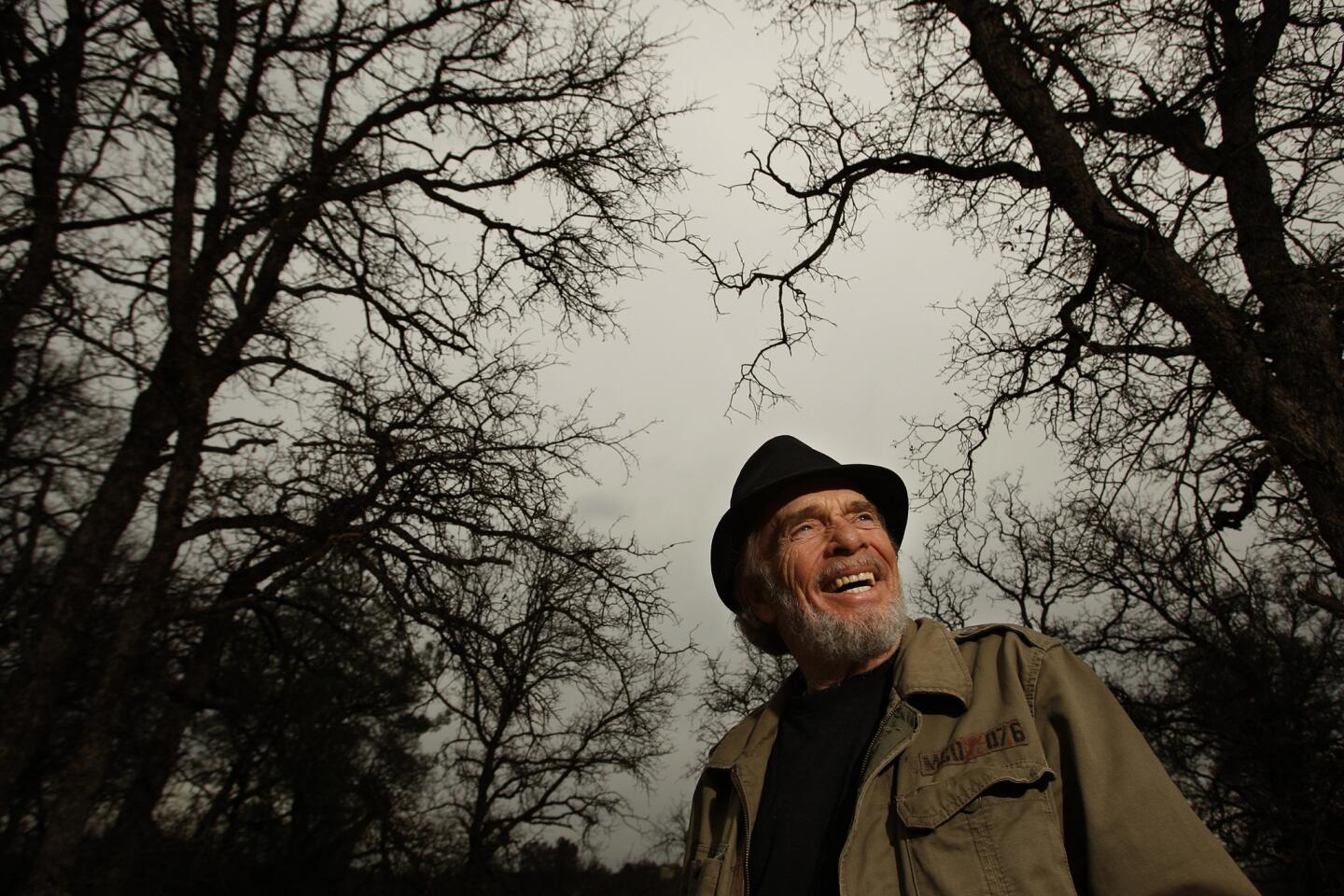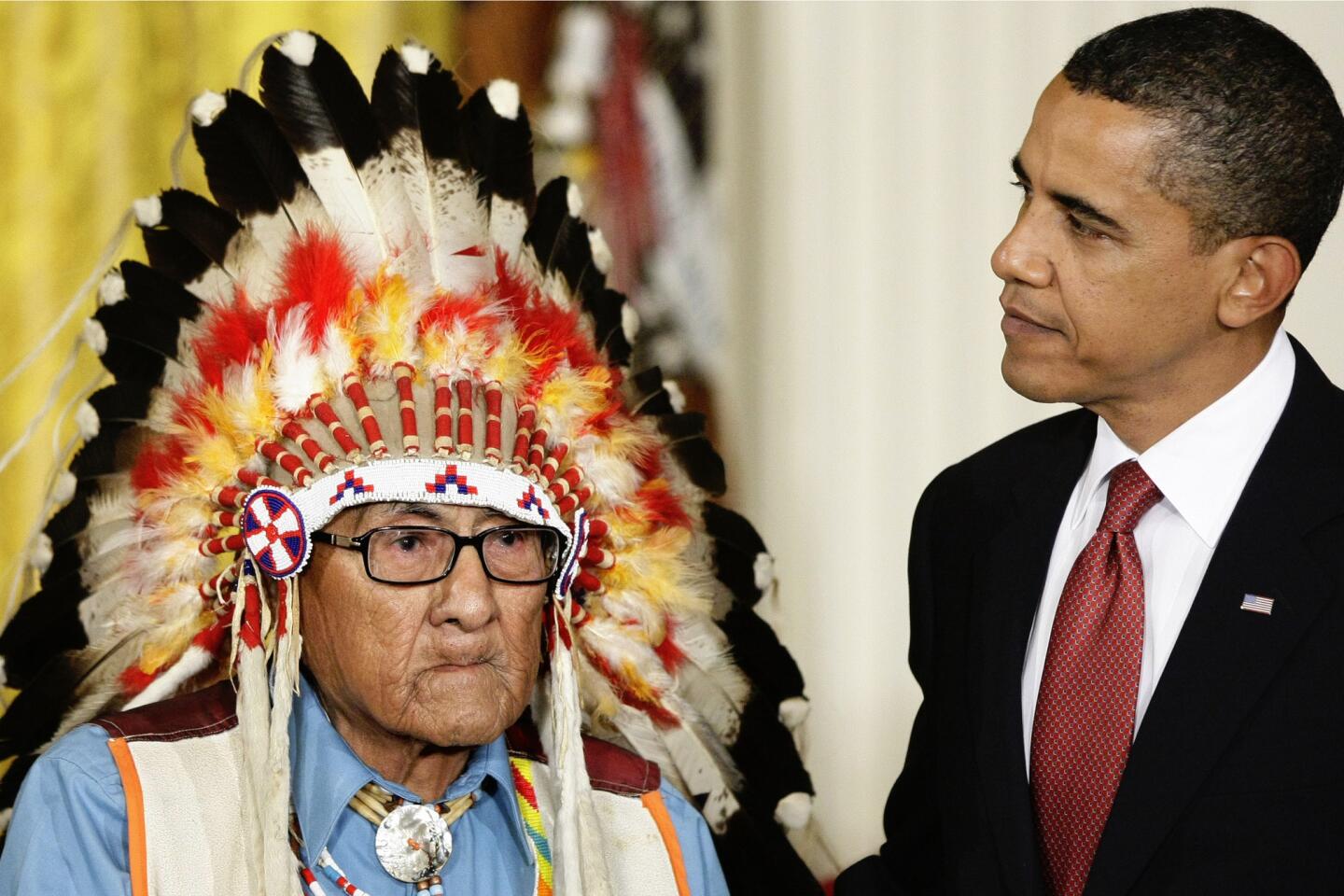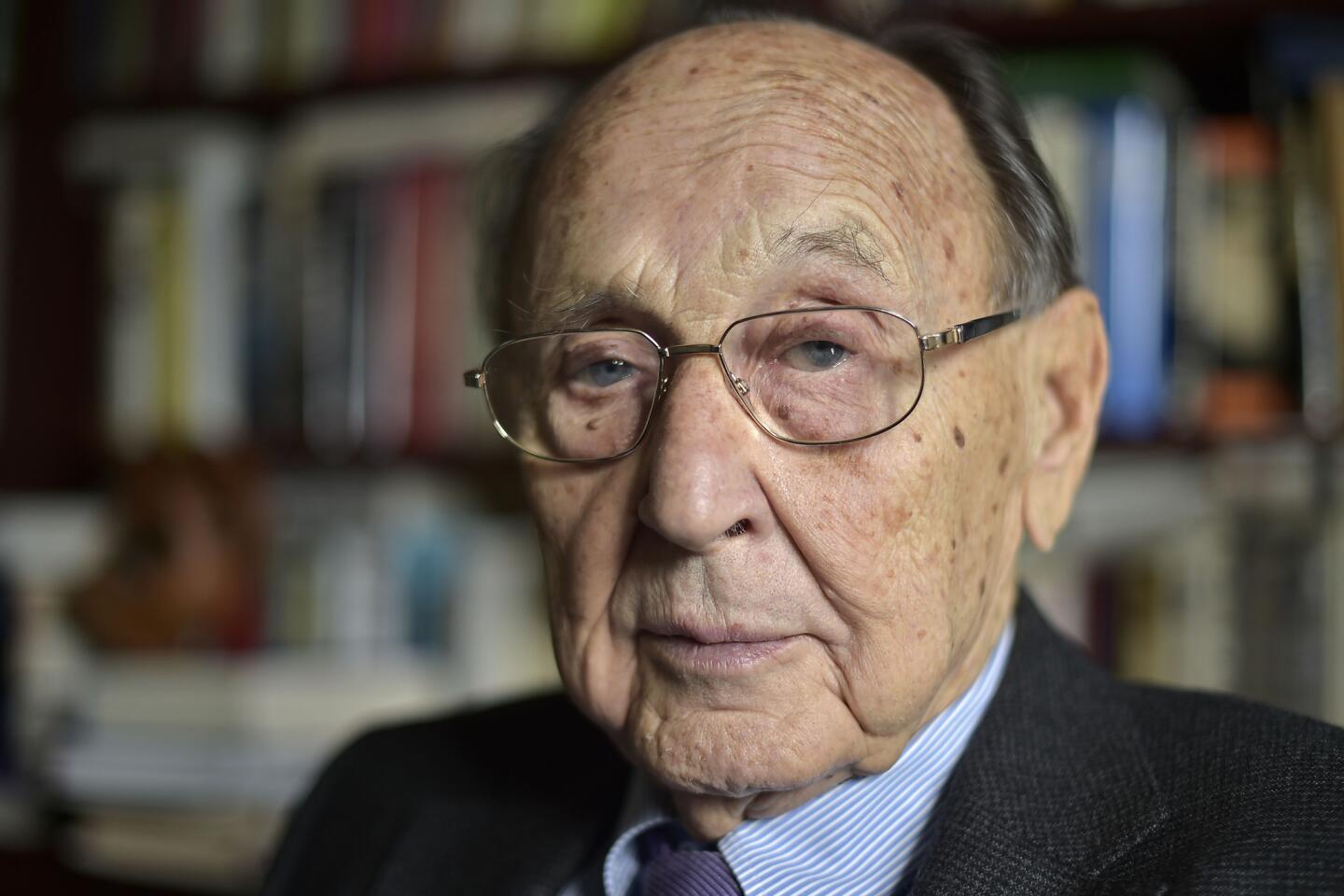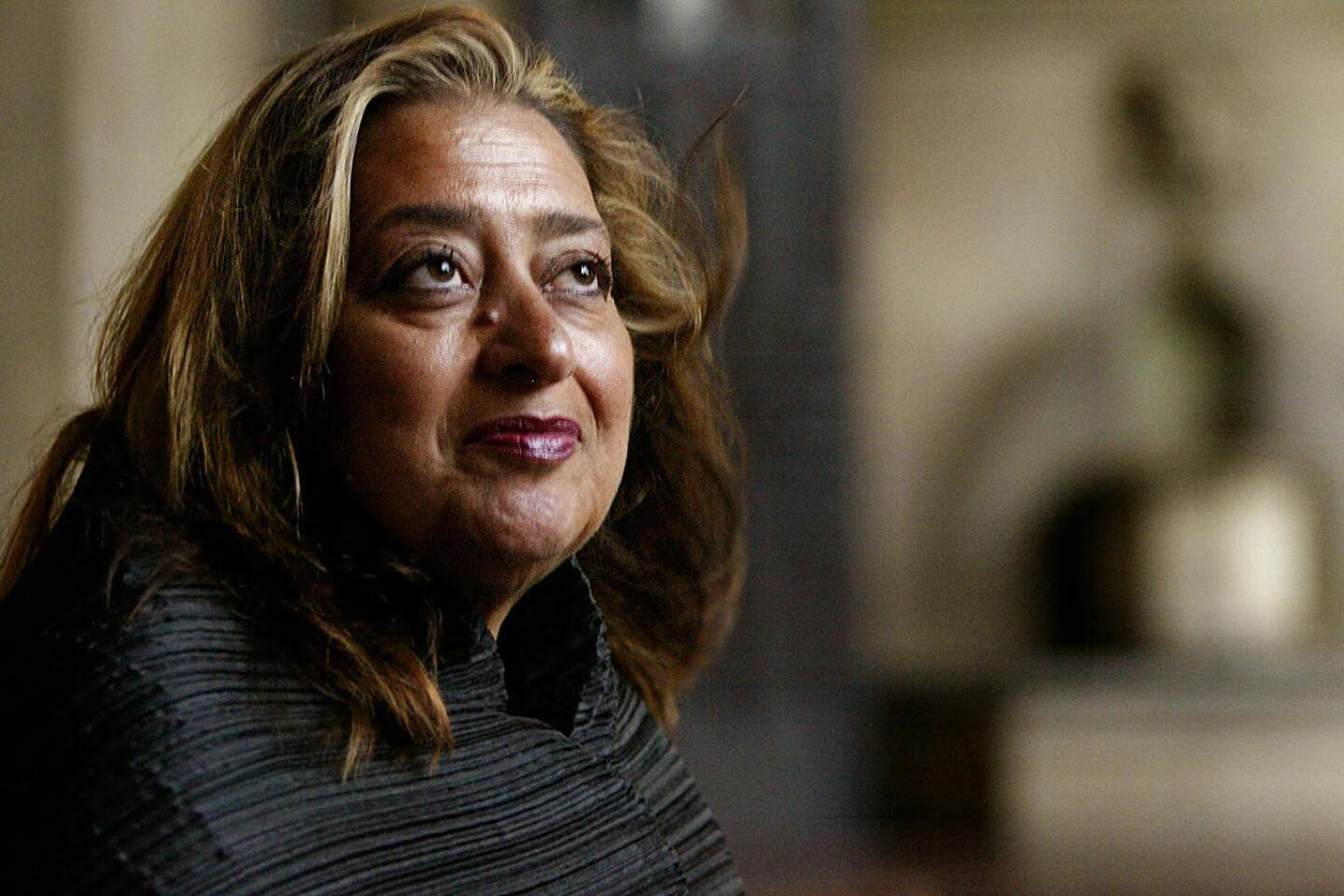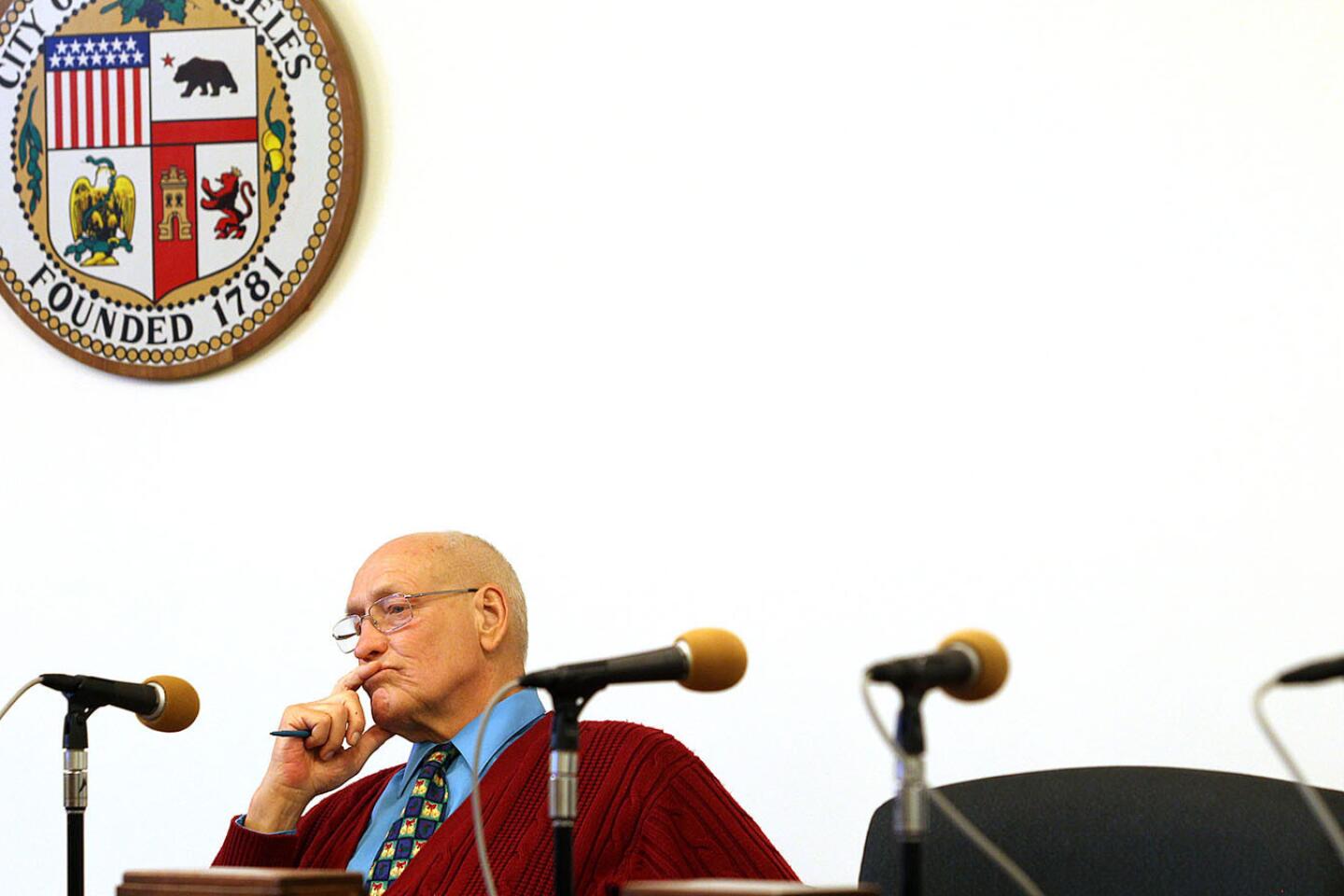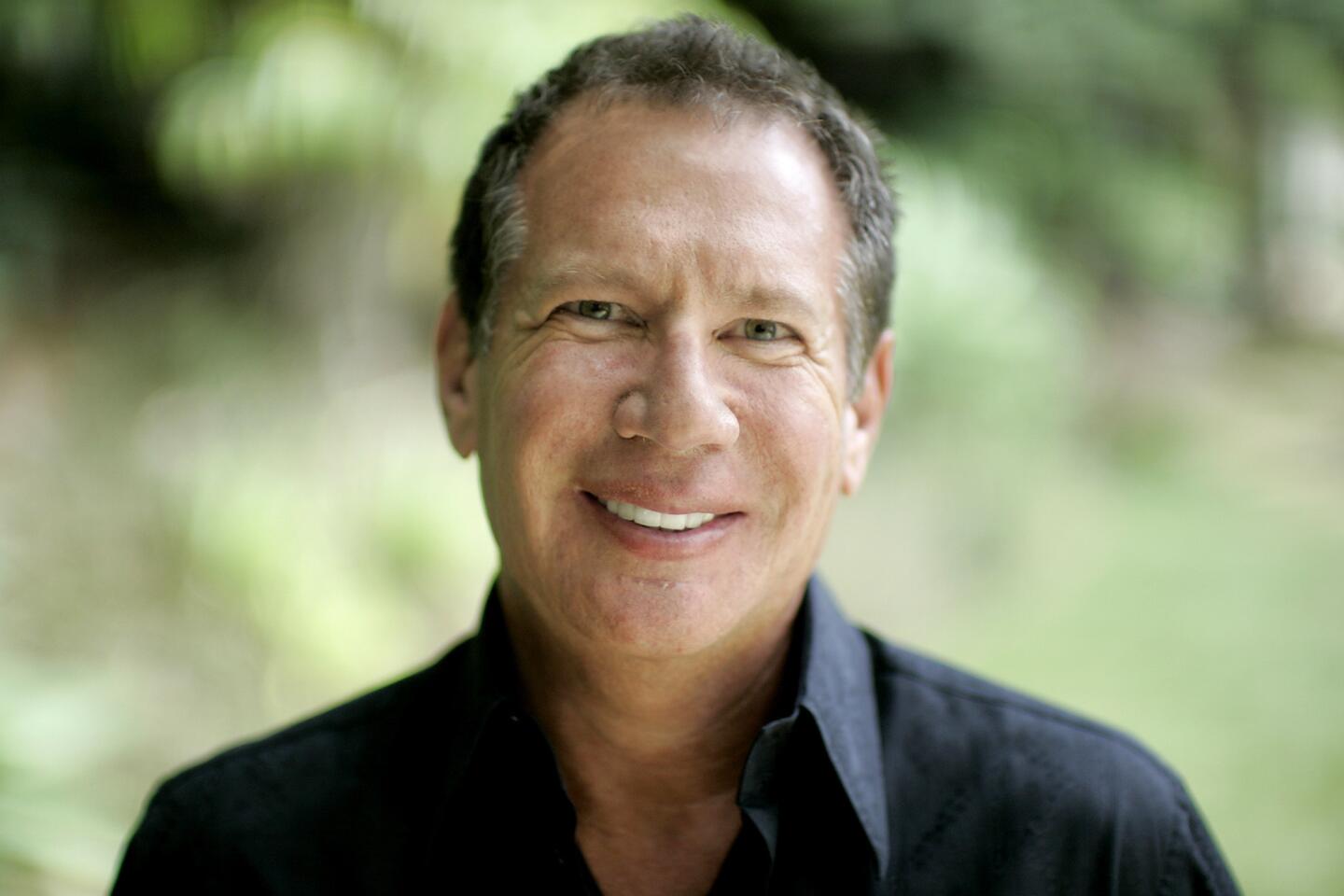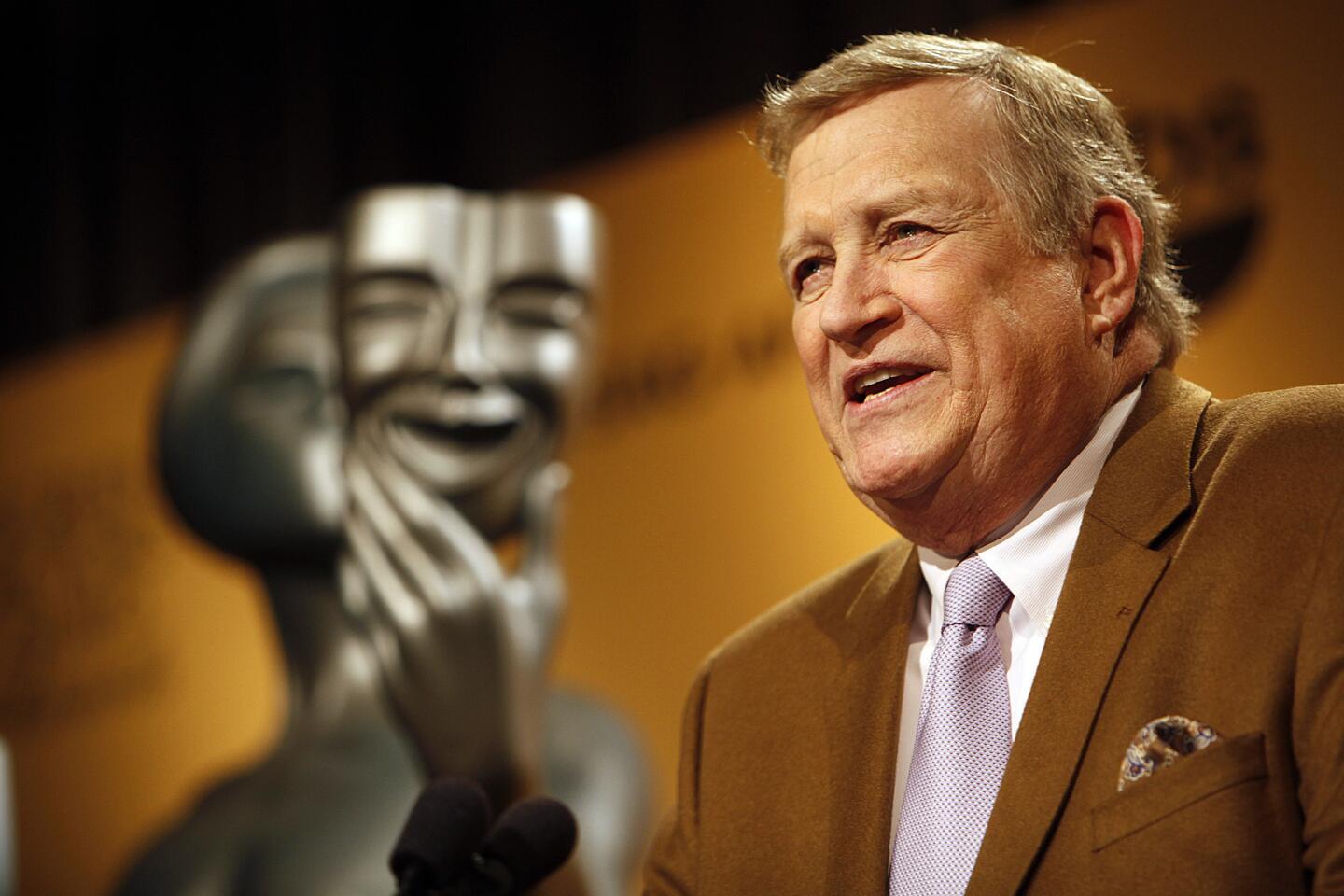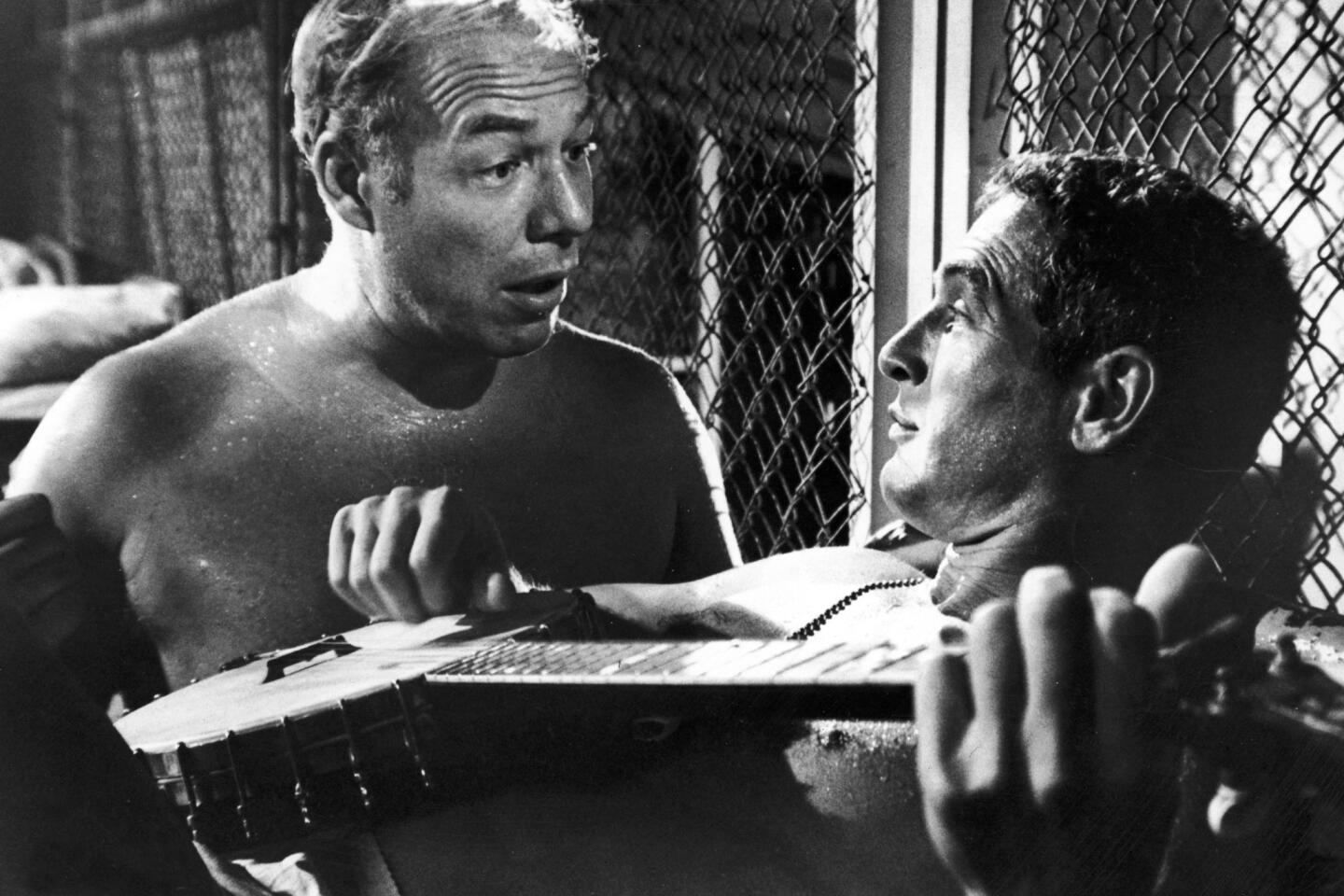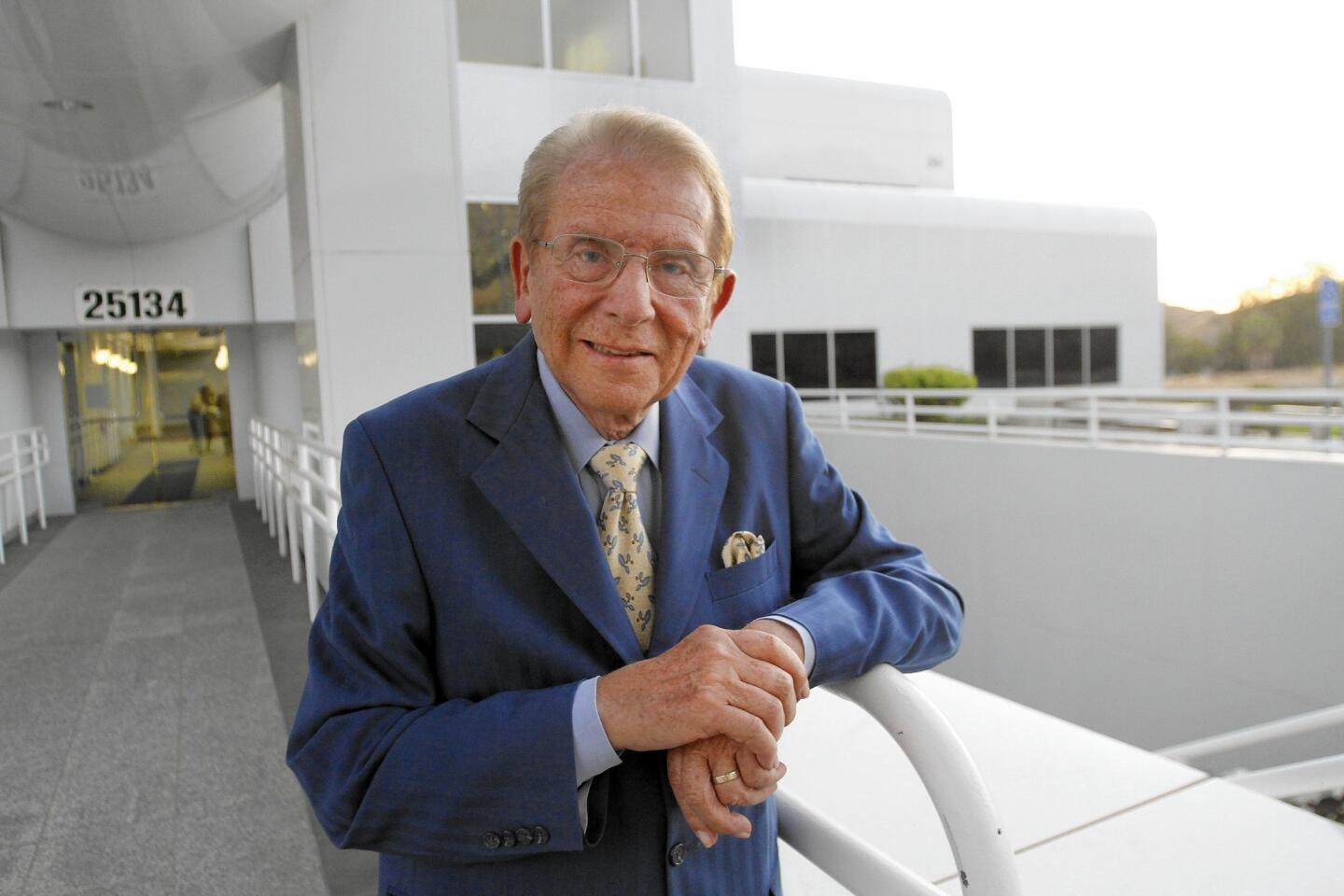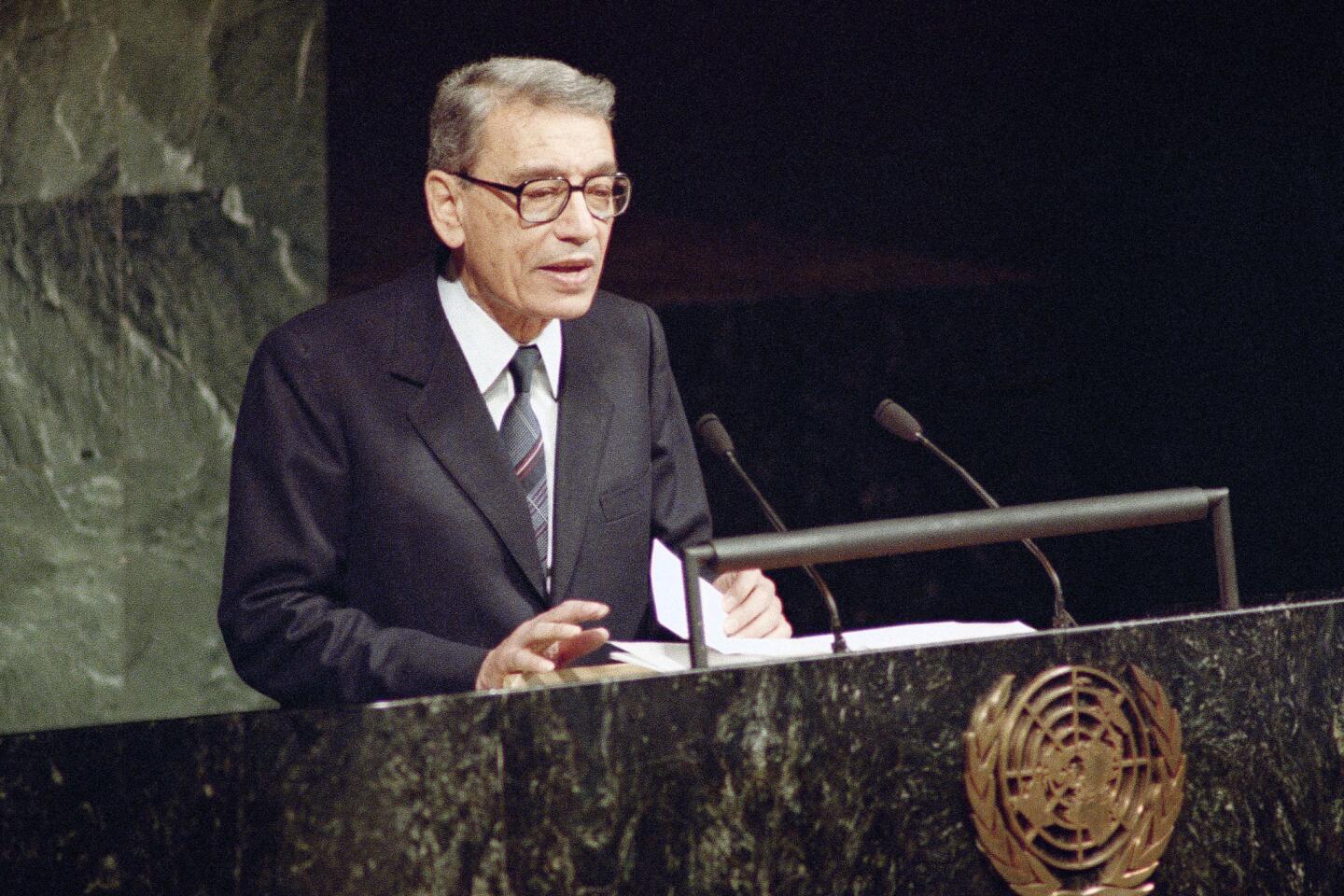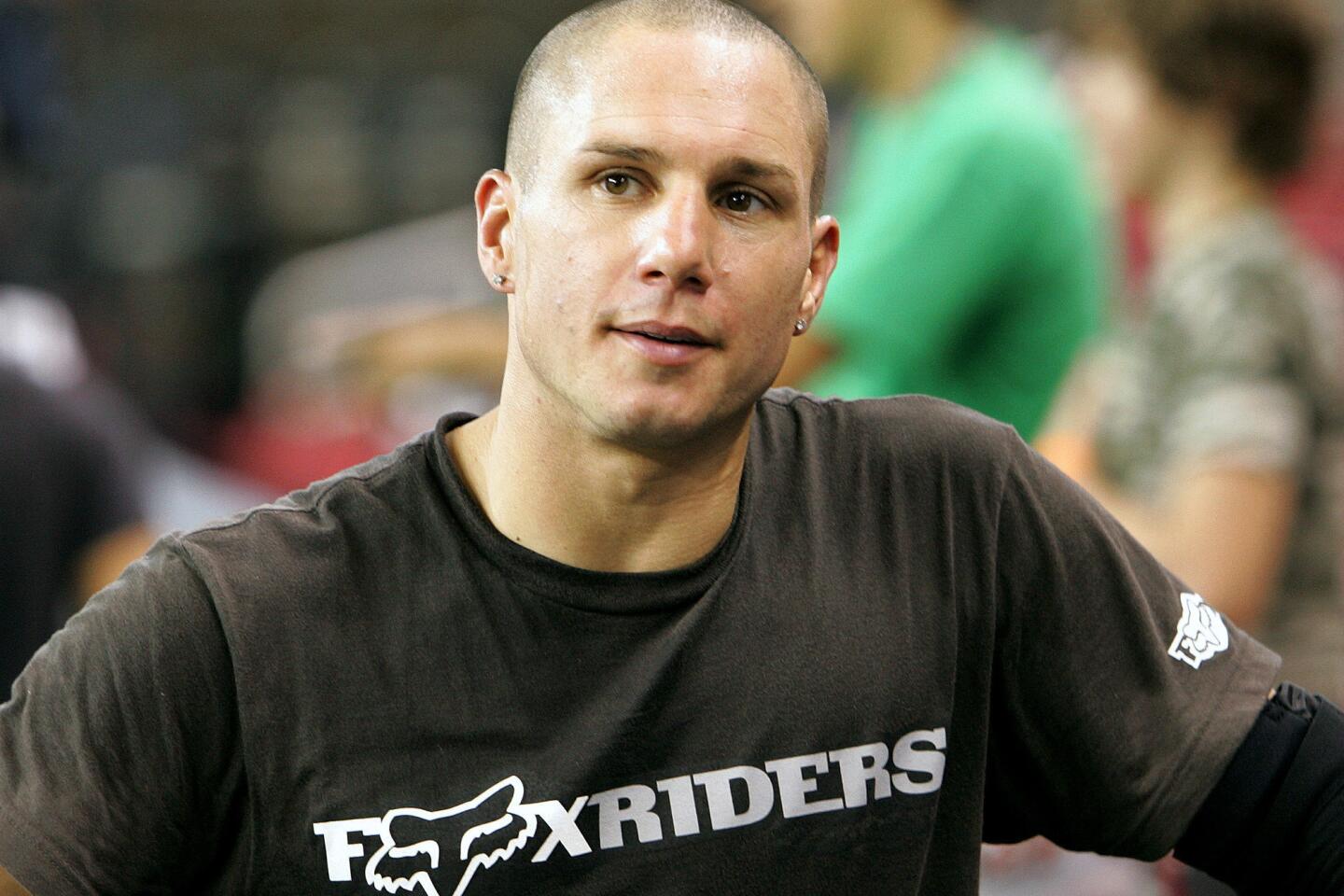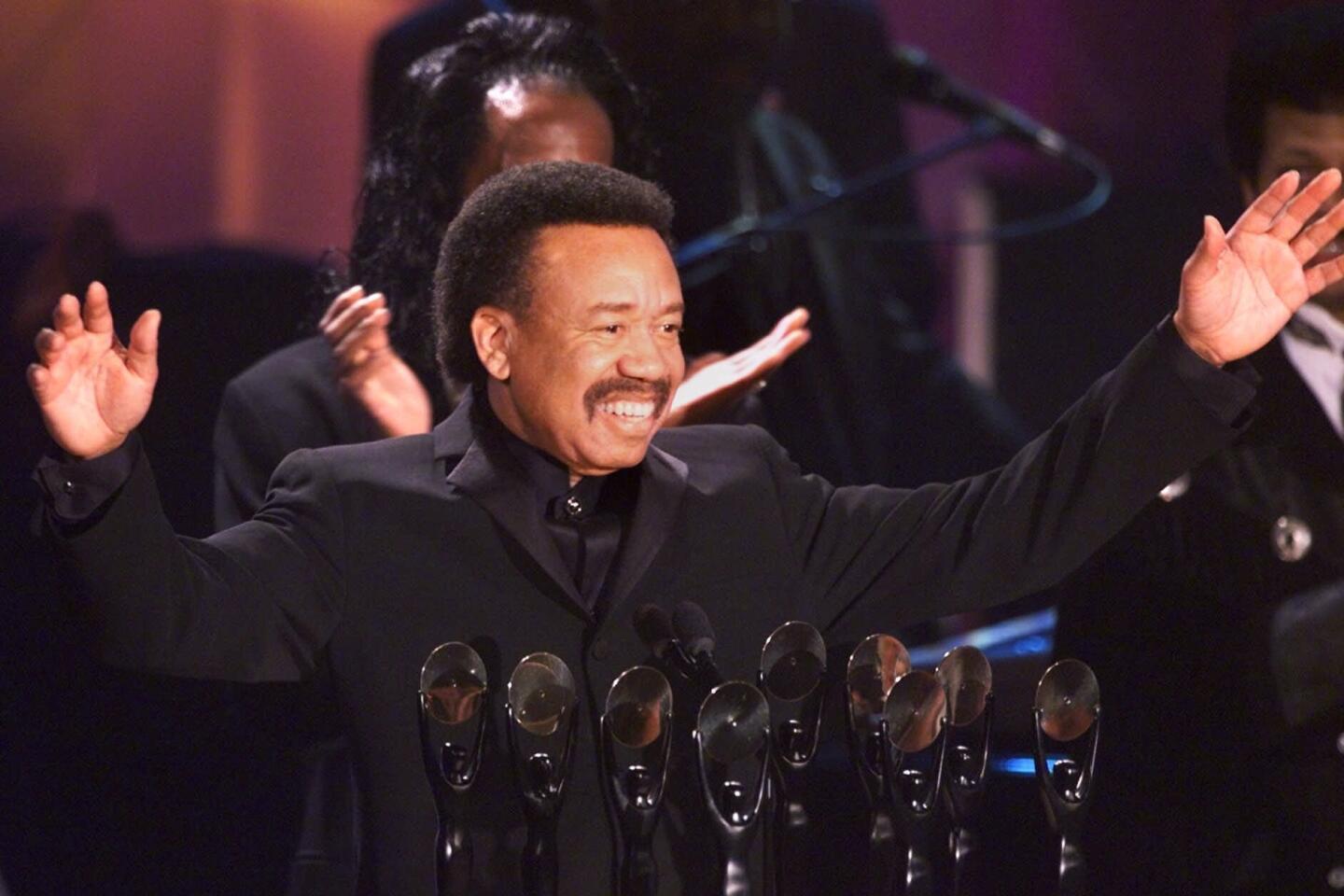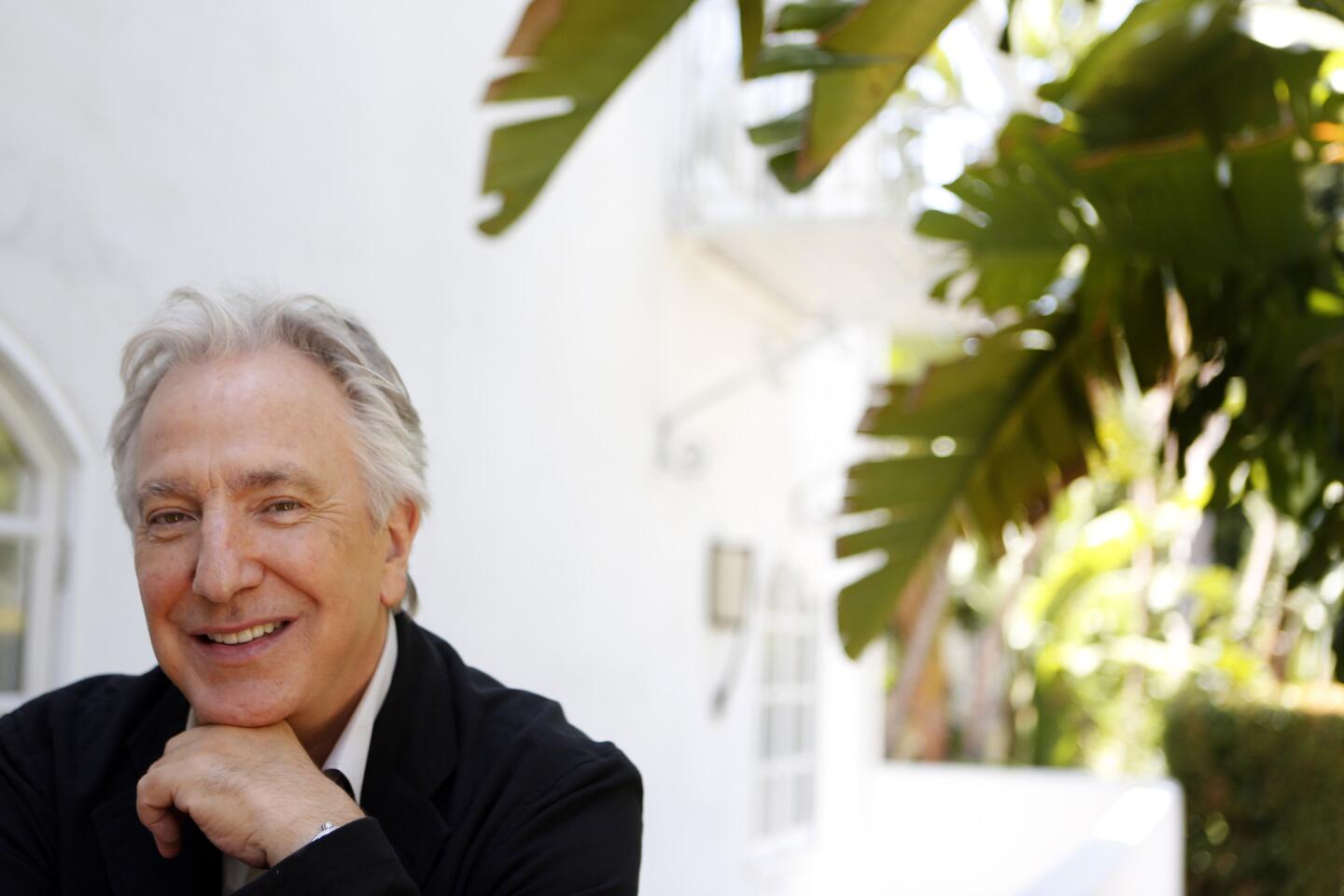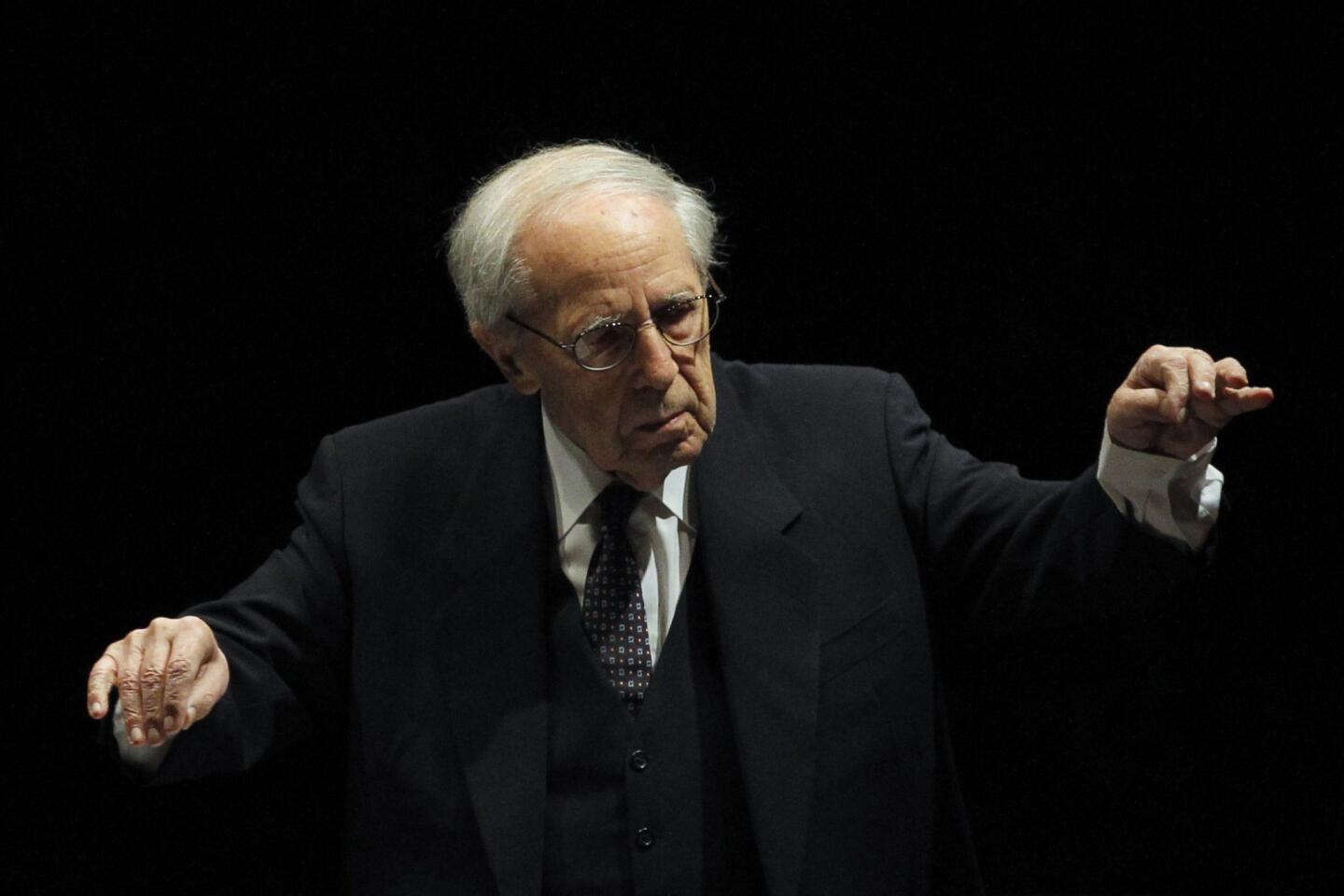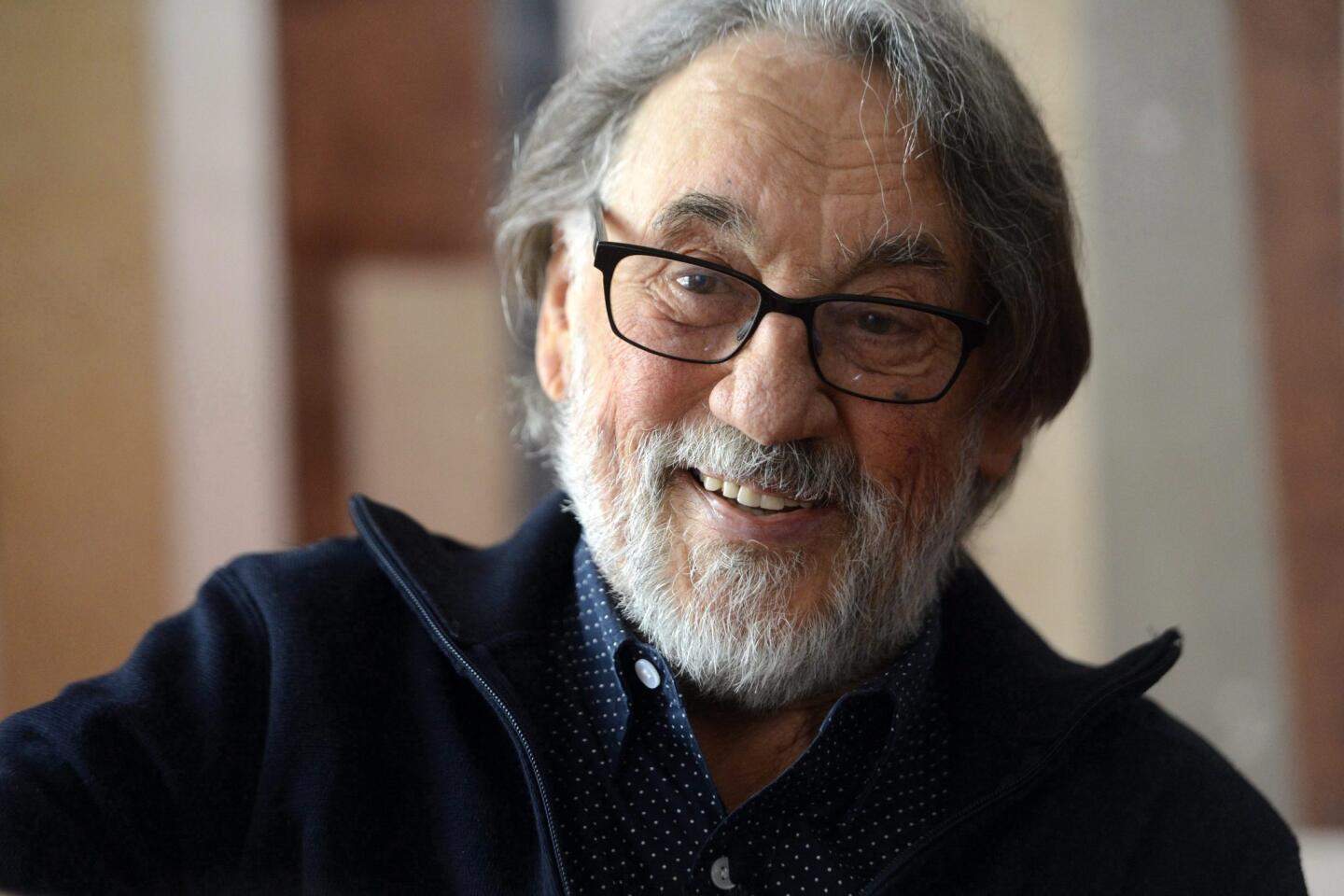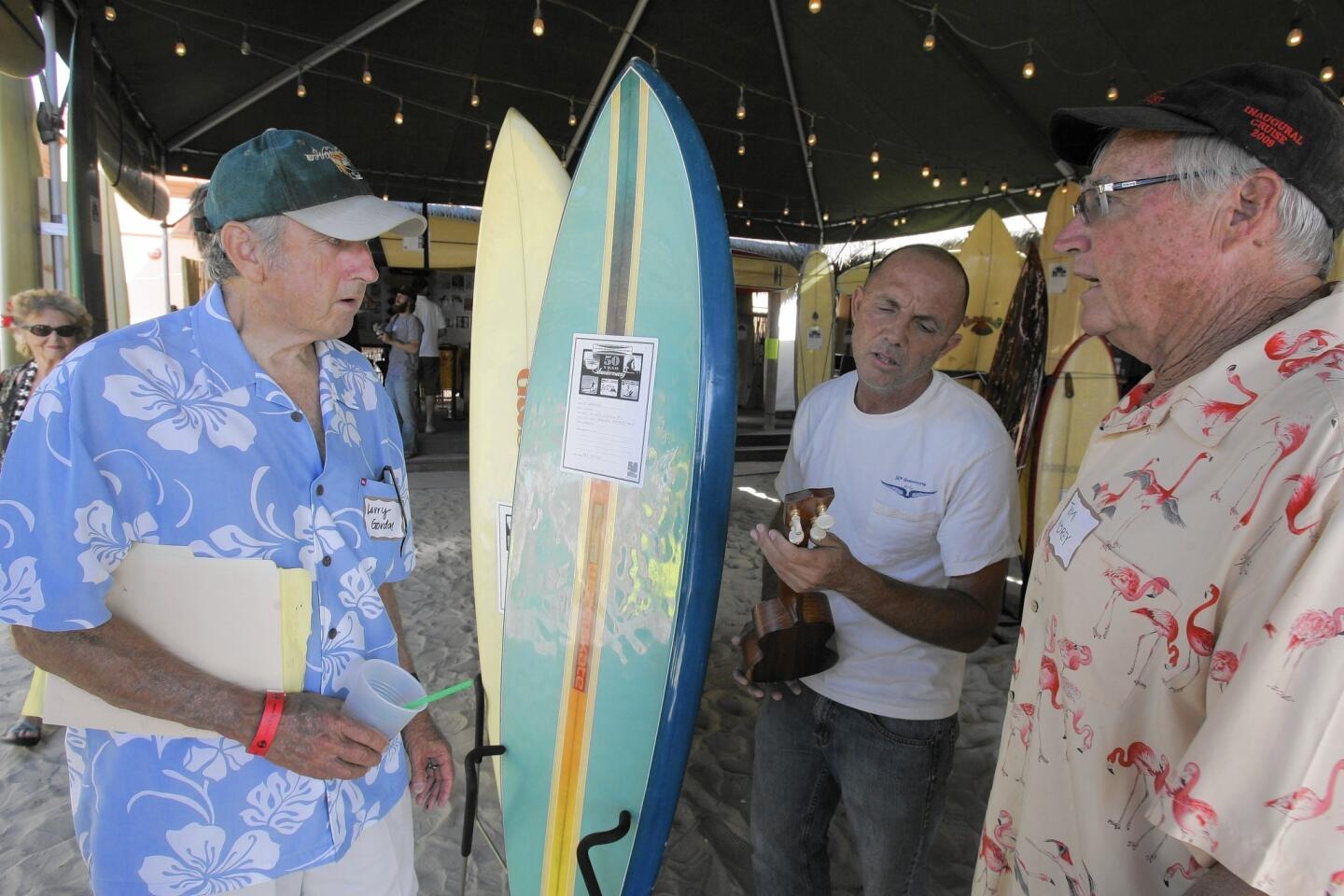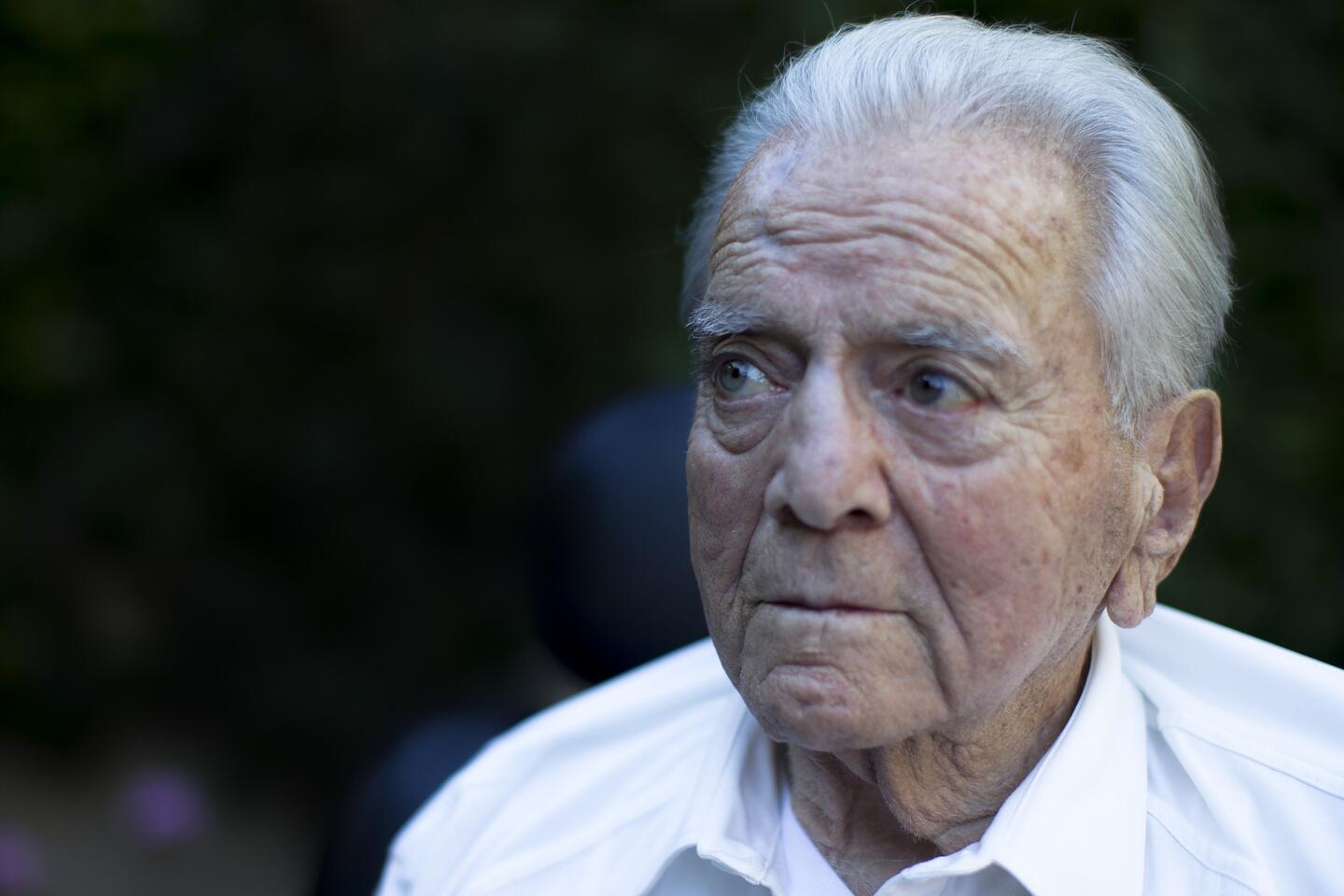Gordon Davidson, the Center Theatre Group impresario who launched, defined and for 38 years personified Los Angeles’ flagship theater, the Mark Taper Forum, has died, his family said. He was 83.
Davidson died Sunday night after collapsing at dinner, said his wife, Judi Davidson.
Starting in 1967, Davidson’s artistic vision, professional connections and business savvy were indispensable in transforming L.A. from a passive backwater where theatergoers largely consumed the Broadway touring shows to a wellspring for new works that won Tony Awards and Pulitzer Prizes. He directed more than 40 plays and produced more than 300 works for the Center Theatre Group, and he relished the spotlight as L.A. theater’s most prominent public face until his retirement in 2005.
As Gil Cates, producing director of the Geffen Playhouse, once put it, “He was the Moses of theater in Los Angeles.”
“His whole body of work at the Taper made me feel it was the place to go,” actor Alan Alda said in 2004, as Davidson prepared to step down. “He puts on plays that are entertaining, that tickle your mind, that have substance.” In 2001, Davidson directed Alda as physicist Richard Feynman in Peter Parnell’s “QED.” Having seen the Taper’s boss in action over the six years it took to create, Alda said, “as far as I can tell, he does theater from the breakfast table all the way through to the midnight snack.”
1/61
Wong’s masterly touch brought a poetic quality to Disney’s “Bambi” that has helped it endure as a classic of animation. The pioneering Chinese American artist influenced later generations of animators. Full obituary
(Peter Brenner / Handout) 2/61
After bursting onto the scene opposite Gene Kelly in the classic 1952 musical “Singin’ in the Rain,” Reynolds became America’s Sweetheart and a potent box office star for years. Her passing came only one day after her daughter, Carrie Fisher, died at the age of 60. Reynolds was 84. Full obituary
(John Rooney / Associated Press) 3/61
George Michael, the English singer-songwriter who shot to stardom in the 1980s as half of the pop duo Wham!, went on to become one of the era’s biggest pop solo artists with hits such as “Faith” and “I Want Your Sex.” He was 53. Full obituary
(Francois Mori / Associated Press) 4/61
The thoracic surgeon came up with an anti-choking technique in 1974. So simple it could be performed by children, the eponymous maneuver made Heimlich a household name. He was 96. Full obituary
(Al Behrman / Associated Press) 5/61
The hugely popular south Indian actress later turned to politics and became the highest elected official in the state of Tamil Nadu. She was 68. Full obituary
(AFP / Getty Images) 6/61
Best known for her portrayal of Carol Brady on “The Brady Bunch,” Henderson
portrayed an idealized mother figure for an entire generation. Her character was the center of the show, cheerfully mothering her brood in an era when divorce was becoming more common. She was 82. Full obituary
(Jay L. Clendenin / Los Angeles Times) 7/61
Dubbed “Dr. Wonderful” by the media, the Texas surgeon performed the first successful heart transplant in the United States and the world’s first implantation of a wholly artificial heart. He also founded the Texas Heart Institute in Houston. He was 96. Full obituary
(David J. Phillip / Associated Press) 8/61
The prominent Los Angeles attorney went from defending his father, a powerful mob boss, to representing celebrities, corrupt businessmen, drug kingpins and the so-called Hollywood Madam, Heidi Fleiss. He was 70. Full obituary
(Ken Hively / Los Angeles Times) 9/61
The award-winning journalist wrote for the Washington Post and the New York Times before becoming an anchor of public television news programs “PBS NewsHour” and “Washington Week.” Her career also included moderating the vice presidential debates in 2004 and 2008. She was 61. Full obituary
(Brendan Smialowski / Getty Images) 10/61
Instantly recognizable for his long white mane and a rich, hearty voice, Russell sang, wrote and produced some of rock ‘n’ roll’s top records. His hits included “Delta Lady,” “Roll Away the Stone,” “A Song for You” and “Superstar.” He was 74. Full obituary
(Luis Sinco / Los Angeles Times) 11/61
The singer-songwriter’s literary sensibility and elegant dissections of desire made him one of popular music’s most influential and admired figures for four decades. Cohen is best known for his songs such as “Hallelujah,” “Suzanne” and “Bird on the Wire.” He was 82. Full obituary
(Joel Saget / AFP / Getty Images) 12/61
Reno was the first woman to serve as United States attorney general. Her unusually long tenure began with a disastrous assault on cultists in Texas and ended after the dramatic raid that returned Elian Gonzalez to his Cuban father. She was 78. Full obituary
(Dennis Cook / Associated Press) 13/61
The 1960s radical was in the vanguard of the movement to stop the Vietnam War and became one of the nation’s best-known champions of liberal causes. He was 76. Full obituary
(George Brich / Associated Press) 14/61
Tabei was the first woman to climb Mount Everest in 1975. In 1992, she also became the first woman to complete the “Seven Summits,” reaching the highest peaks of the seven continents. She was 77. Full obituary
(AFP / Getty Images) 15/61
Nixon was the creative force behind the popular soap operas “One Life to Live” and “All My Children.” She was a pioneer in bringing serious social issues, like racism, AIDS and prostitution, to daytime television. She was 93. Full obituary
(Chris Pizzello / Associated Press) 16/61
The former Israeli president was one of the founding fathers of Israel. The Nobel peace prize laureate was an early advocate of the idea that Israel’s survival depended on territorial compromise with the Palestinians. He was 93. Full obituary
(AFP / Getty Images) 17/61
A seven-time professional major tournament champion, Palmer revolutionized sports marketing as it is known today, and his success contributed to increased incomes for athletes across the sporting spectrum. He was 87. Full obituary
(David J. Phillip / Associated Press) 18/61
Known as the Vatican’s exorcist, Amorth, a Roman Catholic priest, helped promote the ritual of banishing the devil from people or places. He was 91. Full obituary
(AFP / Getty Images) 19/61
The American playwright was known for works such as “The Zoo Story,” “The Sandbox,” “Who’s Afraid of Virginia Woolf?” and “A Delicate Balance.” He was awarded the Pulitzer Prize for drama three times. He was 88. Full obituary
(Jennifer S. Altman / For the Times) 20/61
The ska pioneer and Jamaican music legend recorded thousands of records, including such hits as “Al Capone” and “Judge Dread.” He helped ignite the ska movement in England, and later helped carry it into the rock-steady era in the mid-1960s. He was 78. Full obituary
(Larry Ellis / Getty Images) 21/61
Known as “the first lady of anti-feminism,” Schlafly was a political activist who galvanized grass-roots conservatives to help defeat the Equal Rights Amendment and, in ensuing decades, effectively push the Republican Party to the right. She was 92. Full obituary
(Christine Cotter / Los Angeles Times) 22/61
O’Brian helped tame the Wild West as the star of TV’s “The Life and Legend of Wyatt Earp” and was the founder of a long-running youth leadership development organization. “Wyatt Earp” became a top 10-rated series and made O’Brian a household name. He was 91. Full obituary
(Ricardo DeAratanha / Los Angeles Times) 23/61
Jerry Heller, the early manager of N.W.A, was an important and colorful personality in the emerging West Coast rap scene in the 1980s. Heller was 75. Full obituary
(Lori Shepler / Los Angeles Times) 24/61
Two-time Oscar nominee Gene Wilder brought a unique blend of manic energy and world-weary melancholy to films as varied as 1971’s children’s movie “Willy Wonka & the Chocolate Factory” and the 1980 comedy “Stir Crazy.” He was 83. Full obituary
(AFP / Getty Images) 25/61
The beloved top-selling Mexican singer wooed crowds on both sides of the border with ballads of love and heartbreak for more than four decades. He was 66. Full obituary
(Wilfredo Lee / Associated Press) 26/61
Known as the “queen of knitwear,” Sonia Rykiel became a fixture of Paris’ fashion scene, starting in 1968. French President Francois Hollande praised her as “a pioneer” who “offered women freedom of movement.” She was 86. Full obituary
(Thibault Camus / Associated Press) 27/61
The conservative political commentator hosted the long-running weekly public television show “The McLaughlin Group” that helped alter the shape of political discourse since its debut in 1982. He was 89. Full obituary
(Kevin Wolf / Associated Press) 28/61
Best-known for his post-bop recordings for Blue Note Records in the 1960s and 1970s, the inventive jazz vibraphonist played with a litany of jazz greats as both bandleader and sideman during a career spanning more than 50 years. He was 75. Full obituary
(Scott Chernis / Associated Press) 29/61
The British actor, who was 3-foot-8, gave life to the “Star Wars” droid R2-D2, one of the most beloved characters in the space-opera franchise and among the most iconic robots in pop culture history. He was 81. Full obituary
(Reed Saxon / Associated Press) 30/61
For many in L.A., Folsom was the face of the Parent Teacher Student Assn., better known as the PTSA or PTA. He served as the official and unofficial watchdog over the Los Angeles Unified School District and wrote about his experiences in his blog. He was 69. Full obituary
(Mark Boster / Los Angeles Times) 31/61
Fountain combined the Swing Era sensibility of jazz clarinetist Benny Goodman with the down-home, freewheeling style characteristic of traditional New Orleans jazz to become a national star in the 1950s as a featured soloist on the “The Lawrence Welk Show.” He was 86. Full obituary
(Luis Sinco / Los Angeles Times) 32/61
Lowery was a pioneer in efforts to help people suffering from poverty, addiction and mental illness move out of tents and cardboard boxes on Los Angeles’ sidewalks and into supportive housing. She was 70. Full obituary
(Lawrence K. Ho / Los Angeles Times) 33/61
Nixon, a Hollywood voice double, can be heard in place of the leading actresses in such classic movie musicals as “West Side Story,” “The King and I” and “My Fair Lady.” She was 86. Full obituary
(Rob Kim / AFP/Getty Images) 34/61
The department store heir’s widow was a socialite and philanthropist who hobnobbed with the world’s elite, epitomized high fashion and was best friends with former first lady Nancy Reagan. She was 93. Full obituary
(Evan Agostini / Associated Press) 35/61
The author and teacher was long established as a leading literary figure of Southern California. Her works include “Golden Days,” “There Will Never Be Another You” and her memoir “Dreaming, Hard Luck and Good Times in America.” She was 82. Full obituary
(Ricardo DeAratanha / Los Angeles Times) 36/61
The Nazi concentration camp survivor won the Nobel in 1986 for his message “of peace, atonement and human dignity.” “Night,” his account of his year in death camps, is regarded as one of the most powerful achievements in Holocaust literature. He was 87. Full obituary
(Allen J. Schaben / Los Angeles Times) 37/61
One of the greatest basketball coaches of any gender or generation, Summitt spent 38 years as coach of the University of Tennessee women’s basketball team before dementia forced her early retirement. She was 64. Full obituary
(Wade Payne / Associated Press) 38/61
The iconic New York Times fashion photographer darted around New York on a humble bicycle to cover the style of high society grand dames and downtown punks with equal verve. He was 87. Full obituary
(Mark Lennihan / Associated Press) 39/61
Aguirre was best known for his portrayal of the towering “Profesor Jirafales,” the likable and often disrespected giraffe teacher on the 1970s-era hit show “El Chavo del Ocho.” The screwball comedy helped usher in an era of edgier comedy in Mexico and elsewhere. Aguirre was 82. Full obituary
(AFP / Getty Images) 40/61
The three-time heavyweight boxing champion’s brilliance in the ring and bravado outside it made his face one of the most recognizable in the world. He was 74. Full obituary
(John Rooney / Associated Press) 41/61
Like Walter Cronkite and Edward R. Murrow, the CBS newsman became part of a group of journalists who set the tone for storytelling on television. He was on “60 Minutes” for 46 years, holding the longest tenure on prime-time television of anyone in history. He was 84. Full obituary
(Carolyn Cole / Los Angeles Times) 42/61
The first African American chief of the Los Angeles Police Department, Williams steadied the agency in the tumultuous wake of the 1992 riots but was distrusted as an outsider by many officers and politicians. He was 72. Full obituary
(Nick Ut / Associated Press) 43/61
Best known for her role as Marie Barone on “Everybody Loves Raymond,” Roberts won four Emmys for her work on that show and one for her work on “St. Elsewhere.” She was 90. Full obituary
(Ken Hively / Los Angeles Times) 44/61
The country music legend sang of his law-breaking Bakersfield youth and penned a stream of No. 1 hits. He owed some of his fame to conservative anthems, including the combative 1969 release “Okie from Muskogee,” which seemed to mock San Francisco’s anti-war hippies. He was 79. Full obituary
(Genaro Molina / Los Angeles Times) 45/61
The acclaimed Native American historian was the last surviving war chief of Montana’s Crow Tribe. President Obama awarded him the Presidential Medal of Freedom in 2009. He was 102. Full obituary
(J. Scott Applewhite / Associated Press) 46/61
Germany’s longest-serving foreign minister brokered an end to the painful 40-year division of his homeland in 1990, but only after persevering for decades through the most tragic and destructive phases of Germany’s 20th century history. He was 89. Full obituary
(Martin Meissner / Associated Press) 47/61
The Iraqi-born British architect was the first woman to win the Pritzker Prize, architecture’s highest honor. She made her mark with buildings such as the London Aquatics Centre, the MAXXI museum for contemporary art in Rome and the innovative Bridge Pavilion in Zaragoza, Spain. She was 65. Full obituary
(Kevork Djansezian / Associated Press) 48/61
The former television talk show host became the first openly gay man to serve on the Los Angeles City Council. He advocated for the homeless, gays and lesbians and other liberal causes. He was 70. Full obituary
(Christina House / For The Times) 49/61
Garry Shandling’s comedic career spanned decades, but he is best known for his role as Larry Sanders, the host of a fictional talk show. His sitcom pushed the boundaries of TV, influencing shows such as “The Office” and “Modern Family.” He was 66. Full obituary.
(Robert Gauthier / Los Angeles Times) 50/61
Ken Howard was president of SAG-AFTRA and an actor known for his role on TV’s ‘The White Shadow.’ He championed the merger of Hollywood’s two largest actors unions, which had a history of sparring. He was 71. Full obituary
(Al Seib / Los Angeles Times) 51/61
The longtime Los Angeles radio disc jockey, whose real name was Art Ferguson, hosted the morning radio show for popular and influential station KHJ-AM in the late 1960s and went on to be a key player in the launch of latter-day powerhouses KROQ-AM and KIIS-FM. He was 71. Full obituary
(Lawrence K. Ho / Los Angeles Times) 52/61
The veteran actor built his early career playing heavies and won an Academy Award in 1968 for his supporting role as the tough Southern prison-camp convict who grew to hero-worship Paul Newman’s defiant title character in “Cool Hand Luke.” He was 91. Full obituary
(Warner Bros. / Getty Images) 53/61
A prolific entrepreneur, Mann over the course of seven decades founded 17 companies in fields ranging from aerospace to pharmaceuticals to medical devices. He was 90. Full obituary
(Kirk McKoy / Los Angeles Times) 54/61
The Egyptian diplomat helped negotiate his country’s landmark peace deal with Israel but then clashed with the United States when he served a single term as U.N. secretary-general. He was 93. Full obituary
(Marty Lederhandler / Associated Press) 55/61
Pro-BMX biker Dave Mirra was one of the most decorated athletes in X Games history. He held the record for the most medals in history with 24. He was 41. Full obituary
(Ed Reinke / Associated Press) 56/61
Maurice White, co-founder and leader of the groundbreaking ensemble Earth, Wind & Fire, was the source for a wealth of euphoric hits in the 1970s and early ‘80s, including ‘Shining Star,’ ‘September,’ and ‘Boogie Wonderland.’ He was 74. Full obituary
(Kathy Willens / Associated Press) 57/61
In a career that encompassed everything from big-budget Hollywood movies to classical theater, Rickman made bad behavior fascinating to watch from “Die Hard” to the “Harry Potter” movies. He was 69. Full obituary
(Francine Orr / Los Angeles Times) 58/61
The composer and former principal conductor of the New York Philharmonic was known for pushing music lovers and the music establishment to let go of the past and embrace new sounds, structures and textures. He was 90. Full obituary
(Christophe Ena / Associated Press) 59/61
The Academy Award winner was revered as one of the most influential cinematographers in film history for his work on classics including “Close Encounters of the Third Kind” and “The Deer Hunter.” He was 85. Full obituary
(Tamas Kovacs / EPA) 60/61
Gordon helped revolutionize surfing with the creation of the foam surfboard. His polyurethane boards were lighter and easier to ride, making surfing accessible -- which helped popularize the sport globally. He was in his 70s. Full obituary
(Charlie Neuman / San Diego Union-Tribune/ZUMA Press) 61/61
The attorney and almond farmer was known for his battle to stop the $68-billion California bullet train project from slicing up his almond orchards -- part of a deeply emotional land war that has drawn in hundreds of farming families from Merced to Bakersfield. He was 92. Full obituary
(Gina Ferazzi / Los Angeles Times) Michael Ritchie, the artistic director of Center Theatre Group, on Monday recalled Davidson’s personal grace and sense of community, which he said grew over the 35 years they knew each other.
“Gordon was one of the few who made a conscious decision to focus on new plays and unheard voices,” Ritchie said, calling Davidson a visionary.
Oskar Eustis, artistic director of the Public Theater in New York, recalled being flabbergasted in 1989 when Davidson offered him the job as the Taper’s associate artistic director, a position he held until 1994.
“Gordon made a claim that theater was a place not to just reflect America, but to expand our idea of America,” Eustis said, pausing frequently to compose himself after the news of his mentor’s death. “He did that with a showman’s flair, a zest for life and the unwavering support of artists he believed in.”
Among Davidson’s personal signatures were inexhaustible energy, a willingness to let theater virtually subsume his life, and a natural warmth and amiability that helped him forge connections with audiences and performers. He relished stories that embodied timely political and social issues, and he had an entrepreneur’s enthusiasm for the deal-making that brought coveted plays and star actors to the 745-seat Taper and the 2,100-seat Ahmanson Theatre. Davidson realized a long-deferred dream in 2004 with the opening of the 315-seat Kirk Douglas Theatre in Culver City as a home for new and experimental plays.
Davidson and the Taper grabbed attention with their first show, “The Devils,” which ruffled some sensibilities with its erotic depiction of Catholic clergy in 17th century France. Local fascination soon turned to national acclaim with “In the Matter of J. Robert Oppenheimer,” about the moral stakes for scientists working on the atomic bomb, and “The Trial of the Catonsville Nine,” documenting the legal aftermath of a 1968 protest against the Vietnam War draft. Davidson took both shows to Broadway, signaling to an impressed theater establishment that something important was afoot in Los Angeles.
“Mr. Davidson is doing some of the most valuable theater work in the country,” the late New York Times critic Clive Barnes wrote in 1970.
Davidson’s sweetest night of personal laurels was the 1977 Tony awards, when he won best director honors for his staging of “The Shadow Box,” Michael Cristofer’s play about hospice patients, and the Taper won for outstanding regional theater.
Mark Medoff’s “Children of a Lesser God” was another big hit Davidson directed on Broadway after its Taper premiere in 1979. The show about a deaf woman and her teacher ran for more than two years on Broadway and its two lead players, John Rubinstein and the deaf actress Phyllis Frelich, won Tonys.
“He created an atmosphere in rehearsal that asked for everyone’s input, promoted everyone’s very best; he would go into whatever dark corner or step onto any precipice with a writer,” Medoff said by email Monday. “My times with Gordon — or Moose, as I called him — were precious and ever illuminating. He loved the work, he loved the people who created the work, and though he was one of the most consequential producers of the living writer in the latter half of the 20th century, he was a man of extraordinary humility, grace, and kindness.”
In 1978, Davidson and the Taper broke ground with “Zoot Suit,” by Luis Valdez, for the first time exploring the denial of justice to one of L.A.’s minority communities, Mexican Americans during the 1940s.
But the 1980s found Davidson and the Taper absorbing more salvos than plaudits. Liberal activism had given way nationally to a cheerful conservatism, personified by Ronald Reagan, and Davidson struggled to find a coherent direction for his company.
“The cord that was there in the ‘60s between the Taper and its audience, when the Taper knew what it was, is no longer there,” Joseph Stern, executive producer of the television series “Law and Order” and leader of L.A.’s Matrix Theatre, said in 1987. “Now their political work makes statements for statements’ sake.”
In the early 1990s, the Taper rebounded: It was instrumental in launching Robert Schenkkan’s “The Kentucky Cycle,” with its dark portrayal of American history, and “Angels in America,” Tony Kushner’s landmark “gay fantasia” about the AIDS epidemic. The two six-hour-plus epics both were staged at the Taper in 1992 — and won back-to-back Pulitzer Prizes in 1992 and 1993, the first plays to receive that honor without a New York staging.
Never shy about playing the front man, Davidson was in his element jumping on the stage before a show for greetings and announcements, or leading a post-play discussion. He was a caricaturist’s delight, a tall, stoop-shouldered captain with a helmet of wavy, untamed hair that was ever bushy but whitened over time, and prominent eyebrows that stayed stubbornly black.
He could show an impatient, steely side with his staff, but lieutenants who recalled verbal cuffings over details they’d neglected also appreciated his demanding tutelage, and some went on to top positions elsewhere, including Kenneth Brecher of the Sundance Institute.
He was born in Brooklyn, N.Y., on May 7, 1933, the first of three sons of Alice Gordon Davidson, who played the piano, and Joseph Davidson, a Brooklyn College drama professor.
Davidson’s passion as a teenager was science and mathematics; he entered Cornell University on a full scholarship, planning to become an engineer. But a part-time job with a General Electric unit that designed controls for guided missiles sent him fleeing to the theater department. He earned a master’s degree in theater from Western Reserve University in Cleveland (now Case Western Reserve) in 1957. A year later he began working as stage manager at the Phoenix Theatre Company in New York and the American Shakespeare Festival in Stratford, Conn., where he was a $40-a-week assistant to the company’s leader, actor-director John Houseman, and he married Judi Swiller, a Vassar College graduate who went on to become a leading theatrical publicist in L.A.
In 1964, Houseman invited Davidson to Los Angeles to assist on a production of “King Lear” at the Theatre Group, a UCLA-based professional stage company.
Davidson succeeded his mentor as its managing director in 1965, and soon earned a reputation for daring and panache. “The Deputy,” by Rolf Hochhuth, indicted Pope Pius XII for silence in the face of the Holocaust, drawing protests from local Catholics until UCLA’s chancellor, Franklin D. Murphy, a Catholic, defended it as part of the free inquiry that should be welcome on a college campus.
“It opened the door for me to get a sense of how one can take these kinds of risks — must take these kinds of risks — and people will support you,” Davidson recalled in 2005.
In 1966, Davidson won plaudits for his staging of Leonard Bernstein’s musical “Candide,” considered a problem show after it had flopped on Broadway 10 years earlier. “Gordie has a genius for digging into a play and locating those hidden truths that perhaps even the playwright overlooked,” Bernstein told the New York Times in 1979. The composer drafted Davidson to direct his “Mass,” which inaugurated the John F. Kennedy Center for the Performing Arts in 1971, then played the Metropolitan Opera and the Taper.
The buzz over “Candide” caught the attention of Dorothy Chandler, the wife of one Times publisher and mother of another, and the driving force behind the creation of the Music Center — and in 1966 Davidson was hired to direct the Taper.
When the Taper opened with “The Devils,” it sparked an outcry from the Los Angeles County Board of Supervisors. But with more than 30,000 subscribers for the inaugural season, and firm backing from Chandler and Lew Wasserman, the powerful Hollywood mogul who chaired Center Theatre Group’s board, Davidson felt free to follow his instincts.
The Taper staged the first complete production of “Angels in America,” and playwright Kushner later said Davidson’s embrace in its embryonic stages had been crucial: “When nobody knew what ‘Angels’ was, Gordon immediately loved it and supported it and maintained this incredible level of excitement and enthusiasm all the way through.”
At the 1994 Tony awards, of the four shows nominated for Broadway’s best play, three had been developed and staged at the Taper: “The Kentucky Cycle”; “Twilight: Los Angeles, 1992,” Anna Deveare Smith’s solo performance documenting the riots following the acquittal of police officers in the Rodney King beating; and the winner, “Angels in America.”
By commissioning “Zoot Suit,” the Taper provided a spotlight for playwright-director Valdez. He had pioneered Chicano theater presenting satirical, politically pointed plays to farm workers in the mid-1960s, but he recalled approaching “Zoot Suit” cautiously, sticking close to historical facts about the 1943 race rioting between Latino gangs and sailors on shore leave in L.A. That is, until Davidson urged him to let his imagination run free.
“He put me at ease, and I was able to tap back into my own work,” the playwright said later. “He said, ‘Be yourself, go for it.’” The result was a hit that brought in a Latino audience, although the play didn’t fare as well when it transferred to Broadway.
Starting in 1990, Davidson provided a slot at the Ahmanson or the Taper for each of the six new plays August Wilson would write in the famous 10-part “cycle” dramatizing a fictional slice of the African American experience in each decade of the 20th century.
In a 2013 column by Times theater critic Charles McNulty, Davidson explained: “I consider myself fortunate to have come on the scene when I did in the mid-1960s. Women’s lib, civil rights, Vietnam War, Democratic convention of ‘68, music rolling and rocking and turning upside down. You had to respond to that one way or another, and I decided that you can make a difference, that theater could make a difference, that it could make a change in society by holding the mirror up to nature.”
After assuming control of the Ahmanson along with the Taper in 1989, Davidson found little time to direct plays, given the responsibility of producing on two stages and raising money to keep a $40-million-a-year operation solvent. After directing at least one play in nearly every season, and sometimes as many as three, he directed just five shows from 1990 to 2002. When the announcement came that he would step down in 2005, Davidson promised a closing kick, and delivered by directing four plays in his last two seasons.
“I like the community. I like the companionship. I like putting my arm around an actor and talking to them about a scene, and watching it ignite into something. I like seeing the results of a period of work that manifest in an opening night,” Davidson said.
The main knock on Davidson as a director was that while he was an ace with realistic plays about ideas and events, he could founder when the material was more abstract, symbolic or fantastical.
“There’s a bit of trash in the theater, where you’ve got to be entertaining and dazzle people a bit, however subtly you do it. Gordon doesn’t have enough trash in him for that,” Edward Parone, who was a chief lieutenant to Davidson from 1967 to 1979 as head of new play development, once recalled.
In his last season, Davidson directed Charles Mee Jr.’s “A Perfect Wedding,” a fanciful, quasi-Shakespearean comedy, to inaugurate the Kirk Douglas Theatre. Then he found, for his Taper farewell, the kind of issue-oriented play with which he’d made his name: “Stuff Happens,” English playwright David Hare’s semi-documentary account of the diplomatic and political run-up to the Iraq War.
“There’s only one theater with the courage to do it at the moment,” Hare told USA Today during the show’s American premiere at the Taper in June 2005.
Critics agreed that the Taper’s leader exited, at age 72, with powers intact.
“Gordon Davidson gives the play a bristling, relentless staging, with full awareness of the comic possibilities … and of the shadowy hints of tragedy,” Richard Schickel wrote in Time magazine. In The Times, James C. Taylor said that Davidson’s direction had transformed the Taper into “a setting true to the ideals of a real forum: a public meeting place for open discussion. … It is a perfect capstone to his career.”
Davidson is survived by his wife; their children, Adam and Rachel; and five granddaughters.
Times staff writers David Ng and Jessica Gelt contributed to this article.
ALSO
From the Archives: L.A. stage legend Gordon Davidson shares his wisdom at USC
South by South Lawn: LACMA’s Michael Govan to talk with James Turrell and David Adjaye at White House festival
Neville Marriner, L.A. Chamber Orchestra music director and ‘Amadeus’ maestro, dies at 92
UPDATES:
12:40 p.m. This article was updated with additional reaction to Davidson’s death.
